- Frequently Asked Questions
- Pelephone SIM cards
- Cellcom SIM cards
- eSIM instructions
- Supported devices
- Search for:
- ORDER A NEW SIM
- ACTIVATE AN EXISTING SIM
- * STUDENT PLANS *
No products in the cart.
- NEW! Contact us to order your eSim right now!
- Highly recommended on TripAdvisor

Uncategorized
What to pack for travel to israel in 2024.
THINGS TO CHECK BEFORE YOU PACK | TRANSPORTING LIQUIDS | CHECKING THE WEATHER | CHOOSING TRAVEL BAG | BACKPACK CONTENTS | WHAT TO PACK FOR TRAVEL TO ISRAEL| CLOTHS TO PACK FOR SHORT TRIPS | CLOTHS TO PACK FOR LONG TRIPS |ELECTRIC APPLIANCES FOR TRAVEL | PLUGS, SOCKETS & POWER ADAPTERS FOR TRAVEL IN ISRAEL
Check the latest COVID restrictions for travel to Israel. Updates can be found here .
BEFORE YOU PACK
Leave your valuables at home: As your travel will unavoidably involve lots of moving around , it is easy for items to get lost or forgotten.
Weigh Your Luggage Before You Depart: Check the luggage size and weight restrictions with the airline and weigh your luggage before you depart! This way you ensure you didn’t overpack and won’t be stuck with issues or extra charges!
Extra language space to pack for return: Note that you might buy some big and small items that you would want to bring back home with you. Allow some extra space and weight to fit everything in your original language. If you know you will be buying many items, get an extra packing bag with you and save on buying one on the spot.
Keep bottled liquids under 3oz (or under 100ml): If you are not a first time traveler you probably know about this rule to keep all carry-on bottled liquids under 100ml or else they might be confiscated before boarding. Unless, of course you bought your liquids at the duty free.
Find a safe spot for your passport: It is important you know where your passport is at all times. Make sure you put your passport in a safe and quickly accessible spot within your luggage and do not move it. This will ensure you do not lose it on the trip.
Check the weather in Israel: Before you start packing don’t forget to check the weather in Israel for the time of your travel, pack proper outfits and avoid being hot or cold.
Download handy travel apps: Make sure to download useful apps like offline maps, offline translators, QR code readers and taxi apps before you leave.
Travel Insurance – For a safe travel it is recommended to have a travel insurance to protect against lost luggage, stolen items or flight cancellations as well as against health emergencies.
TRAVEL BAGS
Is your trip short (up to 5 days) or long (over a week) ?
Backpack if the trip is short. You might want to fit everything you need in a backpack and avoid drugging a suitcase, checking it in and claiming later (not to mention the more connecting flights the more likely the luggage will go missing).
If you’re packing more minimally, focus on packing layering clothes in more neutral colors. Neutral-colored clothing is more versatile, so you can wear these items more than once when you’re tight on space.
Backpack and luggage if the trip is long where discomfort of carrying around the luggage will be compensated with the comfort of long stay.
In either case its good idea to have below as contents of your backpack.
Backpack (Carry-on Bag) contents to have with you :
- Simple phone or second smartphone if available – to use for local sim card
- Charged PowerBank
- Chargers for Smartphone & Powerbank
- Copy of Passport
- Snacks for the travel
- Change of clothes
- Airplane Pillow
- Motion sickness drugs (like Dimenhydrinate, marketed as Draminate, Dramamine or Gravol)
- Prescription Meds
THINGS TO PACK FOR TRAVEL TO ISRAEL
Accessories
Bathroom products.
- Electronics
- Power adapters
For a shorter trip (three to five days), you can manage with the following: one pair of underwear and socks per day, one pair of pajamas, one to two dressier outfits, one to two activewear or athleisure outfits, one to two casual outfits, and one to two pairs of shoes.
For a longer trip (over a week), you can manage with one pair of underwear and socks per day, two pairs of pajamas, three dressier outfits, three to four casual outfits, two pairs of shoes, and two active wear or athleisure outfits.
And if you’re able to do laundry on your vacation, you can manage with even fewer items.
Clothes to Pack
- Underwear
- Socks (for changing after hikes, the beach, etc.)
- Light or warm jacket (depending on travel season)
- Coat (depending on weather or for winter trips)
- Sweater/Sweatshirt (4-5 for winter trips, 1-2 for summer trips)
- Long sleeves recommended for chilly nights in the desert and winter trips
- Short sleeves recommended for hiking and summer trips
- Jeans
- Pants (belt)
- Shorts
- Extra hiking clothes (including for a water hike in the summer)
- Dresses (1-2 ‘going out at night’ outfits)
- Nice outfit for Shabbat (check boys/girls sections for details)
- Suits
- Sleepwear / Pajamas
- Swimsuits / Bathing suits (1 for winter trips, 2 for summer trips)
- Gloves for winter trips
- Scarves/cardigans for religious sights
- Skirts
- 1-2 long dresses/skirts for Shabbat and religious sights
- Dress Shoes
- Feminine products (even if you’re not expecting, bring just in case)
- Feminine hygiene everyday pads
- 1-2 official, button down shirts for Shabbat
- 1-2 nice jeans/pants for Shabbat
- After shave
- Sneakers, sandals or low heal shoes for comfortable walks (super important!)
- Sandals / rubber flip flops (for the beach & pool)
- Athletic water shoes (1 pair- necessary for water hike and recommended for Dead Sea. For water hike you cannot use sandals and you don’t want wet sneakers)
- Leisure Shoes
- Hiking Boots
- Sun glasses
- Umbrella
- Overnight backpack (for Bedouin camping)
- Wallets
- Beach towel
- Backpack (Necessary for daily activities)
- Water bottle (empty as it can be confiscated at the airport, being over 100ml)
- First aid kit
- Prescription medicine
- Parlazin pills (for allergies)
- Dramina or other motion sickness pills
- Birth Control/Medication
- Pain killers
- Passport + a passport photocopy in a different bags for safekeeping
- Dental floss
- Facial cleanser
- Conditioner
- Shaving Products
- Makeup Remover
- Period Products
- Antibacterial lotions / Hand Sanitizer
- Contact Lenses
- Contact Solution
- Nail File
- Nail Clippers
- Bandages
- Insect Repellent
- Pain killers (ex. Advil)
**Remember that liquids over 3oz. or 100ml go in your luggage not to risk them being confiscated during travel.
Electronics:
- Simple phone/Extra phone for local card
- Extra battery for smartphone
- Power bank with USB cords
- USB with a port for smartphone to unload photos from memory
- Camera + Memory Card
- Power Adapters/Power Converters (220 volts)- See example here
- Small Flashlight
Power adapters for Israel
Power Adapters: Don’t forget power adapters otherwise you won’t be able to use anything you bring that’s electronic. Israel has different outlets than America so it’s important to get the adapters so your electronics work!
In Israel, types C and H are the official standards for plug and sockets.
Type H Plugs in Israel
The Type H, or Israeli 16 A/250 V unearthed, plug is incompatible with other sockets . These are the plugs and sockets types used exclusively in Israel, the West Bank & the Gaza Strip. The centres of the line and neutral pins are spaced 19 mm apart. The centre-to-centre distance between the earth pin and the middle of the imaginary line connecting the two power pins is 9.5 mm.
- used exclusively in Israel , the West Bank & Gaza Strip
- socket compatible with plug type C & H (partial and unsafe compatibility with E & F)
Type H outlets also accept type C plugs.
Type C Plugs in Israel
The Type C plug (also called the Europlug) has two round pins. The pins are 4 to 4.8 mm wide with centers that are spaced 19 mm apart; the plug fits any socket that conforms to these dimensions. Type C is the most widely used plug internationally.
- commonly used in Europe, South America & Asia
- not grounded
- 2.5 A, 10 A & 16 A
- almost always 220 – 240 V
- socket compatible with plug type C
Power Converters: If you have things such as blow dryers, hair straighteners, electric buzzers, etc. a power converter will be necessary in order to use these items! The electrical current in Israel differs from America, you will want a converter that will change the electric current from 110 volts to 220 volts.
Most modern devices can function on either system. However, adapters are required. Check your electronic devices to be sure they are rated 110v/220v.
Camera film and memory cards are available, but they are twice the cost in Israel. Be sure to bring your charging devices and extra batteries. We suggest you ensure your equipment is working properly before departure. Also make sure to pack your camera, smartphone, iPads, laptops, and other valuable equipment in your carry-on and not your checked luggage.
Traveling with cell phones, iPads, laptops, etc. is easy, as long as you bring the necessary chargers and adapters. Many hotels provide hair blow dryers. You can get power adapters and converters suitable for Israel or get universal adapters to never worry about adapters again.
Bonus ideas:
- Two wallets: Keep your cash distributed in different wallets in case you lose one or one gets stolen.
- Suitcase Lock: To make sure your luggage travels safe consider using a suitcase lock.
- Smartphone waterproof case: It will come handy if go into water or get caught in the rain but need to keep using your phone for example for navigation.
- Plastic Bags: Plastic bags to put your wet cloths after swimming or after water hikes and not get your backpack wet.
- Music Speakers: There’s many times where you are getting ready or hanging out in each other’s rooms. You may want to add an element of fun with bringing music speakers to play your favorite songs on.
- Change Purse: Using the shekel you will be getting A LOT of change when you buy things. A change purse may be a great idea to bring to hold spare change!
- Neck Wallet or a purse – If possible get a neck wallet big enough to hold your phone, ATM cards, cash, and passport, with many slots to keep you organized and allow to quickly access your belongings. Plus its an extra protection against pickpocketing while you travel.
- Activated Charcoal – You will be offered to taste out the rich flavor palette of Israeli cuisine. Although delicious it can be unusual for you digestive system. Activated charcoal caps will help to quickly absorb and expel the toxins in your system and will have you back on your feet in no time. No one wants to spend days of their vacation feeling sick.
Get ready for you adventures and have a nice stay in Israel!
Username or email address *
Password *
Remember me Log in
Lost your password?
Everything you need to know about traveling to Israel as a vaccinated tourist

Update (11/29/2021) : Israel has closed its borders to all tourists for at least two weeks due to the Omicron variant. As we learn more information about the variant and Israel's reopening plans, we'll update the story below.
Around the world, we've seen countries adopt different strategies and timelines for reopening their borders. Some welcomed back tourists just months after the virus came stateside, and others took much longer.
Despite one of the world's most aggressive vaccine rollouts, Israel has been one of the slowest to reopen. Throughout much of the pandemic, the country was closed to tourists, only allowing certain foreigners to enter through an in-depth application process that could take weeks — only to require those with approval to undergo a two-week quarantine upon arrival.
Israel finally reopened its borders to foreigners on Nov. 1 after inoculating much of its population with a booster dose of the COVID-19 vaccine.
While the country is officially open for business once again, there are still plenty of hoops to jump through if you're planning to visit. Here's a step-by-step breakdown of everything you need to know about visiting Israel as a tourist.
For more TPG news delivered each morning to your inbox, sign up for our daily newsletter .
Vaccination requirements to enter Israel
To enter Israel as a tourist, each traveler must meet one of the following criteria:
- Been fully vaccinated with a vaccine approved by the World Health Organization (WHO)
- Have recovered from a positive COVID-19 infection
Though these are the general conditions for entry, Israel has some additional regulations for each criterion.
Vaccines recognized by Israel
Israel recognizes vaccines approved by the WHO, including:
- Johnson and Johnson
- AstraZeneca
- The Serum Institute of India
As of Dec. 1, 2021, those vaccinated with the Sputnik-V vaccine may enter Israel, though you'll also need to receive a positive result on a serologic (antibody) test once you land, in addition to all of the other requirements below.
Fully vaccinated under Israeli law
Israel has a very strict definition of "fully vaccinated."
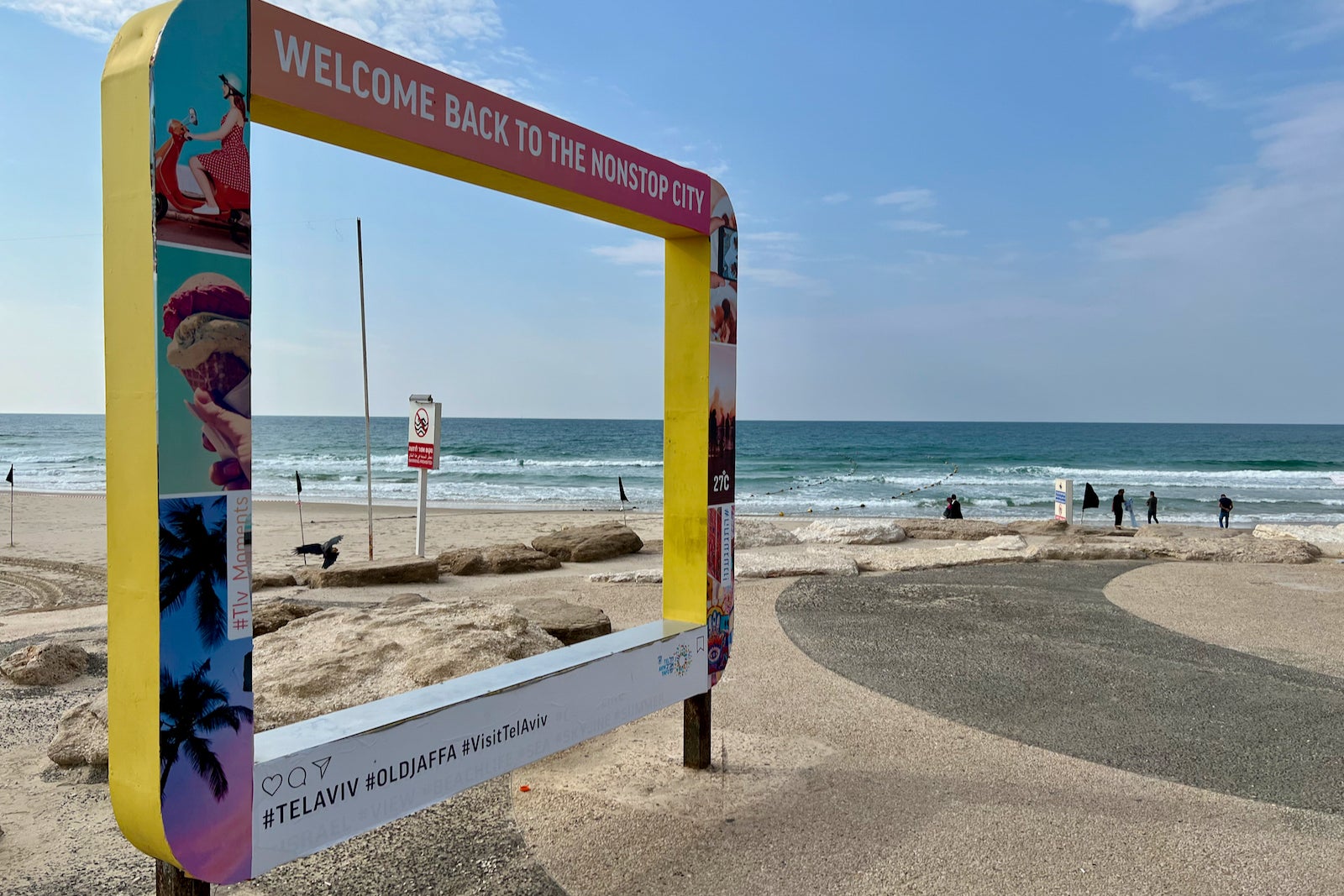
To be eligible for entry as a fully vaccinated tourist, you'll need to have received at least two doses of the vaccine (or one dose of the Johnson and Johnson vaccine). Additionally, at least 14 days must have elapsed from your most recent dose on the day of arrival in Israel. Finally — and this one is perhaps the most onerous — your most recent dose of the vaccine must have been given no more than 180 days before your day of departure from Israel.
For example, if you received your second shot on March 1, 2021, you are not eligible for entry to Israel (until you receive a booster dose). Similarly, if your second dose was on May 30, 2021, you're only eligible to visit Israel until Nov. 26, 2021, before needing a booster dose.
Those who've received a booster dose must wait at least 14 days from the date of the booster to land in Israel.
Related: Some countries are setting vaccine expiration dates for travel
Recovered from COVID-19 under Israeli law
To be considered recovered under Israeli law, you must present a certificate of recovery that's digitally verifiable by the Israel Ministry of Health, on the basis of a positive result on a NAAT test.
This applies to those who visit Israel anytime after 11 days have elapsed since their positive result, but no more than 190 days after the positive test, measured from the date of departure from Israel.
In addition to the recovery certificate, you'll also need to show proof of at least one dose of a WHO-approved vaccine, either before or after recovery.
Israel publishes a list of countries from which it accepts a digital certificate of recovery, and while much of the Europe is included on the list, the United Status is not. You can find the full list here .
Unless Israel changes its regulation, those who received a positive test in the U.S. will need to be fully vaccinated according to the conditions above in order to enter Israel.
A word of caution
Note that entry regulations can change at any time, so TPG recommends that you consult with the Israeli guidance for the most up-to-date information. The regulations above are accurate as of the date of publication and apply to individual tourists, not to group tours or those who've received special exemptions.
Finally, if you don't meet the above criteria, you can submit a petition to the Exceptions Committee with the details of your reason for travel.
Step 1. Pre-departure PCR test
In addition to being either fully vaccinated or recovered from COVID-19, there are some additional requirements before entering Israel.
The first is a PCR test taken within 72 hours of your scheduled departure for Israel. Only those who've received a negative result can board their flight. Note that if you're traveling on a connecting flight, the 72-hour timer applies from the departure time of the final leg of your journey.

Each traveler must present a negative test result (in English) that also specifies the traveler's passport number. Rapid tests and other at-home tests are not accepted.
The only published exceptions to the 72-hour rule are for those who've stayed outside of Israel for less than 72 hours, as well as those who have recovered from COVID-19.
For recovered travelers, you can instead present a positive PCR test result taken no more than three months before the day of departure and no less than 11 days after testing day. (Note that everyone, including recovered travelers, needs to take a mandatory PCR test on arrival in Israel, which you'll see below.)
Related: Here's where you can quickly get a COVID-19 PCR test for travel
Step 2. Entry declaration form
Within 48 hours before departure for Israel (based on the last connecting flight to the country, if applicable), you'll need to complete an online entry declaration form .
The form asks for your personal information, travel itinerary, health declaration, vaccination/recovery information and isolation information. Filling out the form should be self-explanatory, and I've included screenshots of the entire process below.
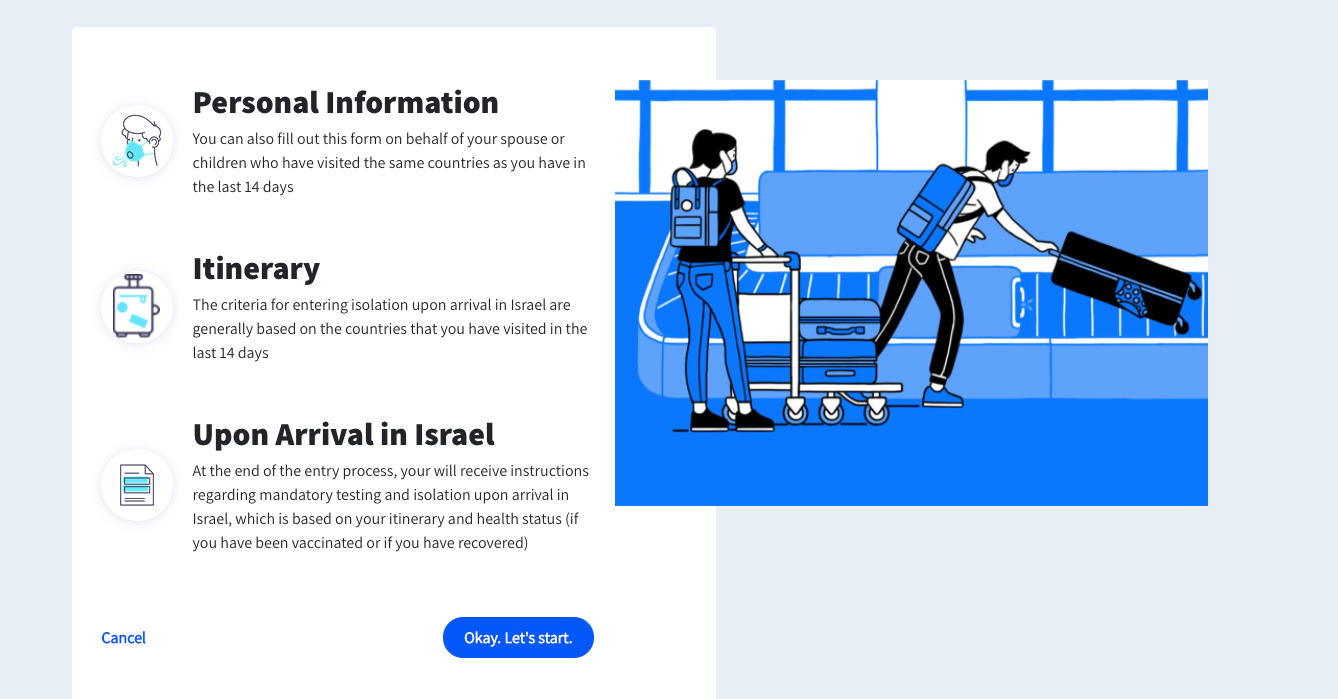
You can add your travel companions to your form, but you'll need to input their personal and health information, too.
Note that when you check "Vaccinated/Recovered outside Israel" on the form, you'll be asked to input your vaccine information (or a recovery letter), and then upload a digitally verifiable document.
If you were vaccinated in the U.S. with a certificate issued by the CDC, you should not upload a picture of your card. You should instead manually input your vaccination details, as I did below.
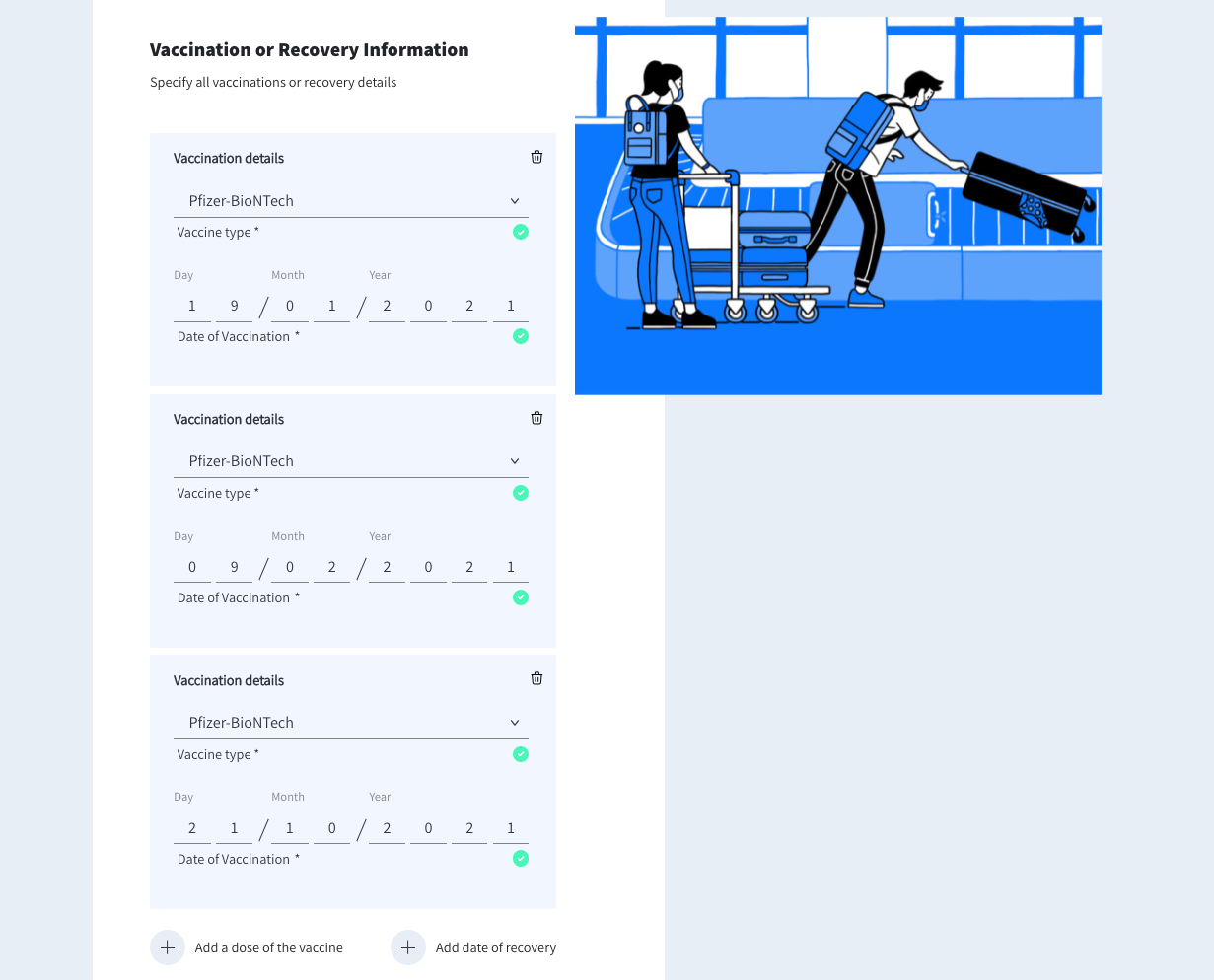
After completing the online form, you'll receive a confirmation email from [email protected], which will include a PDF version of the processed entry declaration form. You'll need to present this form (digital or hard copy) during check-in, and possibly again on arrival.
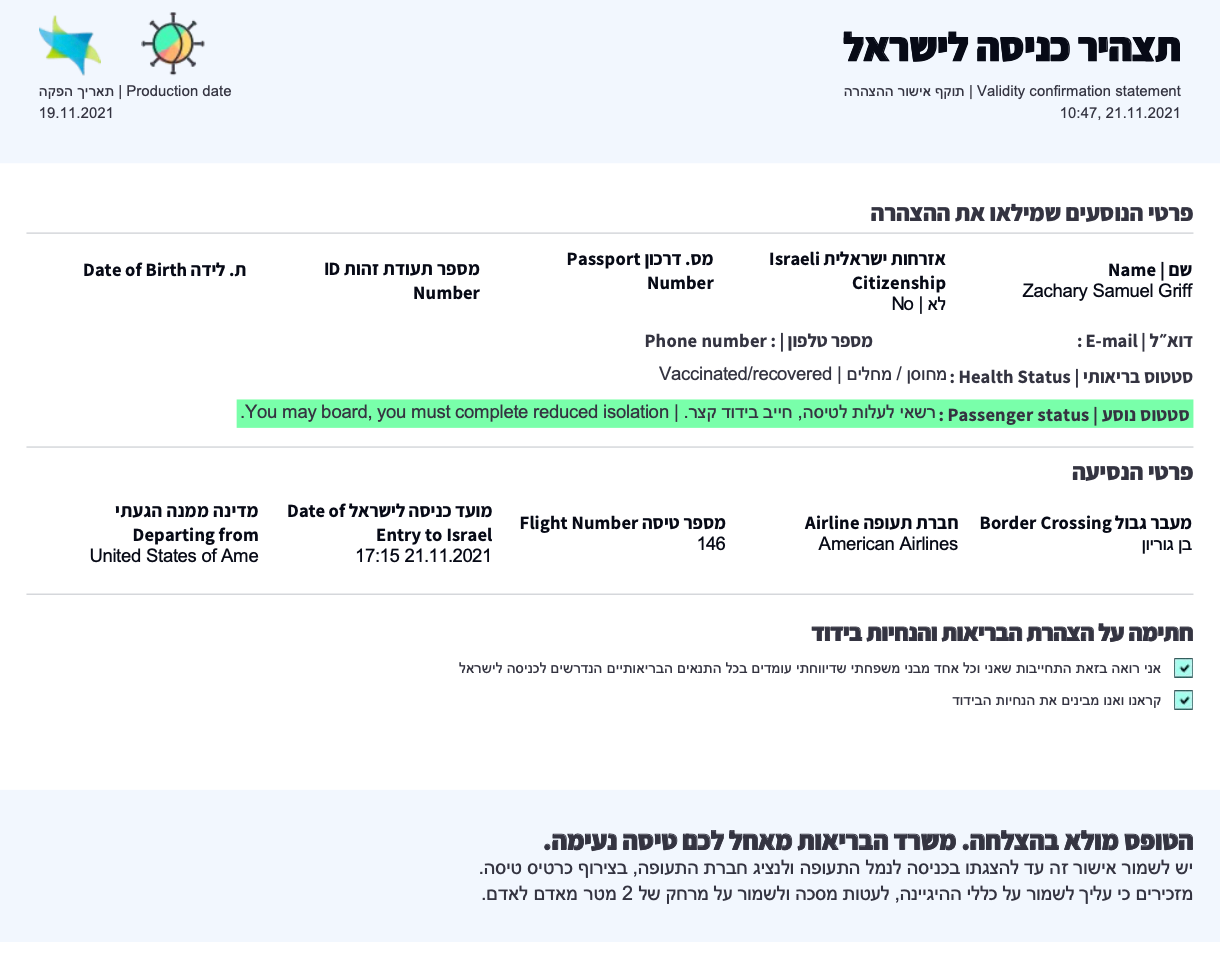
Assuming that you filled all the details correctly, your confirmation will have a green highlight stating that "you may board, you must complete reduced isolation."
In addition to the confirmation PDF, you should also receive a second PDF with a large QR code, titled tav yarok in Hebrew, which translates to "green pass." More on this below.
Step 3. On-arrival PCR test
The final requirement to enter Israel is a mandatory PCR test on arrival. This is a requirement for everyone of all ages, regardless of vaccination or recovery status. This test is in addition to the one you took in your country of origin before departure.
This test is conducted in Ben Gurion International Airport after clearing customs. You cannot physically leave the airport without completing this test.
After filling out the online entry declaration form, you'll be able to pre-pay for your on-arrival PCR test.

Prepaying costs 80 ILS ($26). Those who pay on arrival are charged 115 ILS ($37). I prepaid for my on-arrival PCR test and received an emailed payment confirmation code and barcode, which I presented upon arrival at the testing counter.
The test itself took less than three minutes, and you can read more about my entry experience in a follow-up story.
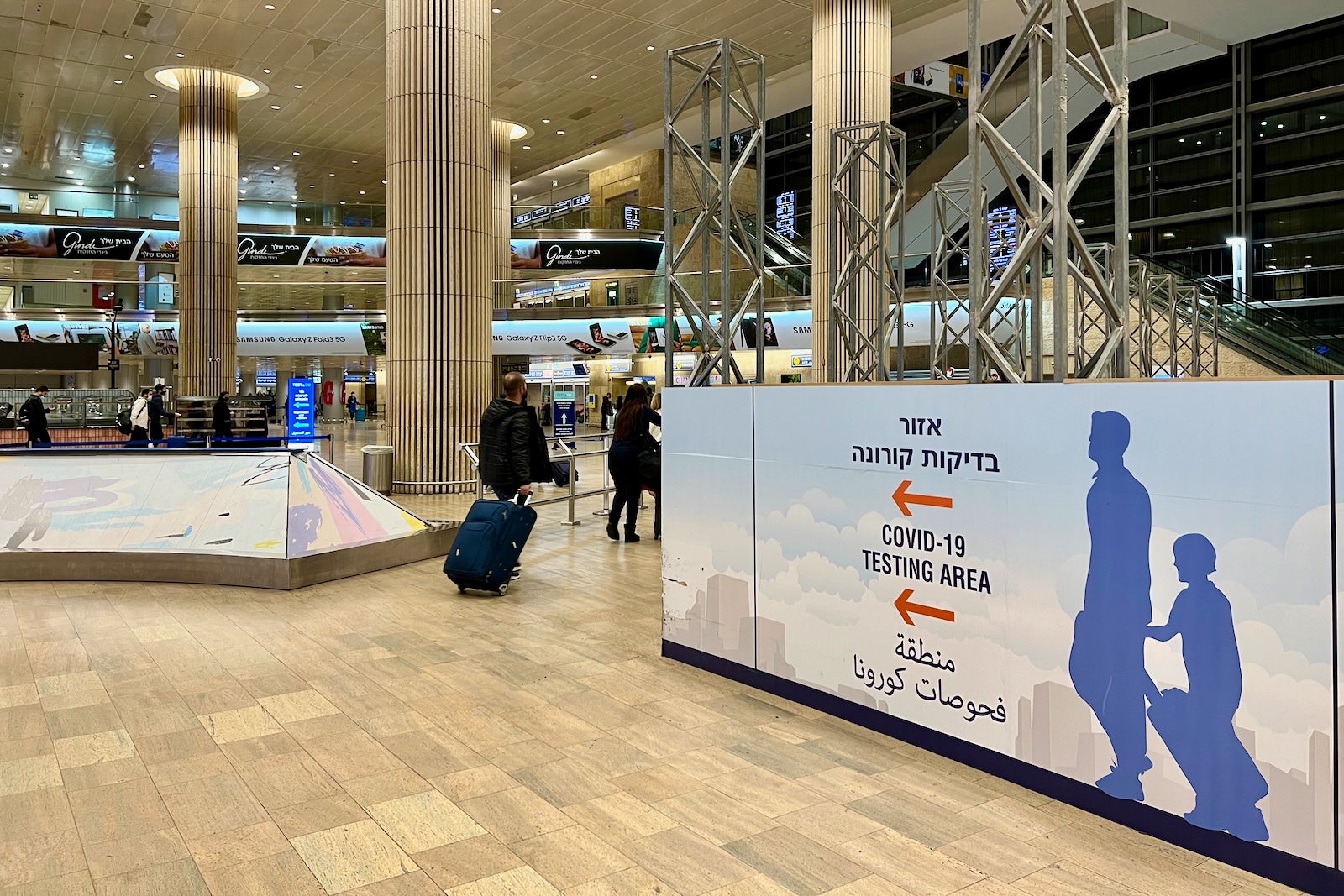
Those who've been vaccinated with the Sputnik-V vaccine must also take a serologic (antibody) test on arrival at Ben Gurion International Airport. This costs 126 ILS ($41) for those prepaying.
After completing the PCR test, you can then leave the airport and head to your final destination for a shortened isolation period. (Any method of transportation is acceptable, including public transportation.)
Step 4. 24-hour quarantine
All travelers arriving in Israel must go into isolation, but for those who've been vaccinated or recovered, the quarantine period is significantly reduced to (at most) 24 hours.
Once you arrive at your final destination in Israel, you'll need to immediately enter isolation until you receive a negative result from the PCR test taken on arrival in Israel, or up to 24 hours, whichever is earlier.
Additionally, those vaccinated with the Sputnik-V vaccine must also receive a positive result from the serologic test taken on arrival in order to exit isolation.
My test was conducted at 6:39 p.m. local time, and I received the (negative) result in my email the next morning at 6:18 a.m.
Step 5. Green Pass (Tav Yarok)
Israel limits all indoor activities to those who've been vaccinated, recovered or recently tested negative through the country's green pass tav yarok system.
To access the indoor space at restaurants, museums, gyms and any other cultural institutions or attractions, you'll need to present a valid green pass, along with a form of photo identification (a foreign passport will suffice).
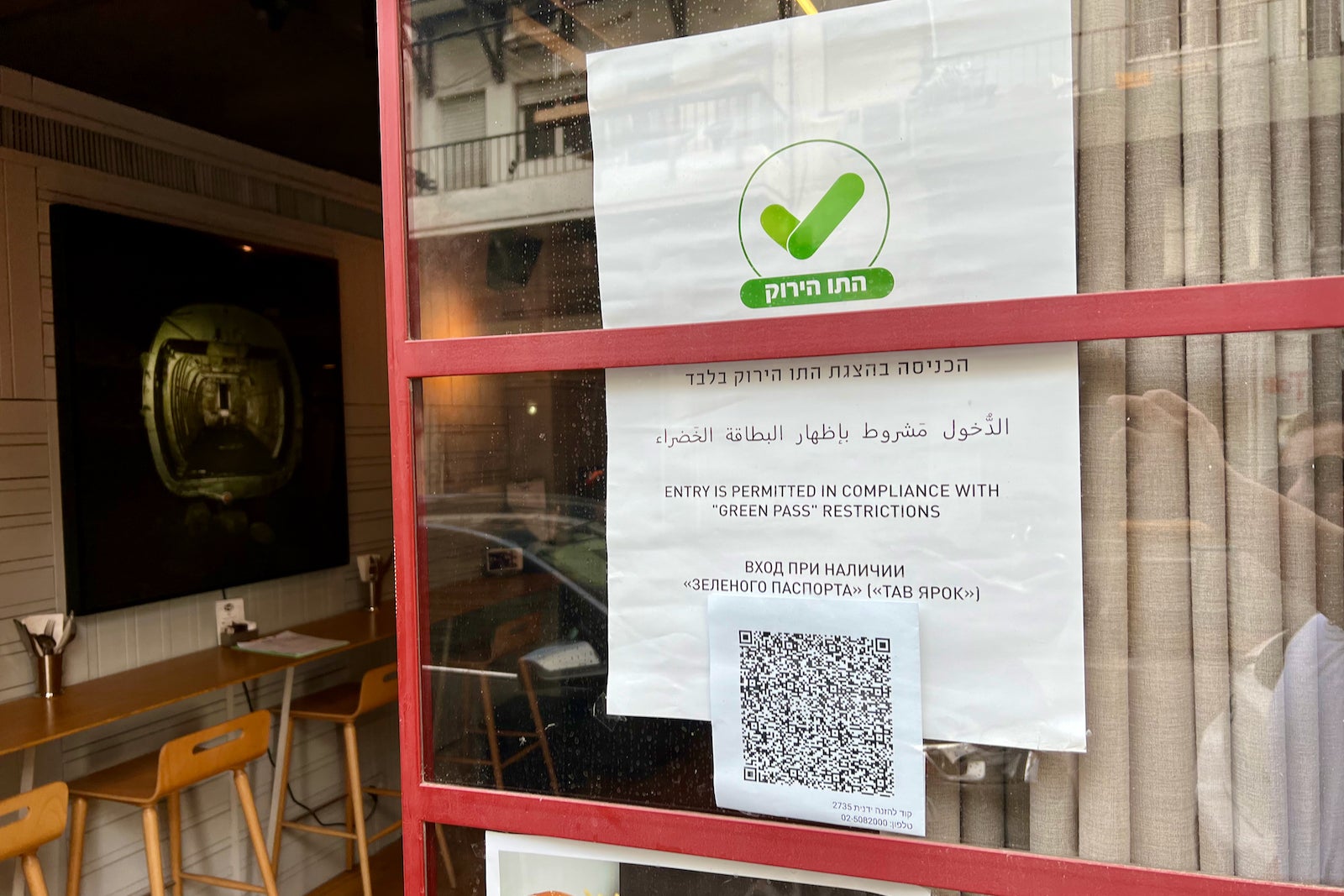
Tourists should receive a temporary green pass after filling out the online entry declaration form. The pass includes a large QR code, along with your passport number and validity period.
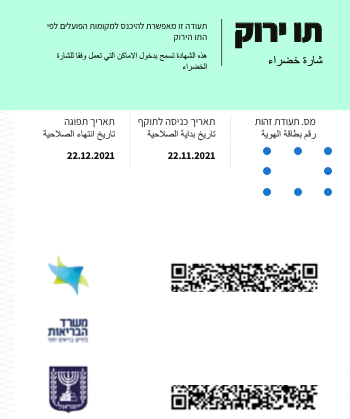
The green pass I received was valid for one month from one day after my flight arrival (due to the 24-hour isolation requirement).
It was checked at the entrance to my hotel in Tel Aviv and throughout my stay in Israel at most restaurants and museums.
Bottom line
Though Israel is officially open, it still has one of the strictest COVID-19 entry policies of the countries I've visited during the pandemic. Taking two tests, along with a one-day quarantine, isn't seamless.
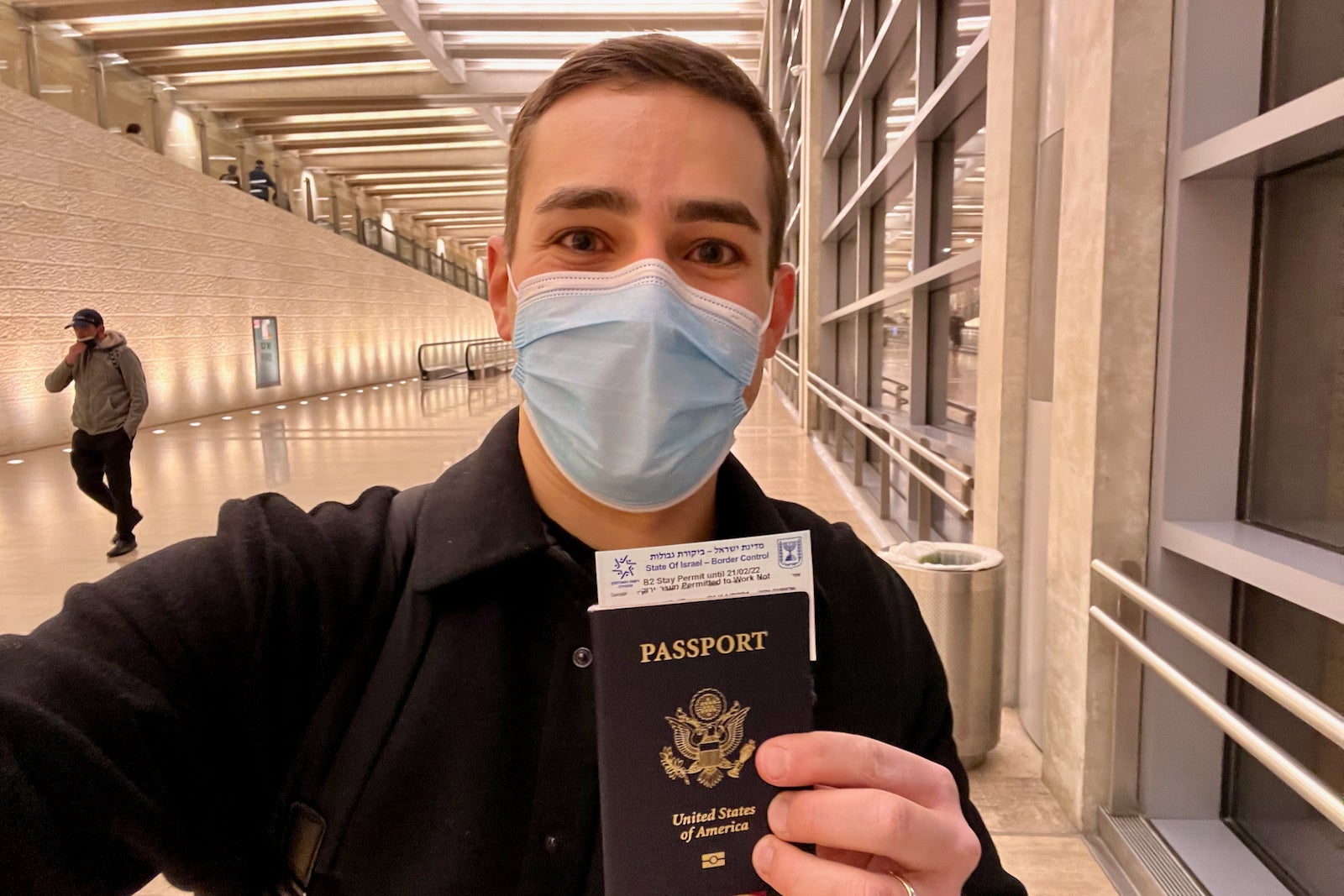
But, like me, if you've been waiting for almost two years to visit the country, Israel is once again ready to welcome you — though you'll have to jump through a few added hoops to get in.
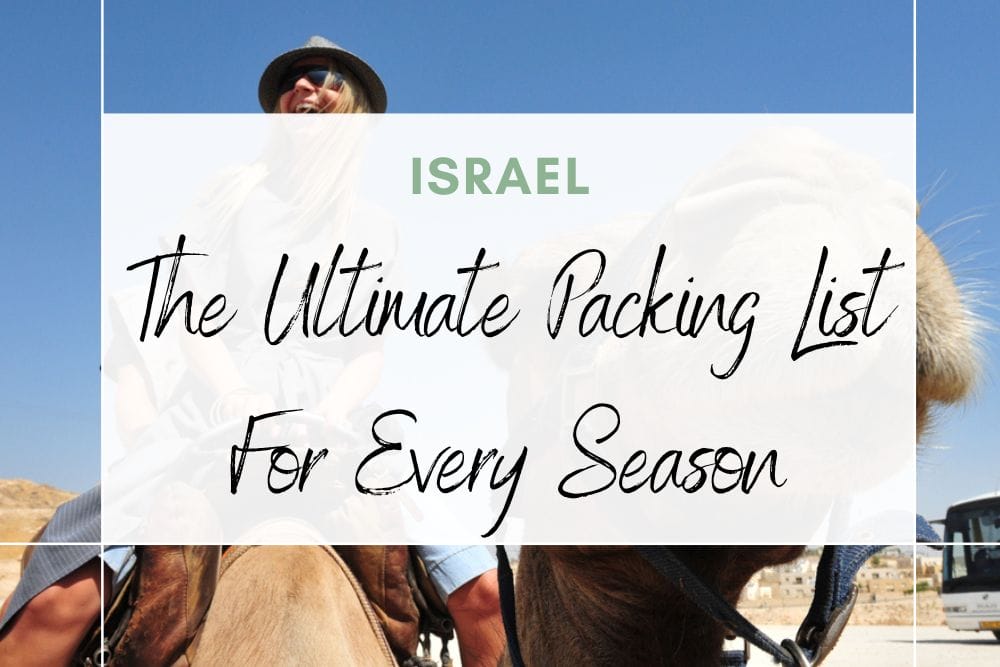
What to Pack for Israel: Ultimate Packing list for Savvy Travellers
Are you ready to embark on an extraordinary adventure to Israel? Look no further as we unveil the ultimate packing list for your journey. From must-have essentials to insider tips, this comprehensive guide will ensure you're well-prepared to explore the wonders of Israel in style. Get ready to pack like a pro and make the most of your unforgettable trip to the Land of Israel.
Travel essentials to pack all year round
- Travel Insurance : Don't forget to secure a reliable insurance plan before you jet off! be it lost luggage, unexpected health issues, or trip cancellations. Compare various insurance providers here .
- Your passport is your golden ticket to Israel, so double-check its expiry date to ensure it covers your entire stay. And don't forget to leave at least one page blank for those cherished new stamps!
- Keep your flight details, boarding passes, and airline tickets easily accessible – they're your invisible wings to navigate the skies.
- Ensure you have your hotel reservation specifics, including the address, handy. It's not only about finding your home away from home but also crucial for breezing through customs forms hassle-free.
- If you plan on an extended stay beyond 90 days in Israel, be aware that it typically requires a visa. It's wise to double-check your visa requirements before your flight.
- Have your hotel transfers pre-booked? Fantastic! Just ensure the details are easily accessible upon arrival.
- Let's talk finances! Remember to bring along cash and credit cards for spontaneous shopping sprees or relaxing visits to local spots in Israel.
- A travel eSIM card with data plan for your smartphone to stay connected.
- Last but not least, don't forget your other identification documents, such as your driver's license. You never know when they might come in handy!
In addition to the essentials, we've curated a collection of 14 indispensable items to enhance your Israeli adventure with comfort, safety, and joy. From practical necessities like a travel adapter and a reusable water bottle to delightful extras such as portable Wi-Fi and a neck pillow, our Ultimate Packing List for Israel covers it all. Dive into our checklist to ensure you have everything you need for an unforgettable trip!
The ultimate packing lists for Israel tailored for every season
Israel boasts two distinct seasons, each with its unique weather patterns. A cool and rainy winter prevails from October to April, while May to September brings a dry and hot summer. Pack lightweight and breathable clothing such as cotton tops, shorts, and skirts to prepare for both seasons. Essential layering items like cardigans, scarves, and lightweight jackets come in handy during cooler evenings. Don't forget to pack sunscreen, a hat to shield you from the sun, comfortable walking shoes, and swimwear to make the most of Israel's year-round warm climate and stunning beaches.
Summer packing list for Israel
Summer in Israel is a vibrant season filled with sunny days, stunning beaches, and cultural explorations. As you prepare for your adventure, pack essentials like lightweight and breathable clothing, such as cotton tops, shorts, and skirts, to stay cool in the warm climate. Don't forget to include sun protection items like sunscreen, a wide-brimmed hat, and sunglasses to shield yourself from the Middle Eastern sun while you enjoy the country's diverse landscapes and vibrant cities.
- Copies of important documents: Both digital and physical for safety.
- Data Plan : A travel eSIM card for your smartphone to stay connected.
- Lightweight Tops and T-Shirts: Pack a variety of lightweight, breathable tops and t-shirts in cotton or linen fabrics to stay cool and comfortable.
- Shorts and Skirts: Include a few pairs of shorts and skirts that are comfortable and appropriate for the warm weather. Opt for knee-length or slightly above knee-length options.
- Luggage lock : To keep your belongings secure while on the move.
- Lightweight Pants: Pack a pair of lightweight, loose-fitting pants or capris for days when you want more coverage or for cooler evenings.
- Sundresses: Bring a few sundresses that are airy and comfortable for exploring cities or relaxing on the beach.
- Travel Insurance : don't forget to secure a reliable insurance plan before you jet off to Germany! be it lost luggage, unexpected health issues, or trip cancellations. Compare various insurance providers here .
- Swimwear: Don't forget to pack your favorite swimsuit or bikini for enjoying Israel's beautiful beaches and taking a dip in the Mediterranean Sea.
- Light Layers: Include a lightweight cardigan or a shawl for cooler evenings or visits to air-conditioned indoor spaces.
- Comfortable Walking Shoes: Opt for comfortable, closed-toe walking shoes or sandals that are suitable for long walks and exploring various terrains.
- Sun Protection: Pack a wide-brimmed hat, sunglasses, and sunscreen to protect yourself from the strong Middle Eastern sun.
- Lightweight Towel: Consider packing a lightweight, quick-drying towel for beach visits or trips to the Dead Sea.
- Day Bag: Bring a small day bag or backpack to carry your essentials like a water bottle , sunscreen, and a camera while exploring.
- Travel Adapter : Don't forget to pack a travel adapter to charge your electronic devices and stay connected.
- Reusable water bottle : To keep hydrated during your summer explorations.
- Travel-sized toiletries: Don't forget bug spray for those summer evenings!
- First-aid kit: Always a good idea to have, with any necessary prescription medicines.
Related Articles
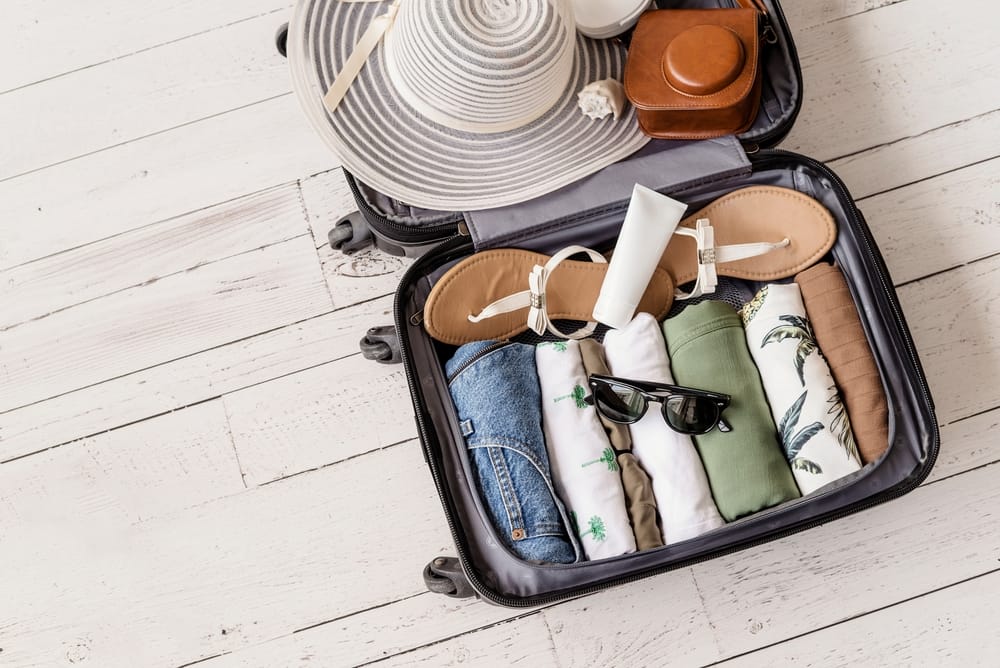
Winter packing list for Israel
Winter in Israel brings cooler temperatures and occasional rainfall, so when preparing your packing list, be sure to include essentials like a warm coat, sweaters, and long pants. Layering is key, so pack items that can be easily mixed and matched to adapt to changing weather conditions. Don't forget to bring a waterproof jacket, comfortable walking shoes, and accessories like a scarf, hat, and gloves to stay cozy and stylish during your winter adventures in Israel.
- Warm Coat or Jacket: Bring a warm and insulated coat or jacket to protect yourself from the cooler temperatures, especially in Jerusalem and the northern regions.
- Sweaters and Cardigans: Pack a variety of sweaters and cardigans to layer over your tops for added warmth. Opt for wool or cashmere blends for cozy comfort.
- Long Pants and Jeans: Include a few pairs of long pants and jeans for everyday wear. They will provide warmth and versatility for exploring the cities and attractions.
- Scarves, Hats, and Gloves: Don't forget to pack accessories like scarves, hats, and gloves to protect yourself from the cold. Choose items made from warm materials like wool or fleece.
- Boots or Sturdy Shoes: Opt for boots or sturdy shoes with good traction to navigate wet and potentially muddy streets during the occasional rainfall. Ensure they are comfortable for walking.
- Layering Tops: Pack long-sleeved shirts and lightweight thermal tops for layering. They will keep you warm during chilly mornings and evenings.
- Umbrella or Raincoat: Prepare for occasional rainfall by bringing an umbrella or a lightweight raincoat to stay dry during wet weather.
- Socks and Leggings: Pack warm socks and leggings to wear under your pants or with skirts and dresses for added insulation.
- Evening Wear: If you plan to attend formal events or dine at upscale restaurants, include some dressier outfits or cocktail dresses to suit the occasion.
- Travel Adapter : Don't forget to pack a travel adapter to charge your electronic devices and stay connected throughout your trip.
© Copyright 2019 | What To Wear On Vacation | All Rights Reserved
Guide to Planning a Trip to Israel
:max_bytes(150000):strip_icc():format(webp)/AGbw1-56a3c83f3df78cf7727f1f81.jpg)
TripSavvy / Taylor McIntyre
Planning a trip to Israel is just the start of an unforgettable visit to the Holy Land. This tiny country is one of the world's most exciting and diverse destinations. Before you go, you'll want to take a run-through of some useful resources and reminders, especially if you are a first-time traveler to Israel and the Middle East. Here is a summary of visa requirements, travel and safety tips, when to go, and more to help you with your planning.
Do You Need a Visa for Israel?
The U.S. State Department does not indicate that U.S. citizens traveling to Israel for stays of up to 90 days from their date of arrival need a visa, but like all visitors, you must hold a passport that is valid for at least six months from the date you are departing the country.
If you plan to visit Arab countries after visiting Israel, ask the customs official at the passport control window at the airport to not stamp your passport (they usually do not) as this could complicate your entry to those countries. If, however, the countries you are planning to visit after Israel are Egypt or Jordan, you need not be concerned about this.
For visitors making the journey chiefly for religious interest, any time of year is a good time to visit the country. Most visitors will want to take two things into consideration when planning their visit: the weather and holidays. Summers, generally considered to extend from April to October, can be very hot with humid conditions along the coast, whereas winter (November-March) brings cooler temperatures but also the possibility of rain.
Because Israel is the Jewish State, expect busy travel times around major Jewish holidays like Passover and Rosh Hashanah. The busiest months tend to be October and August, so if you're going to visit at either of these times make sure to start the planning and hotel reservation process well ahead of time.
Shabbat and Saturday Travel
In the Jewish religion Shabbat, or Saturday, is the holy day of the week and because Israel is the Jewish State, you can expect travel to be impacted by the country-wide observance of Shabbat. All public offices and most businesses are closed on Shabbat, which begins Friday afternoon and ends on Saturday evening.
In Tel Aviv, most restaurants remain open while trains and buses just about everywhere do not run, or if they do, it's on a very restricted schedule. This can complicate plans for day trips on Saturday unless you have a car. (Also note that El Al, Israel's national airline, does not operate flights on Saturdays or religious holidays). By contrast, Sunday is the start of the work week in Israel.
Israel enforces a smoking ban in most public places, so be sure to ask and seek out designated smoking areas if you must light up.
Keeping Kosher
While most of the larger hotels in Israel serve kosher food , there is no binding law and many restaurants in cities like Tel Aviv are not kosher. That said, kosher restaurants, which display a kashrut certificate granted to them by the local rabbinate, are generally easy to find by asking a hotel concierge or searching online.
Israel's location in the Middle East places it in a culturally fascinating part of the world. However, it is also true that few countries in the region have established diplomatic relations with Israel. Since its independence in 1948, Israel has fought six wars, and the Israeli-Palestinian conflict remains unresolved, meaning that regional instability is a fact of life. Travel to the Gaza Strip or West Bank requires prior clearance or required authorization; however, there is unrestricted access to the West Bank towns of Bethlehem and Jericho.
The risk of terrorism remains a threat both in America and abroad. However, because Israelis have had the misfortune of experiencing terrorism for a longer time than Americans, they have developed a culture of vigilance in security matters that is more entrenched than our own. You can expect to see full-time security guards stationed outside supermarkets, busy restaurants, banks, and shopping malls, and bag checks are the norm. It takes a few seconds away from the ordinary routine but is second-nature to Israelis and after just a few days it will be for you, too.
The U.S. State Department classifies a Level 2 Advisory for Israel, The West Bank, and Gaza. This means to exercise increased caution in Israel due to terrorism but does not warn against visiting . Some areas have increased risk.
The Travel Advisory warns citizens to not travel to Gaza due to terrorism, civil unrest, and armed conflict and to reconsider travel to the West Bank due to terrorism, potentially violent civil unrest, and the potential for armed conflict. It is important to check the Department of State website when making travel plans.
As always when traveling, it's a good idea to stay informed. A quality newspaper such as The New York Times or the English editions of popular Israeli dailies Haaretz and The Jerusalem Post are all good places to start in terms of timely and reliable information, both before and during your trip.
Where to Go in Israel
There is a lot to see and do in Israel, and deciding on a destination can seem a bit overwhelming. There are many sacred sites and secular attractions like Akko , so you'll want to refine your focus depending on how long your trip might be. Many travel to see the holy sites but others are headed to Israel to enjoy a beach vacation. The official tourism website of Israel has planning ideas .
Money Matters
The currency in Israel is the Israeli New Shekel (NIS). 1 shekel = 100 agorot (singular: agora) and banknotes are in denominations of NIS 200, 100, 50 and 20 shekels. Coins are in denominations of 10 shekels, 5 shekels, 2 shekels, 1 shekel, 50 agorot, and 10 agorot.
The most common ways of paying are by cash and credit card. There are ATMs all over in cities (Bank Leumi and Bank Hapoalim being the most prevalent) and some even give the option of dispensing cash in dollars and euros.
Speaking Hebrew
Most Israelis speak English, so you probably won't have any difficulties getting around. That said, knowing a little Hebrew can definitely be helpful. Here are a few Hebrew phrases that can be helpful for any traveler.
Israel: Yisrael Hello: Shalom Good: tov Yes: ken No: lo Please: bevakasha Thank you: toda Thank you very much: toda raba Fine: beseder OK: sababa Excuse me: slicha What time is it?: ma hasha'ah? I need help: ani tzarich ezra (m.) I need help: ani tzricha ezra (f.) Good morning: boker tov Good night: layla tov Good sabbath: shabat shalom Good luck/congratulations: mazel tov My name is: kor'im li What's the rush?: ma halachatz Bon appetit: betay'avon!
What to Pack
Pack lightly for Israel, and don't forget the sunglasses and sunscreen. From April through October it's going to be warm and bright, and even in the winter, about the only extra layer you'll need is a light sweater and a windbreaker. Israelis dress very casually; in fact, a famous Israeli politician was once teased for showing up to work one day wearing a tie.
If you are going to visit religious sites, women should pack a shawl or wrap. If you're visiting a religious site, such as a mosque, synagogue, church or the Wailing Wall, plan to cover yourself. Plan to cover your arms and legs which means avoiding Bermuda shorts or short skirts.
When passing through or visiting neighborhoods where extreme Orthodox Jewish communities reside, it is important to cover up and dress modestly. That may mean long skirts for women and long slacks for men as well as long-sleeved tops.
Having said all that, you'll want to pack a bathing suit for Israel as the weather is likely to be ideal for a swim.
Your Trip to Israel: The Complete Guide
The 19 Best Things to Do in Israel
The Best Time to Visit Israel
Driving in Israel
Is It Safe in Germany?
Top 10 Reasons to Visit Israel
The Top 25 Things to Do in Jerusalem
Is It Safe in Russia?
Tunisia Travel: Visas, Health, Transport, & More
Visa Requirements For Thailand
Is It Safe in Africa?
Top 15 Destinations in Israel
Kenya Travel: Visas, Health, Transport, & More
2020 Travel Warnings for Countries in Africa
Is It Safe in the Caribbean?
Vital Information for the First-Time Visitor to Thailand
Cookies on GOV.UK
We use some essential cookies to make this website work.
We’d like to set additional cookies to understand how you use GOV.UK, remember your settings and improve government services.
We also use cookies set by other sites to help us deliver content from their services.
You have accepted additional cookies. You can change your cookie settings at any time.
You have rejected additional cookies. You can change your cookie settings at any time.
- Passports, travel and living abroad
- Travel abroad
- Foreign travel advice
Entry requirements
This travel advice covers Israel and the Occupied Palestinian Territories (OPTs).
This information is for people travelling on a full ‘British citizen’ passport from the UK who choose to travel despite FCDO advice. It is based on the UK government’s understanding of the current rules for the most common types of travel.
The authorities in Israel and the OPTs set and enforce entry rules. If you’re not sure how these requirements apply to you, contact the Israeli Embassy in London or the Palestinian Mission to the UK .
Check Israeli immigration policies before you travel. Allow extra time for increased security measures and checks at airports, especially during Israeli holidays and during the summer tourist season.
COVID-19 rules
There are no COVID-19 testing or vaccination requirements for travellers entering Israel or the OPTs .
Visa requirements
You do not need a visa to enter Israel as a tourist. On entry, visitors are given permission to stay for up to 3 months. However, if you are a dual national, read the dual nationals guidance for more information.
If you work in Israel without the proper permissions, you can be detained and deported. This process could take several months.
Passport validity requirements
If you’re visiting Israel or the OPTs , your passport must be valid for at least 6 months from the date you enter the country (check the expiry date).
Check with your travel provider that your passport and other travel documents meet requirements. Renew your passport if you need to.
You will be denied entry if you do not have a valid travel document or try to use a passport that has been reported lost or stolen.
Checks at border control
Passport stamping and entry cards.
Visitors entering via Tel Aviv Ben Gurion Airport get an entry card instead of an entry stamp in their passport. At other entry points to the country, you may get an entry card or you may get a stamp.
Keep your entry card with your passport until you leave. This is evidence that you entered Israel legally. You may need it, particularly if you’re crossing into the OPTs . If you’re refused entry to Israel, your passport may be stamped with an entry stamp and 2 red lines drawn across it to show the refusal.
Stamps with restrictions
Entry stamps that state ‘Palestinian Authority only’ or ‘Judea and Samaria only’ have been issued to some travellers at:
- the Allenby Bridge crossing with Jordan
- Tel Aviv Ben Gurion Airport
Since travellers entering by the Allenby Bridge crossing must pass through Israeli checkpoints and Israeli-controlled territory to reach Jerusalem or Gaza, this effectively limits travellers who receive this stamp.
It is not clear how travellers who get this stamp at Tel Aviv Ben Gurion Airport can leave the airport without violating the restriction.
This stamp has been issued to travellers who have no Palestinian or other Arab ancestry, and do not seem to have a claim to a Palestinian Authority ID.
Immigration checks
The Israeli authorities decide if you can enter Israel. You may experience lengthy personal questioning and baggage searches at security when you enter and leave Israel. Searches and questioning may be longer for some visitors, including:
- visitors with Palestinian or Arab ancestry
- visitors with evidence of previous travel which may be considered suspicious
- visitors who are considered to have publicly criticised the state of Israel
Foreign nationals can legally be refused entry if they:
- have publicly called for a boycott of Israel or Israeli settlements
- belong to an organisation which has called for a boycott
Travellers may occasionally be held at border control for more checks. This is not routine, but a few travellers do experience delays, sometimes for several hours. Israeli security have sometimes requested access to travellers’ personal email or social media accounts as a condition of entry.
Previous travel to countries in the region
Evidence of previous travel to another country in the region, such as entry or exit stamps in your passport, does not normally stop you entering Israel. However, you may face extra questioning at the border.
If you have concerns about visas or entry into Israel, including whether previous travel can affect you travelling there, contact the Israeli Embassy in the UK before you travel.
Refusal of entry into Israel
If you’re refused entry to Israel, you will be booked on the next available flight back to where you flew in from, on the same airline.
Depending on the flight schedule, you may be taken to the Immigration Detention Centre (a few minutes’ drive from the airport) to wait until your flight departs. You will have access to a telephone, information in English and medical assistance if needed. Your luggage will stay at the airport, so tell officials if you need to retrieve anything urgent from your luggage, for example medication.
You can contact the British Embassy in Israel from the detention centre. They can help where possible, but cannot intervene in immigration decisions.
Entering the OPTs
Entry to the OPTs , including by sea to Gaza, is controlled by the Israeli authorities. You must show a passport and Israeli immigration slip to cross between Israel and the OPTs .
There are requirements for foreign nationals entering the West Bank. Read about the requirements for entering the West Bank on the Israel government website .
Israeli border officials at Tel Aviv Ben Gurion Airport have asked some travellers to sign a form stating they are not allowed to enter territories controlled by the Palestinian Authority unless they get advance authorisation from the Israeli ‘Territory Actions Co-ordinator’. You can be deported from Israel and barred from entry for up to 10 years for violating this restriction.
If immigration officials believe you plan to enter Gaza without permission, or that you’re entering Israel to work in the OPTs , you may be refused entry.
FCDO cannot support individuals applying for entry or exit permits for Gaza. If you decide to visit Gaza against FCDO advice, you must contact the relevant authorities well in advance. FCDO cannot provide administrative support to UK charities wishing to enter Gaza by the Rafah crossing.
The Rafah border regularly closes with no warning and for long periods. The Erez border is currently closed. At these times it may be impossible to enter or leave Gaza.
Israeli checkpoints may close on Israeli public holidays and during periods of increased instability. There is information on known checkpoint closures on the UN website . This can change at short notice.
British nationals of Palestinian origin
If you’re a British national of Palestinian origin (on the Palestinian Population Register or holding a Palestinian ID number), you need a Palestinian passport or travel document to leave Gaza or the West Bank.
If you’re a British national with a Palestinian name or place of birth but without a Palestinian ID number, you may face problems. British nationals of Palestinian origin or British nationals married to Palestinians have been refused entry into Israel.
British people holding dual nationality
British-Palestinian dual nationals living in the West Bank and Gaza may only exit the OPTs via the Allenby border crossing into Jordan or the Rafah border crossing into Egypt, and must return by the same route. If you’re a British-Palestinian dual national entering Gaza against FCDO travel advice, check entry and exit procedures with the relevant authorities. There is a limit on the number of dual nationals permitted to enter and exit Gaza through Erez – this includes if you are entering for medical or humanitarian reasons. The Israeli government has the authority to make decisions on entry and exit permits through Erez.
If you’re a British national with dual nationality, check with your nearest Israeli embassy if you need pre-approval to travel to Israel. Dual nationals holding Iranian, Iraqi, Syrian and Lebanese citizenship have previously been impacted. If you are not a citizen of any of these countries, but have close family ties, it is also advisable to check with your nearest Israeli embassy before travel.
Children with at least one Israeli parent (father or mother) are considered Israeli nationals. These children must enter and leave Israel on an Israeli passport.
British nationals with associations with other countries in the region
Dual nationals holding Iranian, Iraqi, Syrian and Lebanese citizenship have previously been heavily questioned, denied entry and deported. If a deportation flight is not available immediately, this can mean being detained until one is available, which can take a number of days. If you are a citizen of any of these countries, or have associations such as close family ties, the Israeli authorities advise you to check with your nearest Israeli embassy before travel to gain pre-approval for entry.
Children and young people
Children aged 17 years and under travelling to Israel alone or with only one parent should carry a letter from their parents or guardians confirming parental consent, accommodation plans and contact details.
Children exiting Israel alone should carry a locally issued notarised letter as advised by external firms .
For children with at least one Israeli parent, read the advice for dual nationals above.
Entry to Jordan
To enter Jordan from Israel, you must register in advance. Find more information on the Visit Jordan website .
Vaccination requirements
At least 8 weeks before your trip, check the vaccinations and certificates you need in TravelHealthPro’s Israel guide and TravelHealthPro’s Palestinian Territories guide .
Customs rules
There are strict rules about goods you can take into or out of Israel and the OPTs . You must declare anything that may be prohibited or subject to tax or duty.
Taking money into Israel and the OPTs
The Israeli Tax Authority provides information on taking money into or out of Israel .
Related content
Is this page useful.
- Yes this page is useful
- No this page is not useful
Help us improve GOV.UK
Don’t include personal or financial information like your National Insurance number or credit card details.
To help us improve GOV.UK, we’d like to know more about your visit today. We’ll send you a link to a feedback form. It will take only 2 minutes to fill in. Don’t worry we won’t send you spam or share your email address with anyone.

To learn more about the guidelines about travel to Israel - click here

All the information you need to know before traveling to Israel
Dear friends.
Out of an abundance of caution over the new Omicron variant of the COVID-19 virus, as of November 28th, 2021, Israel has closed its borders to all tourists until December 13th, 2021. Only citizens of Israel and specific visa holders are allowed entry to Israel. If you had a trip scheduled during that time, even if you or your group had been granted a permit, you are no longer allowed to go as a tourist regardless of your circumstances.
During this two week stop, the Ministries of Health and Tourism will work tirelessly to evaluate the current situation judiciously and make policies that reflect the best course forward given all available data.
For the most up-to-date information on tourist entry requirements, please go to the Israel Ministry of Health's Covid-19 website : corona.health.gov.il .
SITES TO SIGNIFICANCE
Itineraries.
- LATEST INFORMATION AND UPDATES
- ISRAEL GOVERNMENT TOURISM OFFICES
- ISRAEL IN THE MEDIA
- STATISTICS AND RESEARCH

Photographers: Guy Yehieli, Adam Primer, Kfir Boltin, Linnea Andres, Kfir Sivan, Haim Yafim, Dana Fridlander, refael Ben Ari, Itamar Greenberg, Moshik Lindbaum, Ori Ackerman Video Credits: Israeli food channel, National Geographic
- OFFICIAL BROCHURE
- TERMS OF USE
- PRIVACY POLICY
FOR MORE DEALS:
- travex Select
- israel insider
Israel Revealed
Customized travel. authentic experiences. inspiring discoveries. connect to the land, people and culture of israel..
TRAVEX creates exciting tailored journeys that capture the energy and spirit of Israel. Using our diverse expertise, we craft bespoke experiences that engage and inspire, exceeding all expectations.
Exploring Israel is the trip of a lifetime. A fascinating destination with pursuits to fit every desire. Ancient ruins. Diverse people. Sandy beaches. Gourmet cuisine. Sacred holy sites. Dramatic landscapes. Engaging encounters.
There is a bit of Israel in all of us. We invite you to explore the Israel in you.
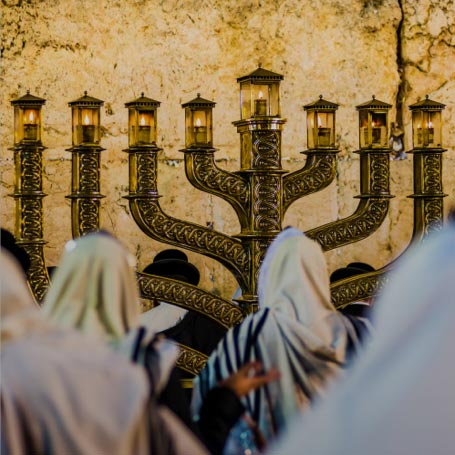
CONNECTING TO YOUR ROOTS
Jewish heritage.

HOLY SITES – SACRED SPACES
Christian pilgrimage.

TEMPTING YOUR SENSES
Food & wine.

JUST ACROSS THE BORDER. ENCHANTMENT.
Jordan & petra.

CREATING FAMILY MEMORIES
Bar & bat mitzvah.
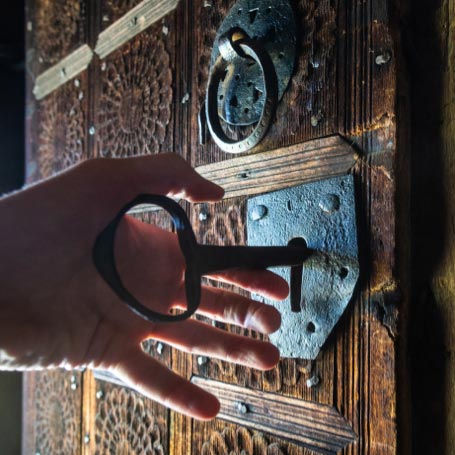
OPENING HIDDEN DOORS
Insider access.

BETTER TOGETHER
Family adventure.
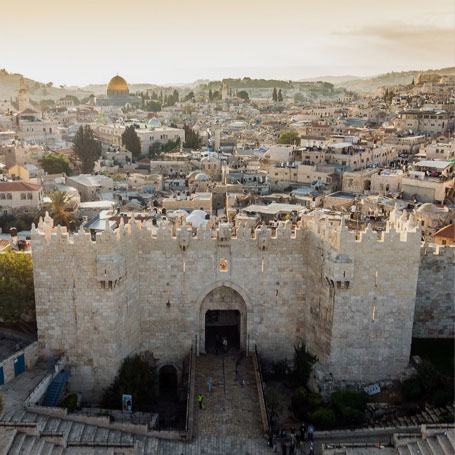
PREMIUM DESTINATION DISCOVERIES
Shore excursions.

LUXURY AMENITIES AT EVERY TURN
Concierge services.
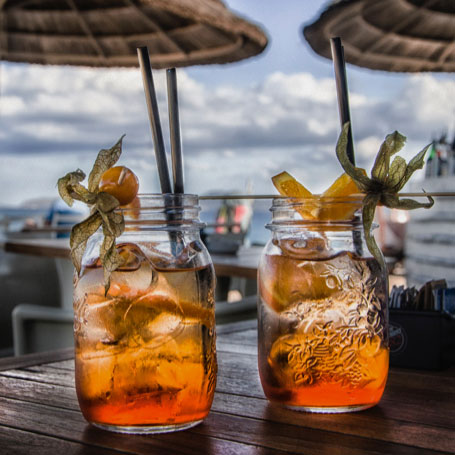
ISRAEL. UP CLOSE AND PERSONAL

NEW. DIFFERENT. EXCITING
Creative & cool.

CLASSICAL MEETS CONTEMPORARY
History & art, ultimate happenings, events & incentive travel.


Search Smartraveller

Israel and the Occupied Palestinian Territories
Latest update.
Reconsider your need to travel to Israel and the Occupied Palestinian Territories overall due to the volatile security situation, including the threat of terrorism, armed conflict and civil unrest.
Higher levels apply in some areas.
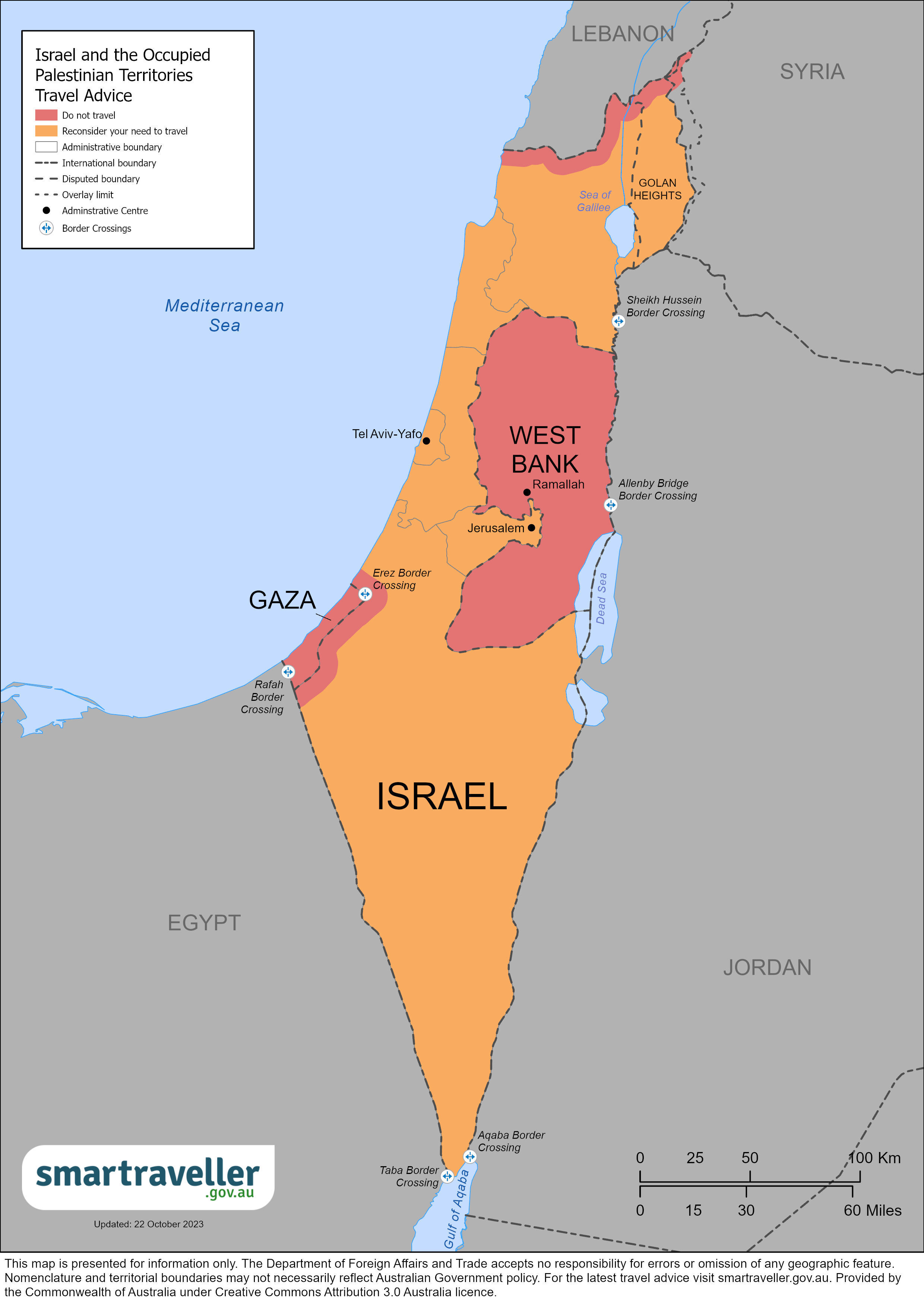
Israel and the Occupied Palestinian Territories (PDF 596.05 KB)
The Middle East (PDF 1.45 MB)
Local emergency contacts
Fire and rescue services, medical emergencies.
For criminal issues, call 100.
Advice levels
Reconsider your need to travel to Israel and the Occupied Palestinian Territories overall.
Reconsider your need to travel to Israel and the Occupied Palestinian Territories overall due to the volatile security situation, including the threat of terrorism, armed conflict and civil unrest.
See Safety .
Do not travel to Gaza and areas near the border with Gaza.
Do not travel to Gaza and areas near the border with Gaza due to armed conflict.
Do not travel to border areas with Lebanon.
Do not travel to border areas with Lebanon closed by Israeli authorities.
Do not travel to the West Bank (excluding East Jerusalem).
Do not travel to the West Bank (excluding East Jerusalem) due to the volatile security situation.
- Israel has a naval blockade in place along the coast of Gaza. Don't join others seeking to break the blockade. Previous attempts to break the blockade have resulted in death, injury, arrest or deportation of foreigners (see 'Full advice').
- Our overall travel advice level for Israel and the Occupied Palestinian Territories remains at reconsider your need to travel, with higher levels applied to some areas. You should also consider whether you need to remain in country, and if not, depart when its safe to do so.
- Do not travel to Gaza, border areas with Gaza, border areas with Lebanon closed by Israeli authorities and the West Bank (excluding East Jerusalem), due to the volatile security situation.
- There’s a high threat of military reprisals and terrorist attacks against Israel and Israeli interests across the region. Military attacks may result in airspace closures, flight cancellations and diversions and other travel disruptions. Tel Aviv's Ben Gurion International Airport may pause operations due to heightened security concerns at any time. Australians who want to leave are encouraged to take the first available option.
- Land border crossings to Jordan are open but may close at short notice.
- In an attack or other armed conflict, you should follow the advice of local authorities. See our general advice on protecting your safety: There’s an armed conflict , and monitor local media and public safety information updates through the National Emergency Portal (accessible in Israel only).
- If you're an Australian citizen or permanent resident in Israel or the Occupied Palestinian Territories you can register on DFAT's registration portal . Keep your registration details up to date so we can contact you with important updates.
- Since 7 October, Israeli Defense Forces have been conducting major operations, including in and around Gaza and areas near the northern border with Lebanon.
- Israel is a target for terrorism, rocket fire and military confrontation. Terrorist attacks could happen at any time or anywhere. Always be alert. Have an exit plan. There are tensions and security risks close to Israel's borders with Lebanon, Syria and Egypt. There are ongoing threats of rocket attacks and military activity. Authorities are monitoring security on Israel’s northern border.
- Security in the West Bank is unpredictable. This includes Nablus, Jenin, Bethlehem, Hebron, Jericho and Ramallah. Tensions are high. Violence occurs. Take care around West Bank checkpoints. If you're in the West Bank during military action or civil unrest, stay in a safe place indoors and away from windows. Take care when visiting the Old City in Jerusalem. Transportation and other services could be affected. Be alert to your surroundings and have an exit plan. Monitor media for the latest updates.
- Our ability to provide consular help in Gaza is extremely limited. If you're in Gaza, be aware of your surroundings and review your personal security plans. Monitor local media (including social media), UN alerts, and your own organisation's security contacts for information about changing security conditions and alerts to seek shelter. If it's possible to leave, carefully consider the safest means.
The Rafah crossing between Gaza and Egypt may be closed or have highly restricted access for long periods and is subject to change at short notice. It has been subject to air strikes during the current Gaza conflict.
Full travel advice: Safety
- Infectious diseases are a risk. Drink boiled or bottled water.
- West Nile virus can occur. There's no vaccine to prevent it. Use insect repellent. Make sure your accommodation is insect-proof.
- The standard of medical facilities in Israel is reasonable. Facilities in the West Bank and Gaza are limited and if you become seriously ill or injured, you may need to seek evacuation. Make sure your travel insurance covers this.
Full travel advice: Health
- The Sabbath in Israel happens from sunset Friday until sunset Saturday. In Orthodox neighbourhoods, driving or using a mobile phone or digital camera on the Sabbath may offend people.
- Don't use or carry illegal drugs. Penalties are severe.
- You must always carry originals or copies of your passport, visa or entry permit in the Occupied Palestinian Territories.
- Palestinian law has the death penalty for some crimes including treason, helping an enemy and murder.
- Gaza has Islamic law. Drinking alcohol and homosexual acts are illegal. Take care not to offend in Gaza and the West Bank. Avoid public displays of affection. Dress conservatively.
Full travel advice: Local laws
- Tel Aviv's Ben Gurion International Airport remains open and commercial flights are available. The airport may pause operations due to heightened security concerns. This may cause flight delays or cancellations. Check with your airline for the latest updates before travelling.
- Land border crossings to Jordan are open but may close at short notice. See Full advice: Travel for more information on border crossings into Jordan. Check Israeli government websites, and the website of the country of planned travel to make sure border crossings are open before travel.
- The Rafah crossing between Gaza and Egypt may be closed or have highly restricted access for long periods and is subject to change at short notice. It has been subject to attacks, including air strikes, during the current Gaza conflict.
- By law, you're considered Israeli if one or both of your parents are Israeli. Israeli citizens must enter and leave on an Israeli passport. Authorities will consider you a Palestinian national if you currently hold, or used to hold, a Palestinian ID card. You may need to get a Palestinian travel document.
Full travel advice: Travel
Local contacts
- The Consular Services Charter details what we can and can't do to help you overseas.
- For consular help, contact the Australian Embassy in Tel Aviv or the Australian Representative Office in Ramallah .
- To stay up to date with local information, follow the Embassy's social media accounts.
Full travel advice: Local contacts
Full advice
Crisis registration.
If you're an Australian citizen or permanent resident in Israel or the Occupied Palestinian Territories, you can register on DFAT's registration portal . We'll be contacting registered Australians directly with important updates.
Keep your registration details up to date so we can contact you. If you registered by phone or e-mail, you'll need to update your details via those channels.
You should only register if you’re in Israel or the Occupied Palestinian Territories and are:
- an Australian citizen, or
- an Australian permanent resident, or
- an immediate family member of an Australian citizen or permanent resident
CLICK HERE TO REGISTER
Security situation
Waters off gaza.
Israel has a naval blockade in place. The Israeli Navy patrols territorial waters and the shared water border zone.
We advise Australians to reconsider participating in any humanitarian flotilla to deliver aid to Gaza. Don't join others seeking to break the naval blockade.
People have previously tried to break the naval blockade along the coast of Gaza. Their actions caused injury, death, arrest and deportation of foreigners, including Australians.
Overall security situation
We continue to advise reconsider your need to travel to Israel and the Occupied Palestinian Territories overall due to the volatile security situation, including the threat of terrorism, armed conflict and civil unrest. Rockets have been fired at Israel from Gaza, Lebanon and Syria. There have also been other terror attacks on civilians. The Israeli government has declared a state of emergency across the whole country. Avoid all non-essential travel and reconsider your need to remain in the area.
We continue to advise do not travel to Gaza, border areas with Gaza and border areas with Lebanon closed by Israeli authorities.
We also advise do not travel to the West Bank (excluding East Jerusalem) due to the volatile security situation.
Military attacks may result in airspace closures, flight cancellations and diversions and other travel disruptions. Tel Aviv's Ben Gurion International Airport may pause operations due to heightened security concerns at any time, and at short notice. This may cause flight delays or cancellations. Check with your airline for the latest updates before travelling.
If you choose not to leave or can't safely leave, be prepared for an extended stay. Ensure you maintain enough supplies including food, drinking water and medication. If you're planning to stay in Israel or the Occupied Palestinian Territories, follow alerts to seek shelter. Monitor local media and public safety information updates through the National Emergency Portal (accessible in Israel only).
If you need emergency consular assistance, contact the Australian Government's Consular Emergency Centre on +61 2 6261 3305 (if you're overseas) or 1300 555 135 (in Australia). Our ability to provide consular assistance in Gaza is limited.
Gaza unrest
Gaza is an active conflict zone and is extremely dangerous. There are ongoing Israeli air strikes and land based IDF operations as well as a threat of civil unrest, shooting and rocket attacks. Rockets can land in both Gaza and Israel.
Our ability to provide consular assistance in Gaza is extremely limited. If you're in Gaza, be aware of your surroundings and review your personal security plans. Monitor local media (including social media), UN alerts, and your own organisation's security contacts for information about changing security conditions and alerts to seek shelter.
If you're stuck in military action or civil unrest, stay in a safe place indoors. Monitor the media for updates.
Ordinarily, the Australian Government can't support individuals applying for entry or exit permits for Gaza. During the current crisis, our ability to support Australians and their families to leave is extremely limited.
Military operations
During military operations, the Israeli Defense Forces (IDF) may declare an area a closed military zone.
If authorities find civilians in this zone, they can arrest, detain or deport them.
In Israel, local city government websites have lists of public bomb shelters and other emergency information.
The IDF Home Front Command is responsible for managing emergencies, including planning and advising on how to deal with rocket attacks. In an emergency contact the Home Front Command on 104 (the hotline has English-speaking operators, option 5). Authorities may also establish a National Emergency Portal website for specific events.
We advise do not travel to the West Bank (excluding East Jerusalem) due to the volatile security situation.
The security situation in the West Bank is unpredictable, with continuing tensions and violence between Israelis and Palestinians. This includes tourist destinations such as Bethlehem, Jericho and Ramallah. There can be higher rates of violence in and around Hebron, Jenin and Nablus.
Stone-throwing and violence are common, especially around Israeli settlements and military checkpoints.
Tensions can arise at short notice. Violence can happen in tourist areas.
Don’t enter closed military zones, even where these have been in place for a long time, such as the old city of Hebron.
Large and sometimes violent demonstrations have occurred in the West Bank. Foreigners have been injured.
Israeli authorities may open temporary additional checkpoints in the West Bank or close crossings to the West Bank on local holidays or due to security incidents.
Israeli security/military operations occur in the West Bank. There has been an increase in Israeli security operations since March 2022, including intensive operations in refugee camps. If you’re in the West Bank during military action or civil unrest, stay in a safe place indoors, away from windows. Monitor the media for information.
Authorities impose strict security measures after terrorist attacks. These may severely affect the movement of Palestinians, including Australian dual nationals.
Israel's borders with neighbouring states
Cross-border political tensions and unrest create security risks for regions of Israel close to its borders with Egypt, Lebanon and Syria.
Israel and Lebanon border
We advise do not travel to border areas with Lebanon. These have been closed by Israeli authorities. Authorities are monitoring security on Israel’s northern border. Some residents have been advised to evacuate by local authorities.
There’s an ongoing threat of rocket attack, infiltration attempts, revenge fire and other activity along the border between Israel and Lebanon. This area is known as the ‘Blue Line’.
There’s a significant military presence in the area. The security situation could get worse without notice.
Tensions remain high between Hezbollah and Israel, with occasional exchanges of fire on the border between Lebanon and Israel. More conflict is possible, including missiles fired towards Israeli territory. An escalation in conflict between Israel and Hezbollah would significantly increase risks to your safety and security.
More information:
- Travel advice for Lebanon
Israel and Egypt border
There have been security incidents in the southern city of Eilat and the surrounding area near the Gulf of Aqaba. This includes the border crossing with Egypt near Eilat. There have been deaths and injuries.
- Travel advice for Egypt
Israel and Syria border
There’s been ongoing conflict on the Syrian side of the border since 2014. Clashes have occurred on the Israeli-Syrian border. This includes rockets being fired towards Israeli-controlled territory. Kidnapping has been known to happen near the border.
Parts of Route 98 have been closed in the past due to fighting on the Syrian side of the border. Artillery and small-arms fire from Syria could land in the Israeli-controlled Golan Heights.
The situation remains tense and further violence is possible. We recommend avoiding all parts of the Golan Heights to the east of Route 98 due to militant activities in Syria.
- Travel advice for Syria
Keeping safe during unrest
To stay safe during civil unrest, avoid demonstrations, political rallies and large public gatherings.
Check the news and other sources for information on unrest or strikes. Plan your activities to stay away from those areas.
Be extra careful during Jewish and Muslim religious holidays. These include Rosh Hashana, Yom Kippur, Sukkot, Pesach and Ramadan.
Stay away from traffic congestion at checkpoints.
In each place you stay, know the emergency procedures. Know what to do when air raid sirens sound and where the closest emergency shelters are.
If you’re caught in military action or civil unrest, follow the instructions of local authorities
Unless told otherwise, stay indoors and monitor the media.
Be prepared to change your travel plans.
If civil unrest affects transport services, contact your airline, travel agent or insurer for help.
Civil unrest and political tension
Demonstrations and protests.
Public protests and events that draw large groups of people can turn violent. Don’t go near demonstrations or large gatherings.
Check the media and other sources for information about planned and possible unrest.
Demonstrations could happen anywhere. They’re most likely in and around checkpoints, to/from the West Bank and in and around the Old City in Jerusalem.
Violence can happen at checkpoints, and there are few options to leave the area.
Avoid traffic blockages at checkpoints.
There are regular attacks on vehicles driven on the Sabbath. This happens in and around ultra-Orthodox neighbourhoods. See ‘Local laws’.
Increased tensions can occur around religious and commemoration events and following political developments, particularly in and around the Old City in Jerusalem. Tensions have resulted in demonstrations and violence in some cities. There have also been rockets fired at targets across Israel and Gaza.
There's a chance of civil unrest in the Occupied Palestinian Territories. International events and political developments may lead to protests and demonstrations, which can be unpredictable and may turn violent. Be alert, avoid demonstrations, follow the advice of local authorities and monitor the media for the latest updates.
- Demonstrations and civil unrest
Israel continues to be a target of terrorist attacks.
Local and international political developments and events may lead to terrorist attacks.
Attacks could happen anywhere, at any time.
Terrorists have attacked buses, public transport hubs and tourist areas. These include in Jerusalem, Jaffa and Tel Aviv. Attacks have included shootings, stabbings, vehicle ramming and bombings.
Be alert to possible threats, especially:
- at tourist locations, religious sites and crowded public places
- near police checkpoints
- in regions bordering Egypt, Syria and Lebanon
Australian Government officials are advised not to use public transport in Israel, the West Bank and Gaza. This is because of safety and security concerns. Taxis are an exception.
Militant and terror groups operate in regions of Egypt, Syria and Lebanon that are close to Israel. This makes travel close to borders with those countries dangerous.
When planning your activities reconsider going to places known to be terrorist targets. Think about the level of security provided.
Take care when travelling to a region where there are terrorists, or somewhere that terrorists could target. Have an exit plan in case there's a security incident.
To stay safe:
- consider avoiding public transport other than taxis
- report any suspicious activity or items to police
- regularly check local and international media for news about any new or emerging threats
- take official warnings seriously
- follow the advice of local authorities
If there's an attack, leave the area as soon as it's safe.
Terrorism is a threat worldwide.
- Egypt travel advice
- Lebanon travel advice
- Syria travel advice
Foreigners have been kidnapped in Israel and the Occupied Palestinian Territories.
Always be alert to your personal security and surroundings, particularly in the Gaza area.
The Australian Government's longstanding policy is that it doesn't make payments or concessions to kidnappers.
Violent crime, other than terrorism and politically motivated violence, is rare.
Purse snatching, pickpocketing and petty theft can happen.
Theft from vehicles may happen, especially in beachside areas.
Cyber security
You may be at risk of cyber-based threats during overseas travel to any country. Digital identity theft is a growing concern. Your devices and personal data can be compromised, especially if you’re connecting to Wi-Fi, using or connecting to shared or public computers, or to Bluetooth.
Social media can also be risky in destinations where there are social or political tensions, or laws that may seem unreasonable by Australian standards. Travellers have been arrested for things they have said on social media. Don't comment on local or political events on your social media.
Cyber security when travelling overseas
Tours and adventure activities
Transport and tour operators don't always follow safety and maintenance standards. This includes adventure activities.
If you plan to do a tour or adventure activity :
- check if it's covered by your travel insurance policy
- ask about, and insist on minimum safety requirements
- always use available safety gear, such as life jackets or seatbelts
If proper safety equipment isn't available, use another provider.
Climate and natural disasters
Israel, the West Bank and Gaza are in an active earthquake zone.
Flash floods can happen in the Judean Hills and Negev desert in the winter months from November to March.
Sandstorms, dust storms and bushfires happen during the warmer months.
If there's a natural disaster or severe weather :
- secure your passport in a safe location
- stay in contact with friends and family
- monitor local media and the Global Disaster Alert and Coordination System
Travel Insurance
Get comprehensive travel insurance before you leave. Healthcare in Israel is not free.
Your policy needs to cover all overseas medical costs, including medical evacuation. The Australian Government won't pay for these costs.
If you're going to high-risk areas, you'll probably need a specialised insurance policy. Check your insurance policy before you travel to high-risk areas in Israel, Gaza and the West Bank.
If you can't afford travel insurance, you can't afford to travel. This applies to everyone, no matter how healthy and fit you are.
If you're not insured, you may have to pay many thousands of dollars up-front for medical care.
- what activities and medical care are covered by your policy
- that your insurance covers you for the whole time you'll be away
Physical and mental health
Consider your physical and mental health before you travel, especially if you have an existing medical condition.
See your doctor or travel clinic to:
- have a basic health check-up
- ask if your travel plans may affect your health
- plan any vaccinations you need
Do this at least 8 weeks before you leave.
If you have immediate concerns for your welfare, or the welfare of another Australian, call the 24-hour Consular Emergency Centre on +61 2 6261 3305 or contact your nearest Australian Embassy, High Commission or Consulate to discuss counselling hotlines and services available in your location.
- General health advice
- Healthy holiday tips (Healthdirect Australia)
Not all medication available over the counter or by prescription in Australia is available in other countries. Some may even be considered illegal or a controlled substance, even if prescribed by an Australian doctor.
If you plan to bring medication, check if it's legal in Israel, Gaza and the West Bank. Take enough legal medicine for your trip.
Carry a copy of your prescription or a letter from your doctor stating:
- what the medication is
- your required dosage
- that it's for personal use
Health risks
Infectious diseases
Waterborne, foodborne and other infectious diseases can occur. These include:
- Brucellosis
- Leptospirosis
- Leishmaniasis
Serious outbreaks sometimes occur.
To protect yourself from illness:
- drink boiled water or bottled water with sealed lids
- avoid ice cubes
- avoid uncooked and undercooked food, such as salads
Get medical advice if you have a fever or diarrhoea.
Insect-borne diseases
Cases of West Nile virus (WNV) cases are reported throughout Israel, Gaza and the West Bank. There's no vaccine to prevent it.
To protect yourself against illness:
- make sure your accommodation is insect-proof
- use insect repellent
- wear long, loose, light-coloured clothing
Polio is a risk in Israel. Before you travel, ensure your vaccinations are up-to-date, including booster doses.
- Polio (World Health Organisation)
Measles can occur routinely in Israel. Make sure your vaccinations are up-to-date before you travel.
- Measles immunisation service (Department of Health and Aged Care)
Medical care
Medical facilities.
The standard of medical facilities is reasonable in Israel. However, facilities in the West Bank and Gaza are below Australian standards.
If you become seriously ill or injured in the West Bank or Gaza, you may need to be evacuated. Where medical evacuation is possible, it can be very expensive.
Doctors may require up-front payment before they will treat you. Costs can be high.
You're subject to all local laws and penalties, including those that may appear harsh by Australian standards. Research local laws before travelling.
If you're arrested or jailed, the Australian Government will do what it can to help you under our Consular Services Charter . But we can't get you out of trouble or out of jail.
Penalties for drug offences include jail terms of up to 20 years and large fines.
Carrying or using drugs
You must always carry your passport, visa or entry permit as proof of identity in the Occupied Palestinian Territories.
It's illegal to photograph police, the military, buildings or places considered 'security sensitive'. This includes military installations and some government offices. If in doubt, get local advice.
The import and use of religious material is strictly controlled. If authorities find this material, they may confiscate it.
Under Palestinian law, authorities may enforce the death penalty for treason, helping an enemy and deliberate killing.
Islamic law applies in Gaza. Drinking alcohol and homosexual acts are prohibited.
- LGBTQIA+ travellers
Australian laws
Some Australian criminal laws still apply when you're overseas. If you break these laws, you may face prosecution in Australia.
Staying within the law and respecting customs
Dual citizenship
Israel doesn't recognise dual nationality. Israeli citizens must enter and leave on an Israeli passport.
Under Israeli law, you're considered Israeli if at least one of your parents is Israeli.
Men and women may need to do military service. To check, consult the nearest embassy or consulate of Israel before you travel.
Australians who currently hold, or used to hold a Palestinian ID card, are considered Palestinian nationals while in the West Bank, Gaza or Israel.
If you're considered Palestinian, you may need to get a Palestinian travel document. Contact an embassy or consulate of Israel for details about entry and exit requirements.
This law limits the consular services we can give if you're arrested or detained.
- Dual nationals
- Embassy of Israel in Australia
Local customs
Get to know local and religious customs. Take care not to offend.
Public displays of affection aren't appropriate at religious sites in Israel. In Gaza and the West Bank, being affectionate in public may offend.
Observe local standards of behaviour when visiting Orthodox Jewish neighbourhoods.
Dress standards
Conservative standards of dress and behaviour apply at holy sites in Jerusalem, Orthodox Jewish areas in Israel and throughout Gaza and the West Bank.
Be respectful when photographing people in Muslim and Orthodox Jewish areas. Ask permission before taking photos of people.
The Jewish Shabbat or Sabbath happens from sunset Friday until sunset Saturday. It's closely observed in Orthodox Jewish areas in Israel.
During this time of rest in Orthodox neighbourhoods, driving and using electricity is restricted. Using a mobile phone or camera on the Sabbath is likely to offend.
Public access to these neighbourhoods is usually restricted on the Sabbath. Don't drive in these areas.
Respect religious and cultural customs and laws during Ramadan . Avoid eating, drinking or smoking in public or in front of people who are fasting.
LGBTQIA+ information
Unmarried and same-sex couples are not allowed to live together in Gaza or the West Bank. They're not allowed to share hotel accommodation either.
Advice for LGBTQIA+ travellers
Flight and road routes out of Israel
If you choose to leave, make sure you know where your identity documents are, including your passport, and be ready to leave at short notice. Also make sure you have any medications you may need while travelling.
Australians who want to leave are strongly encouraged to take the first available commercial option.
Tel Aviv's Ben Gurion International Airport remains open and commercial flights are available. However, the airport may pause operations due to heightened security concerns. This may cause flight delays or cancellations. Check with your airline for the latest updates before travelling.
Land border crossings
Land border crossings to Jordan are open but may close at short notice. Check Israeli government websites , and and public information of the country of planned travel to make sure border crossings are open before travel.
There are 3 land border crossings between Israel and Jordan: Allenby Bridge/King Hussein near Amman, Sheikh Hussein/Jordan River near Irbid, and Wadi Araba near Aqaba.
These border crossings may open and close with little notice. There is also the possibility of queues and delays at border crossings.
Visas are required to enter Jordan. See our travel advice for Jordan .
You may find it difficult to travel by road if armed conflict escalates.
Any travel options you pursue are taken at your own risk. You're responsible for your own safety and that of your family.
For information on border crossings from Gaza, see 'Gaza' section below.
- Land border crossings (Israel Government)
The security situation in Gaza is unpredictable and dangerous.
Exiting Gaza is extremely difficult and unpredictable.
There are only 2 land crossings for pedestrians into and out of Gaza. Israel controls Erez. Egypt controls Rafah.
You may not be able to leave Gaza even if you have a valid exit permit.
The ability of the Australian Government to help is extremely limited.
Erez crossing
Israeli authorities control the Erez crossing into northern Gaza from Israel. The crossing has been closed since the current crisis began on 7 October 2023.
Rafah crossing
Egyptian authorities control the Rafah crossing into Gaza from Egypt.
You must get permission from Egyptian authorities to enter and exit Gaza using the Rafah border crossing with Egypt.
Regulations and restrictions around the border between Egypt and Gaza can change.
People who enter Gaza through this border crossing must leave the same way.
The crossing may open or close at short notice. Once it has closed, you can't leave Gaza through this crossing.
Visas and border measures
Every country or territory decides who can enter or leave through its borders. For specific information about the evidence you'll need to enter a foreign destination, check with the nearest embassy, consulate or immigration department of the destination you're entering.
If you travel to Israel as a tourist for less than 3 months, most Australians won't need a visa.
For longer stays, you'll need to arrange a visa before you travel.
Israel requires some Australians to apply for and secure entry permits before travelling. Australian passport holders born in certain overseas locations must apply for an entry permit through a contact in Israel. Travellers should check with the nearest Israeli embassy or consulate about whether this policy relates to their country of birth and, if so, what steps they may need to take to secure an entry permit. This process can take some time and should be done well before you travel. Failing to obtain an entry permit may result in a refusal of entry by Israeli border authorities.
On 20 October 2022, new requirements were introduced for foreign nationals entering and residing in the West Bank. Further information and contact details for enquiries can be found on the Israeli government website .
Entry and exit conditions can change at short notice. For details about visas, security checks, currency, customs and quarantine regulations:
- check the Israel Government Portal
- contact the nearest embassy or consulate of Israel
Border measures
Non-Israeli citizens, regardless of vaccination status, can enter Israel if all entry requirements as listed on the Israel Ministry of Heath’s website are met.
Other formalities
Israeli authorities can subject you to a security and police record check if you're entering Israel, Gaza or the West Bank.
Authorities may refuse you entry or exit without a reason.
Security officials may question you at length. They may also conduct an intensive search of your bags and person when you arrive and depart.
If you're travelling to protest against Israeli policies, authorities may refuse your entry. You will be returned to the country where you boarded. This includes if you arrive by boat.
Authorities can deny you entry if you have association with, or belong to, an organisation that has called for a boycott of Israel or Israeli settlements.
We can't intervene if you don't meet entry or exit requirements.
You'll get an entry card instead of an entry stamp on arrival in Israel.
Keep this card with your passport until you leave. The card is evidence of your legal entry into Israel. Authorities may ask for it during your stay.
If you plan to travel to other countries after Israel, read the travel advice for each country. Some countries may refuse you entry if:
- your passport shows you have travelled to Israel
- your luggage or possessions show you've been to Israel
Travel restrictions
Travel restrictions may apply to some visitors in Israel and the West Bank. There's no clear information about who may be restricted.
Airport officials may ask you to sign a form that stops you entering the West Bank.
In these situations, the Australian Embassy has limited ability to step in.
Some countries won't let you enter unless your passport is valid for 6 months after you plan to leave that country. This can apply even if you're just transiting or stopping over.
Some foreign governments and airlines apply the rule inconsistently. Travellers can receive conflicting advice from different sources.
You can end up stranded if your passport is not valid for more than 6 months.
The Australian Government does not set these rules. Check your passport's expiry date before you travel. If you're not sure it'll be valid for long enough, consider getting a new passport .
Lost or stolen passport
Your passport is a valuable document. It's attractive to people who may try to use your identity to commit crimes.
Some people may try to trick you into giving them your passport. Always keep it in a safe place.
If your passport is lost or stolen, tell the Australian Government as soon as possible:
- In Australia, contact the Australian Passport Information Service .
- If you're overseas, contact the nearest Australian embassy or consulate .
Passport with 'X' gender identifier
Although Australian passports comply with international standards for sex and gender, we can’t guarantee that a passport showing 'X' in the sex field will be accepted for entry or transit by another country. Contact the nearest embassy, high commission or consulate of your destination before you arrive at the border to confirm if authorities will accept passports with 'X' gender markers.
Israel's currency is the Israeli Shekel (ILS). The ILS is also used in the Occupied Palestinian Territories.
You can change Australian dollars to shekels in major centres.
ATMs are widely available.
When arriving or leaving Israel, you must declare amounts of $US10,000 or more, or the equivalent in another currency. This covers all forms of currency, not only cash.
If you don't declare your currency on entry or exit from Israel, authorities could arrest or fine you.
Local travel
When deciding on travel around Israel, the West Bank and Gaza, consider the general security situation.
Also consider specific risks to your safety and security in different places.
Driving permit
You can drive in Israel for up to one year with a valid Australian driver's licence.
Road travel
Land border crossings may be closed with short notice, and for an unknown period. Check Israeli government websites, and the website of the country you are trying to travel to, to determine if border crossings are open before travel.
Security checkpoints may be set up or closed at any time. This often happens without warning throughout Israel, Gaza and the West Bank.
You could face delays or trouble passing through checkpoints.
- Land border crossings (Israel Government)
Driving can be dangerous.
Hazards include:
- Aggressive drivers who ignore road rules
- Drivers driving while distracted
- Poor road conditions in some parts of the country
Road accidents occur often.
Israeli car insurance does not usually cover travel into Palestinian-controlled areas of the West Bank. This includes Bethlehem, Jericho and Ramallah.
Separate insurance can be arranged for travel to these places.
Driving or riding
Motorcycles
Check if your travel insurance policy covers you when travelling by motorbike.
Only ride a motorcycle if you're:
- properly licensed
- familiar and comfortable with local driving conditions
By law, you and your passenger must wear a helmet when riding a motorbike.
Taxis are generally safe and reliable in Israel.
Public transport
Take care when using public transport .
Due to safety and security concerns, Australian Government officials and their families are advised not to use public transport, except taxis.
This applies in Israel, the West Bank and Gaza.
Don't travel by sea to the coast of Gaza. See Safety
DFAT doesn't provide information on the safety of individual commercial airlines or flight paths.
Check Israel's air safety profile with the Aviation Safety Network.
Emergencies
Depending on what you need, contact your:
- family and friends
- travel agent
- insurance provider
Always get a police report when you report a crime.
Your insurer should have a 24-hour emergency number.
Consular contacts
Read the Consular Services Charter for what the Australian Government can and can't do to help you overseas.
For consular assistance, contact:
Australian Embassy, Tel Aviv
Level 28 Discount Bank Tower 23 Yehuda Halevi Street (corner Herzl Street) Tel Aviv 65136, Israel
Phone: +972 3 693 5000 Fax: +972 3 693 5002 Website: israel.embassy.gov.au Facebook: Australia in Israel X: AusAmbIsrael
Check the Embassy website for details about opening hours and any temporary closures.
Australian Representative Office, Ramallah
7th floor, Trust Building 48 Othman Ben Affan Street El Bireh Ramallah West Bank
Phone: +972 2 242 5301 Fax: +972 2 242 8290 Website: ramallah.mission.gov.au
Check the Australian Representative Office website for opening hours.
24-hour Consular Emergency Centre
In a consular emergency, if you can't contact an embassy, call the 24-hour Consular Emergency Centre on:
- +61 2 6261 3305 from overseas
- 1300 555 135 in Australia

Travelling to Israel, Gaza and the West Bank?
The Ultimate Packing List for Israel: Season by Season

I’ll start with a confession – I don’t like packing. I always do it at the last minute and then get nervous that I might have forgotten something. Then, I jot down a list of things I must take with me and go over them again and again. I think the wiser thing to do is to make a packing list enough time in advance and stick to it. That’s why I created this post – so you won’t have to ponder too much about what to pack to Israel. So… here’s my ultimate packing list for Israel, season by season.
Disclaimer: This post may contain affiliate links, including links from Amazon, meaning I get a commission if you decide to purchase through the links, at no extra cost to you. These links help me keep the website alive and not depend on sponsors! I appreciate your support.
As an Amazon Associate, I earn from qualifying purchases.
Need the packing list on a printable page? Download my FREE printable packing list for Israel so you can tick off everything you put in your luggage. The printable list includes some items that are not included in this post.
Table of Contents
The essentials
Here are some essential things to bring to Israel, regardless of the weather:
1. All the required documents
- Your passport and, if required, a visa! ( check if you need a visa here )
- A photocopy of your passport in case you lose it. A scanned image on your phone is also ok.
- Health and travel insurance. Now, when there’s uncertainty in Israel due to the war, you can get health insurance through Harel Yedidim , a local Israeli insurance company.
- Medical prescriptions, if needed!
2. Int ernational power adapter
In Israel, the power outlets are type C and H and require 230 V and 50 Hz. If you’re coming from a country that doesn’t have these power outlets, it’s best to bring an international power adapter.
Get it on Amazon
*I don’t have this exact power adapter, because I’m from Israel and don’t need an adapter, but it got good reviews and it works in Israel.

3. Credit card and cash
You might be wondering if you can pay by credit card in Israel. So, the answer is – yes. Most places accept credit cards. Yet, there are a few places where they only accept cash, such as certain Christian sites or market stores. So it’s still a good idea to bring some cash with you. If you need to withdraw money, it’s best to do it inside an official bank like Discount, Bank HaPoalim, Bank Yahav, and Bank Leumi. These banks can be found almost everywhere in the main cities.
4. Neck wallet
If you’re bringing money, a credit card, and important documents, you need to keep them safe. Pickpocketing is not common in Israel, but I personally had a bad experience with two thieves who took a lot of money from me while traveling on the bus. So… It’s always good to have your valuables close to you. That’s why I believe a neck wallet is so important for any trip.
Find neck wallets on Amazon
5. Portable power bank
You probably won’t forget your mobile phone, right? But what about a power bank? Yes, you can charge your phone every night, but if you’re using it to take pictures and navigate around Israel, your battery might die out fast. That’s why a portable power bank is always recommended, especially if you plan to do some hiking during your trip.
Find portable power banks on Amazon
6. Toiletry basics
It’s always good to stay clean during travel. Make sure to pack a toiletry bag with a toothbrush, toothpaste, floss, your favorite shampoo, conditioner and body soap, and a hairbrush. I always like using a head case for my toothbrush because it’s much easier to clean after my trip. Find head covers for your toothbrush on Amazon.
7. Sunscreen & sunglasses
The Israeli sun is strong all year round. That’s why it’s important to pack good-quality sunscreen. I recommend at least 50 SPF! And don’t forget good-quality sunglasses.
8. A shawl to cover the shoulders
This is especially relevant to women travelers, but if you’re a man and like to go sleeveless, it could also be relevant to you. Many travel blogs recommend bringing a skirt for holy sites in Israel, but it’s not a MUST. You can also come with long pants or Jeans . BUT a shawl is a MUST if you plan to travel with sleeveless shirts. When visiting the Western Wall, synagogues, churches, mosques, or Temple Mount, you will need to cover your shoulders. In some places, they offer a shawl for you, but maybe you will prefer your own. Find beautiful shawls on Amazon . Just make sure the shawl isn’t transparent! Learn more about the dress code in Jerusalem , Israel’s holiest city.
9. Small backpack for day touring
While traveling in Israel, you will probably go on a number of day tours. And on these tours, you will need to carry water, sunscreen, snacks, and any other essentials. So, a small backpack is very handy. When picking a daypack, you should choose whichever daypack suits your personal needs and body structure. If possible, I recommend checking the backpack in a physical store and only then comparing prices to Amazon or other online stores.
*I’m linking to Osprey’s backpack because I have some of Osprey’s products and like the brand. Haven’t tried this specific backpack.
10. Comfortable walking shoes
If you’re planning to walk around and do lots of sightseeing, comfortable walking shoes are a MUST. The pavements of the Old City in Jerusalem are slippery and uneven, so it’s extremely important to have good shoes over there. And, of course, if you’re planning to combine some hiking on your trip, proper shoes are essential. If you plan to visit Israel with new shoes, walk with them a bit before the trip so they will be comfortable.
I also recommend bringing a pair of flip-flops, that you can use in your hotel or hostel when you want to shower. Or, if you want to go to the pool.
11. Optional – A swimsuit
While Israel has some fantastic beaches, you don’t have to swim while visiting the country, especially if you’re coming in winter. But if you do want to swim in the Mediterranean, the Sea of Galilee, or the Dead Sea, a swimsuit is highly recommended. Find swimsuits on Amazon .
Summer packing list for Israel (June to September)
Summer in Israel starts around June and ends in September, with August usually being the hottest month. Usually, the day temperatures will be higher than 30 degrees Celsius (86 degrees Fahrenheit) no matter where you’ll be. So, it’s important to come prepared with suitable clothing. In places like the Dead Sea and Eilat, you can expect temperatures that soar well beyond 40 degrees Celsius (104 degrees Fahrenheit). And it’s going to be DRY!
Here are some recommended items for the Israeli summertime:
- Short shirts and pants. The heat might be unbearable, so make sure you’re packing short clothes. If you want to protect yourselves from the sun, you can pack light and breathable long-sleeve shirts.
- A sunhat. Pack a hat with UV protection and wide brims. I personally recommend the Sunday Afternoons Ultra Adventure Hat (on Amazon) , which I normally use when guiding.
- Swimsuit. Summer is the ideal time to go to the beach or swim in the hotel’s swimming pool. So, a swimsuit is essential if you love to swim or splash around in the water.
- Light jacket. The days will probably be hot, but the evening might be chilly, especially if you’re staying in Jerusalem, the Negev, or the Upper Galilee. So, it’s good to pack something warm for the evenings.
- Lip moisturizer for dry lips. The dry weather might affect your lips, so it’s good to have a lip moisturizer in hand. Find the perfect lip moisturizer on Amazon.
Recommended read >> Full guide to summer in Israel .
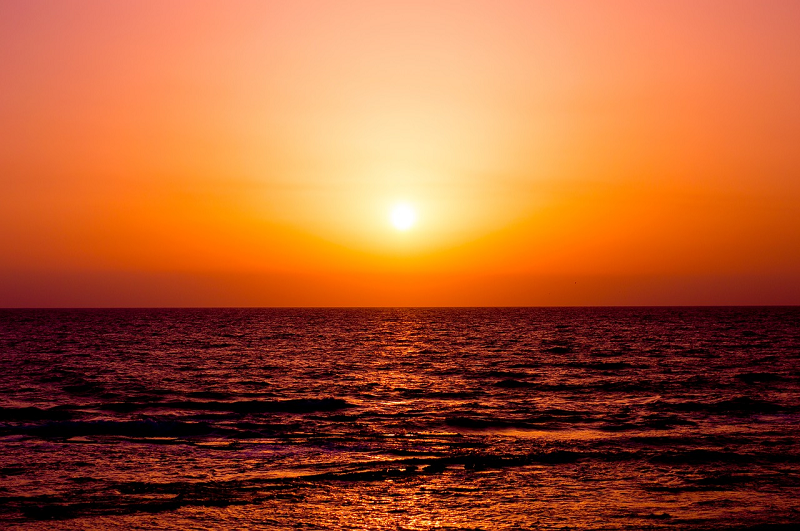
Winter packing list for Israel (December to February)
Winter in Israel starts around December and ends in February. Usually, the temperature during the day is about 10 degrees Celsius (50 degrees Fahrenheit). Still, there are some very cold days, with the temperature reaching around zero degrees. Sometimes, it even snows in Jerusalem and the Golan Heights. During the evening, the temperature can get very chilly, especially in Jerusalem. Compared to other places around the globe, it might not be so cold, but I still recommend bringing warm clothes. It’s best to come with layers.
Here are some recommended items for the Israeli wintertime:
- A coat. It doesn’t have to be a super warm coat, but I do recommend bringing a coat with wind and rain protection. F ind coats on Amazon .
- Umbrella . It isn’t a must because it doesn’t always rain in winter. But I recommend checking the forecast a week in advance, and if you see expected rainfall, bring an umbrella. Winds are usually strong, so bring a sturdy one. But don’t worry – If you get caught in the rain with no umbrella, it’s usually easy to buy one in the cities.
- A scarf, mittens, and a wool hat. This is especially important if you’re coming to Jerusalem, the Upper Galilee, or the Golan Heights. These places can get very cold in winter, and I always walk around with a scarf, mittens, and wool hat in my backpack. Just in case I get cold.
- Waterproof shoes. After rainfall, pavements might be flooded or wet. So, if you don’t want the water to penetrate your shoes, it’s best to come with waterproof ones.
Recommended read >> Full guide to winter in Israel .

Spring and fall packing list for Israel (March to May and October to November)
Spring and fall are the intermediate seasons in Israel. A few years ago, people said that springtime has more chance of rain, but I think things have changed lately. The weather is unexpected, and there might be a super hot day or a super cold day. And there’s not much difference between spring and fall anymore. If you plan to hike in Israel, springtime is the most beautiful month, with flowers blossoming everywhere. But fall is also a pleasant time for hiking.
There’s nothing too special to add to your packing list for Israel in spring or fall. It’s recommended to bring different layers of clothing, so you can be prepared for all types of weather. A rainproof jacket could also be a good addition to your suitcase. But other than that, I think the essentials cover it.
Recommended read >> Full guide to springtime in Israel .
Israel is generally a warm destination all year long and in winter, there could be some chilly evenings. So, the best thing is to pack clothes in layers that can fit all kinds of temperatures. Other than clothing, you should pack all your documents, comfortable shoes, sunscreen, sunglasses, a portable charger, and anything else that will make your trip fun and comfortable. Hope this packing list for Israel will help you keep organized!
Before you go – I also recommend reading >> Travel to Israel: All You Need to Know.
Save this post for later!
If you liked this post or found it useful, please don’t hesitate to like, share or comment (:
If you need any advice about your trip to Israel, please don’t hesitate to message me on my Facebook page or contact me at [email protected] .
You can also support my work by buying me a coffee on Ko-Fi . Your support helps me maintain the site and keep creating content about Israel. It’s greatly appreciated!
My 5 Favorite Beaches in Eilat and Why I Love Them
5 beautiful views of jerusalem – and most are free, you may also like, volunteering opportunities in israel: find the best program, understanding the geography of israel, the best free virtual tours of israel, israel-hamas war updates and how you can help, 15 things not to do in israel when..., what to wear in jerusalem: dress code for..., the best apps for travelers in israel, full guide to springtime in israel, the best hikes in israel (in my opinion), is israel hot yes here are 5 ways..., leave a comment cancel reply.
Save my name, email, and website in this browser for the next time I comment.
This site uses Akismet to reduce spam. Learn how your comment data is processed .
This website uses cookies to improve your experience. I'm assuming you're ok with this, but you can opt-out if you wish. Accept Read the Privacy Policy

50 MUST-READ Tips For Your Trip To Israel in 2023
This post contains affiliate links, for which I may earn a commission if you make a qualifying purchase.
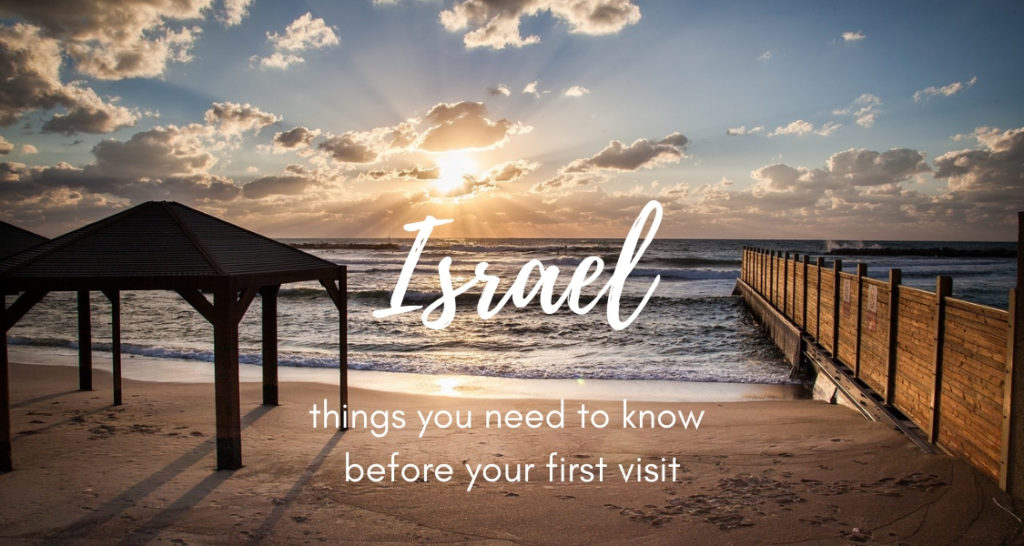
Sharing is caring!
Israel is an amazing country – and one that brings with it a lot of unknowns for first-time visitors. I’ve visited eight times and learned a thing or two along the way. There are so many things to know before going to Israel!
We hope these tips for traveling to Israel will demystify the experience a little and leave you open to be amazed, surprised and excited by what you find. A trip to Israel is truly a dream come true for many people so our goal is to make your experience unforgettable.
Want to skip all the planning and access my detailed Israel itinerary complete with daily schedules, awesome activities, and travel hacks? Click the button below.

Before you start planning your trip to Israel…

There are a few things to know before traveling to Israel that could make your plans a non-starter, so read these closely!
Check to ensure your passport/citizenship allows going to Israel . If you’re planning travel to Israel from the US and you carry a US passport, you’ll be allowed to enter the country on a three-month tourist visa that’s granted upon arrival. Most countries don’t require a visa in advance, but be sure to check your country’s requirements if you aren’t from North America. Use this official link for information and to apply for a visa for Israel if you need one.
Make sure your passport has at least 6 months of validity from the date you plan to leave Israel. You may be denied entry if you’re planning a May visit and your passport expires in August, for example. That would be the worst way to start a trip to Israel!
There are no specific COVID entry requirements for Israel as of early 2023. You can check this website for additional details and updates. As of this writing, restrictions only apply if you actually test positive for COVID. There is no vaccination requirement to enter Israel.

Book a photoshoot
We always love to book a photoshoot when we’re traveling. As a mom, it’s tough to get in the photos since I’m always behind the camera. We use Flytographer to capture our memories. You can get $25 off your shoot by booking with this link or using code FAMILYVOYAGE.
Is Israel safe to visit?

It’s safe. Don’t believe the hype you see in the news, Israel is generally a safe country to visit . Just use street smarts and tune into the news. Stay on the tourist path and you should be fine to travel in Israel. The US State Department advises that travel within Israel itself is fine, albeit with a dose of extra caution in Jerusalem’s Old City. As with any place you’re visiting at home or abroad, it’s important to keep up on what’s happening in the news. Ynetnews is the English version of the the country’s top newspaper, Yedioth Ahronoth. This isn’t to say that “Is it safe to travel to Israel?” is universally answered with a “yes” but barring a major outbreak of hostility you’ll be fine.
Soldiers are a part of daily life. From age 18 through 20 or 21 most Israelis serve in the army. You will see soldiers throughout your time in Israel. Don’t be nervous, they are young adults who happen to be wearing a uniform. The guns you see out in the street are there because soldiers are required to keep tabs on them (or have them behind multiple locks) at all times. Apart from these requirements, there isn’t much of a “gun culture” and there are stiff restrictions on private gun ownership in Israel.
There is more to the country than the geopolitical situation. This is perhaps the most important of our Israel travel tips. While the geopolitical situation is very real and cannot be ignored, it is not the identity of Israel. Israel is home to an innovative tech sector, world-renowned agriculture and incredible diversity. Explore Israel with open eyes and don’t be afraid to connect with the people. If you view your trip to Israel only through the lens of conflict, you’ll miss out on so much more!
The water is just as safe to drink as in any other developed country. Unless posted otherwise, the water throughout Israel is safe to drink. If you are traveling to more remote areas double-check with your accommodation or the National Park service.
Airport security can be intense… or it can be nothing. I think most travelers have heard about that friend of a friend’s second cousin who was detained for four hours at the Tel Aviv airport. Yes, it happens . But it’s far from the norm. In the US, everyone is forced to take off their shoes, unpack their bags and may be subjected to random pat-downs (it once happened to me when bringing coffee back from Hawaii on a domestic flight).
The approach in Israel is different. Rather than applying broad security measures to everyone, they apply deep security measures to those who arouse suspicion. Guards are trained to read microscopic changes in facial expressions as people answer (seemingly) random questions. Certain passport stamps will definitely increase the likelihood of additional screening and questioning.
It’s not better or worse, it’s just different. It’s never been a lengthy process for us, and sometimes faster than in the US where it seems like there’s a new and arbitrary rule every week. On the other hand, I know a guy who did get detained for hours due to a wide range of passport stamps he had accumulated from “unfriendly” countries through business travel. It didn’t help that he became aggressive when questioned about the stamps (as he told me).
Israel doesn’t stamp passports anymore . And they haven’t for quite a few years! There are enough other countries who don’t like seeing Israeli stamps that they don’t do it. Instead they give you a little blue card that fits perfectly in your passport and shows your grainy photo, date of entry, passport number etc. Try not to lose it since that’s your only proof that you’re legally in the country, but we’ve never been asked for it. You may need to use it for VAT refund or to avoid VAT at hotels. You do not need to present it to exit, but upon leaving you’ll be given a matching pink card.
Important note if you plan to travel elsewhere in the region: Israel doesn’t stamp passports anymore. But if you use an overland crossing into Jordan (let’s say for a day trip to Petra ), Jordan will stamp your passport. It’ll be pretty obvious which country is on the other side of that border! It’s not clear to what extent that Jordanian passport stamp could cause you problems in the future, so if you’re concerned then it might be worth flying from Israel to Jordan (unless your passport is nearing expiration).
Use the interactive map to find vacation rentals and hotels in Israel
Practical details for your trip to Israel
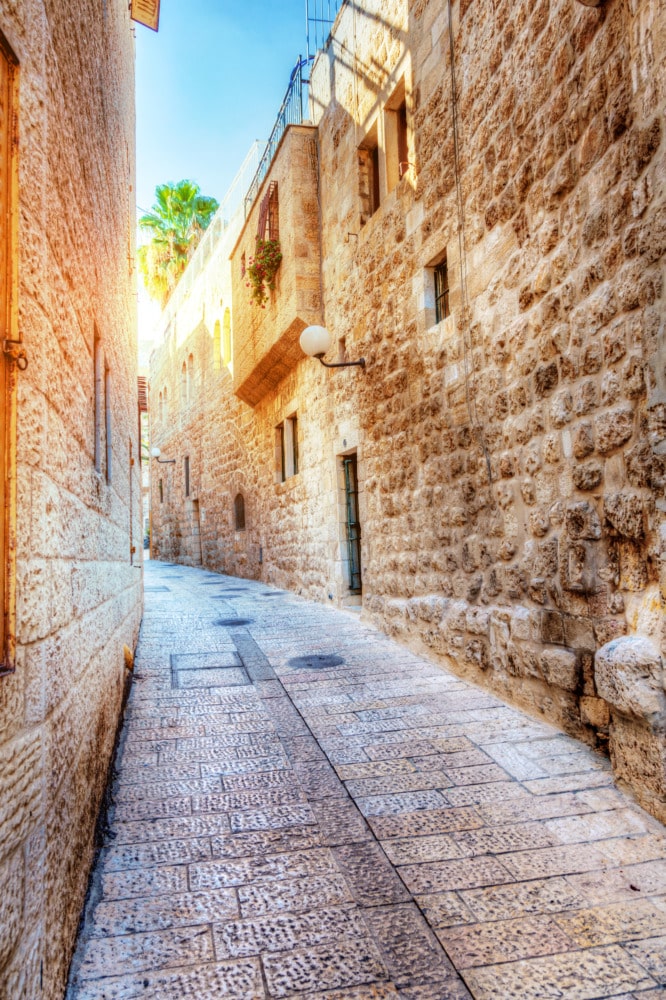
Israel has its own time zone, IST. It’s 2 hours ahead of UTC from late October to late March and 3 hours ahead of UTC the rest of the year. The winter is referred to as Israel Standard Time while the summer is referred to as either Israel Summer Time or Israel Daylight Time.
Israel’s currency is the shekel, which is divided into agorot. The exchange rate for the last few years has been pretty stable around 3-4 shekels (sometimes abbreviated ILS, sometimes NIS for “new Israeli shekels”) per $1 US. There are 100 agorot per shekel. Prepare for your pockets to be heavy – Israel uses coins all the way through 10 shekels!
Israel uses a standard European plug adapter. When you visit Israel you can either bring a bunch of these or switch over to this consolidated solution for charging all of your devices wherever you go. I just bought one and it’s working out great!
Israel is a fairly expensive country. Whether you’re visiting Israel for the first time or the fifteenth time, be prepared to pay prices similar to the US for food and accommodations, while some durable goods may be much more expensive (particularly if they’re imported). Israel has been struggling with inflation along with the rest of the world, and the cost of living for Israelis is a huge struggle in the cities.
What to bring to Israel
What to pack is one of the most common things to know before visiting Israel that I’m asked about!
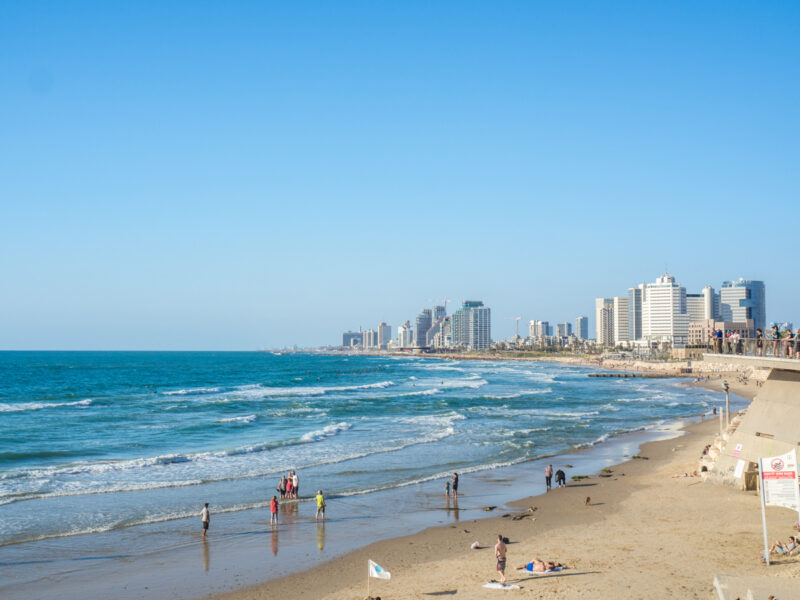
Don’t forget your swimsuit. Israel has some phenomenal beaches and benefits from the warm Mediterranean waters. Make time to go to the beach and relax if you’re visiting April to October. During other times of the year, you might still want to go float in the Dead Sea.
Dress modestly (in some places). At religious sites (including the Western Wall and the Temple Mount) and when walking through extremely religious neighborhoods, try to dress modestly out of respect for those communities – and so that you don’t get harassed. Yes, there are reports of women being spat on (or worse) for visiting an ultra-orthodox neighborhood without fully covering themselves – ankle to wrist to collarbone .
There are plenty of microclimates to confuse your packing list. When packing for Israel, take note of what time of year you’re traveling. During the summer the country is hot everywhere during the day, but the desert and the north can experience cool temperatures at night even during the summer. During winter the whole country can be pretty chilly – we’ve seen snow on the palm trees in Jerusalem. While Tel Aviv is known for being humid, Jerusalem is higher and drier.
Pack your bags! Check out our season-by-season guide for what to bring to Israel.
Get your currency from the airport ATM instead of bringing it. Banks in the US don’t exactly specialize in shekels and agorot . You can use credit cards nearly everywhere when you visit Israel, but for a little cash just use the ATM in the baggage claim at the airport when you begin your trip to Israel.
Food in Israel

The food is so good. Israel is a nation of immigrants and you can sample some of the best, most diverse cuisine in the world. You’ll find options covering every budget from fine dining to street food. Just come prepared to eat, and to eat well.
Did somebody say wine? Israel produces some outstanding wine, and you can go tasting at wineries around the Judean Hills, in the Golan or even in the desert on your Israel trip.
Israeli breakfast is a thing . If you’re a breakfast person, then you’re gonna love Israel. Delicious fresh vegetables, cheeses, eggs and bread are served up in homes, hotels, kibbutz dining halls and restaurants throughout the country – at least on weekends. So good. Make sure you try shakshuka at least once! This egg and tomato dish is one of my favorites.
You may have to pick between sabich and falafel. There’s a great debate over which is the best Israeli street food. Sabich is a traditional Iraqi breakfast sandwich with cut up hard boiled egg, potato and roasted eggplant in a pita; modern versions now add salads and are served at lunchtime. Falafel balls are deep fried chickpeas served in pita with salads. Both make for a excellent, fast, cheap lunches.
Druze food is amazing. The northern part of Israel is home to many Druze people . The Druze religion is unique unto itself although it is a derivative of Islam. They are incredible people and their restaurants have some of the best food in all of Israel. If you’re far north, check out Al Sultan in Ma’asade (and potentially laugh as your phone alternates between thinking it’s in Israel, Syria and Lebanon).
There’s a strong cafe culture. Throughout Israel cafes are abundant and wonderful. If you like good coffee or a cup of tea make sure to stop for a break. Whether in Aroma, Caffit or one of the many independents in hipster neighborhoods, you’ll find Israelis sipping at all hours.
Limonana just might be the world’s most refreshing drink for a hot day. At most restaurants you can cool off with a glass or carafe of this deliciously refreshing drink made from lemonade and fresh mint.
Kosher food is ubiquitous. The majority of food you will purchase at grocery stores is classified as kosher – meaning that it is certified by religious authorities to conform to Jewish dietary laws. The most prominent rules are that milk and meat cannot be consumed in the same meal (or from the same dishes, even at different meals) and certain foods like pork and shellfish are off limits.
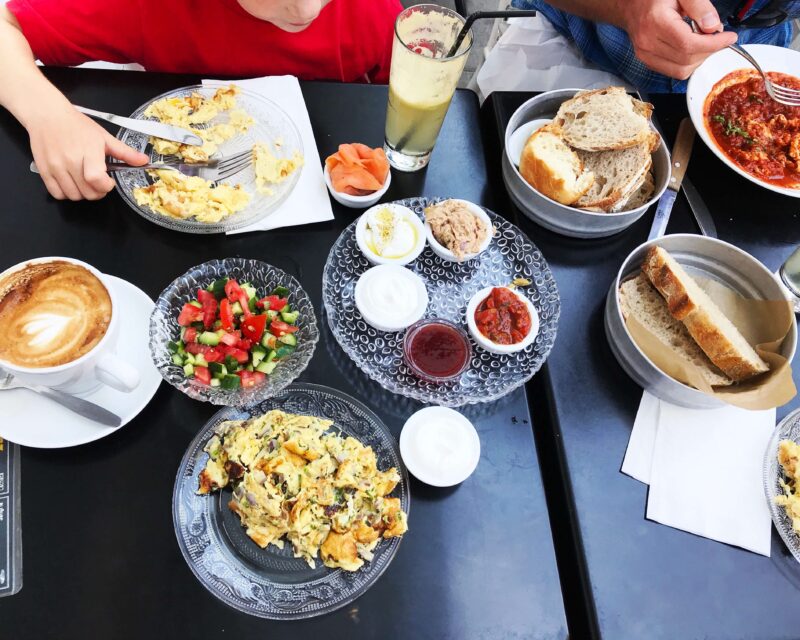
But not all restaurants are kosher. Kosher restaurants exist throughout Israel and are closed from Friday afternoon through Saturday evening. Don’t expect to eat cheeseburgers or pork chops at these restaurants, as both types of food are forbidden under Jewish dietary laws. These restaurants have a certificate that says all food prepared at the restaurant are prepared following kosher laws. Buuuuut… there are non-kosher restaurants throughout Israel as well. In fact, you’ll find some of flagrantly non-kosher restaurants in Tel Aviv ranging from high-brow foodie establishments to run-of-the-mill places that might be trying to thumb their noses at the country’s often-overbearing religious authorities.
Israel will give your sweet tooth a run for its money. Thanks to the melting pot that is Israel, you can try sweets from all over the world. My personal favorites? Kanafe – an Arab pastry made with noodle-like pastry soaked in syrup and layered with cheese. Rugelach – a rolled cake-like cookie made with chocolate and cinnamon. Halva – a sesame-based Arab dessert made with tahini paste, you can find it at any major outdoor market.
You should tip in restaurants . Tipping isn’t as generous as in the US, but 10-15% is a typical amount to tip in restaurants in Israel. Cash tips are preferred when you visit Israel.
Want to learn more about food in Israel? Check out these 20 foods you can’t miss!
Israeli culture
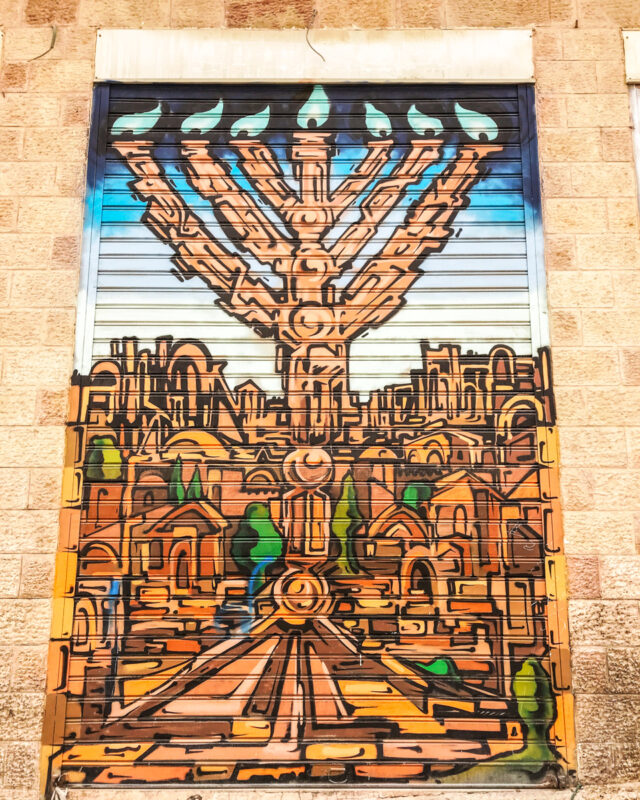
Israelis are friendly ish . Most people you will when you visit Israel meet are going to be friendly and willing to help you if you have a question or are lost, so don’t be afraid to ask. At the same time, Israelis are known for being direct to the point of blunt. One of our most important travel tips for Israel? Don’t be offended, and remember that it’s ok to be assertive (like when you’re in line to get on the bus). You’ll fit right in!
Most Israelis speak English extremely well. Don’t worry if Hebrew or Arabic isn’t quite up to snuff. Nearly all Israelis speak English (well) and they’d rather practice their English with you than listen to you try to remember everything you’d forgotten since fourth grade Hebrew school. You’ll have no problem traveling in Israel even with English as your only language.
Most Israelis aren’t religious (at least, not in the stereotypical way). Yes, 75% of Israelis are Jewish. But two-thirds of them self-report that they aren’t religious! What does that mean from a practical perspective? Throughout the country you’ll see that most Israelis are dressed in typical 21st century clothing and will drive on any day of the week. But you’ll also find that Friday night is often reserved for family (or friends) dinner at someone’s home. Nearly all Israeli Jews attend a Passover seder , fast on Yom Kippur, don’t eat pork… and never go to synagogue .
Some businesses are closed for Shabbat. Don’t plan on any major outings to shops or restaurants during the Jewish sabbath (Friday evening through Saturday evening), especially in Jerusalem. In Tel Aviv you will find more places open on Shabbat – and most of the city at the beach during the warmer months. Fortunately there are still plenty of cultural institutions and outdoor activities available all weekend!
There are so many Jewish holidays. Because Israel is a Jewish state, many attractions close during Jewish holidays. Check the calendar to plan your visit outside these periods (unless you are going specifically to celebrate the holiday). Accommodations will book up faster during these periods – see the point above about most Israelis being secular – and are also much more expensive. Passover and Sukkot are wonderful times to travel to Israel ( hello, shoulder season ), but those are also weeks when secular Israelis take their kids on excursions around the country. Wondering when’s the best time to visit Israel? Find out here.
Getting around Israel travel tips
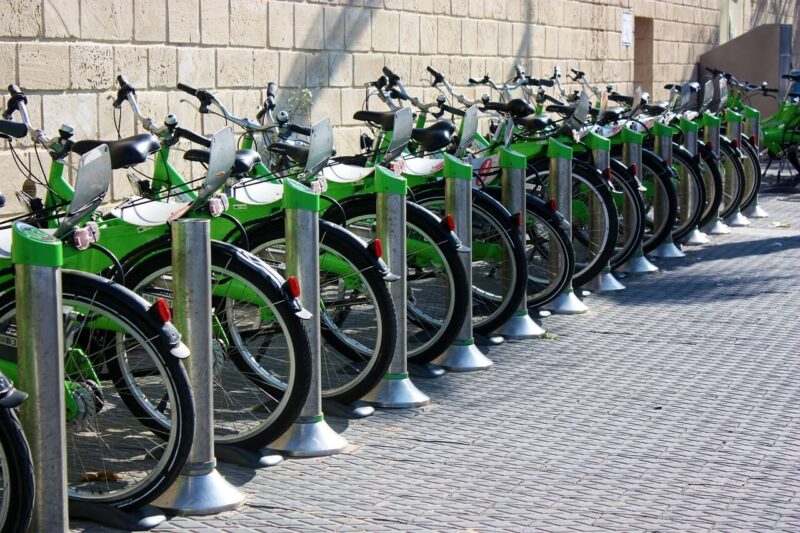
It’s easy to fly to Israel. Tel Aviv’s Ben Gurion airport is accessible from all major cities throughout North America and Europe. Flight prices vary depending on the season, but you can check here for the best flight deals on travel to Israel.
Driving in Israel is pretty easy these days. The roads are top quality and well maintained. Leading GPS app Waze was designed in Israel and will help you breeze through even the most confusing city roads. Most rental cars are European models with all of the modern conveniences. If you’ll have kids with you, make sure to read all about how to travel with car seats .
You don’t need an International Driving Permit. As long as you aren’t staying longer than a year, an International Driving Permit isn’t required in Israel. (Nor is an International Drivers License, which isn’t a real thing – just an internet scam.)
Don’t feel like renting a car? That’s ok too. Israel is well-connected on the ground bus and train systems (though not on Shabbat, Friday night to Saturday night). There are also plenty of taxis, Ubers and ride share vans ( sherutim ) to go around. Note that taxi drivers do not expect a tip, though “rounding up” is nice.
Electric bikes and scooters are everywhere . Especially in the metropolis of Tel Aviv, you will see tons of people whizzing around on electric scooters and bikes. Feel free to rent your own and give it a go! If that’s too speedy for you, pick up a free bike to explore the city for a few hours!
Don’t be surprised if your rental car ends up pricier than you thought. You just booked your car and you are bragging to all of your friends that you’re only paying $9 a day. You show up to Tel Aviv airport and find that your rental company charges a required insurance daily fee of $20+ a day. This happens to every tourist. Check with your rental company in advance to see how much they charge for mandatory insurance to avoid unwanted heart palpitations (but sorry, you won’t be able to avoid the fees!). Check rental car prices here.
It’s really not that big of a country. You can drive from the Red Sea to the Lebanon border in just over six hours when you visit Israel. The country’s relatively small size means you can see more and do more in less time when you’re traveling to Israel.
Are you thinking about renting a car in Israel? Read these 10 important tips first!
There are so many things to do in Israel
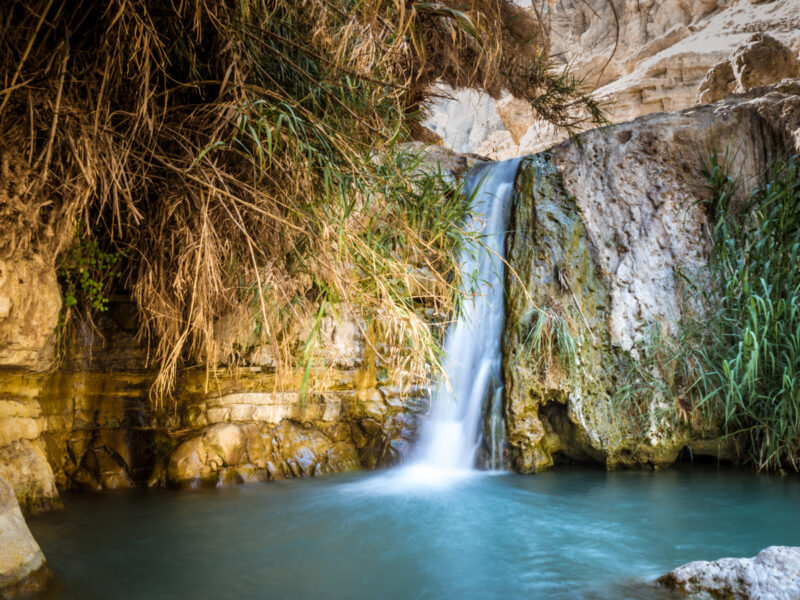
It’s an everything destination. Beach days, mountain hikes, world-class cities and incredible scenery… Israel has it all .
Jerusalem is a complicated city and it’s worth exploring. You’ll want to devote a full day to the ancient city, which is made up of four quarters: the Jewish quarter, Christian quarter, Muslim quarter and Armenian quarter. Even if you aren’t booking Israel tour packages, you’ll want to book a guided tour to provide context for the history, culture, and geopolitical situation. Be sure to allow some time exploring the modern city as well when you visit Jerusalem!
The north is couples-travel heaven. Whether you’re into waterfall hikes, wine tasting or just cozying up in your secluded cabin, you won’t regret a few peaceful days of together time. Check out these awesome tzimmers and romantic inns perfect for love-birds – we enjoyed a few during our kid-free trips to Israel!
You won’t want to miss the National Parks. With over 60 destinations ranging from famous sites of antiquity to a stalactite cave, Israel’s national parks will give you an amazing perspective on the country’s unique environment and history. Purchase a Green Pass when you’re there to visit several parks at a discount!
You can snorkel through a protected marine reserve. If you make it all the way to the southern tip of Israel, the city of Eilat has some stellar snorkeling at Coral Beach – it’s even included on that discounted Green Pass.
There’s a lot more to Jerusalem than the religious sites. While the Old City is worth a visit, the rest of the Jerusalem area also offers outstanding hiking, museums, outdoor markets and fun communal spaces. Allow time to explore Jerusalem beyond the Old City.
Matkot is something of a past-time in Israel. Before you hit the beach, purchase a matkot set. What is it? Think of it like paddle ball on the beach. You’ll hear the distinctive ping ping allllll weekend along the coast. Try it! You’ll fit right in… though you’ll have to practice for years to make it to the level of the expert 20-somethings who’ve been playing for their whole lives.
Israel is home to the world’s largest erosion crater. At the very northern tip of Israel’s Negev desert you’ll find Makhtesh Ramon, a massive crater formed by multiple erosion processes over hundreds of millions of years. It’s also home to wonderful walking paths, fascinating wildlife and a can’t-miss visitors center.
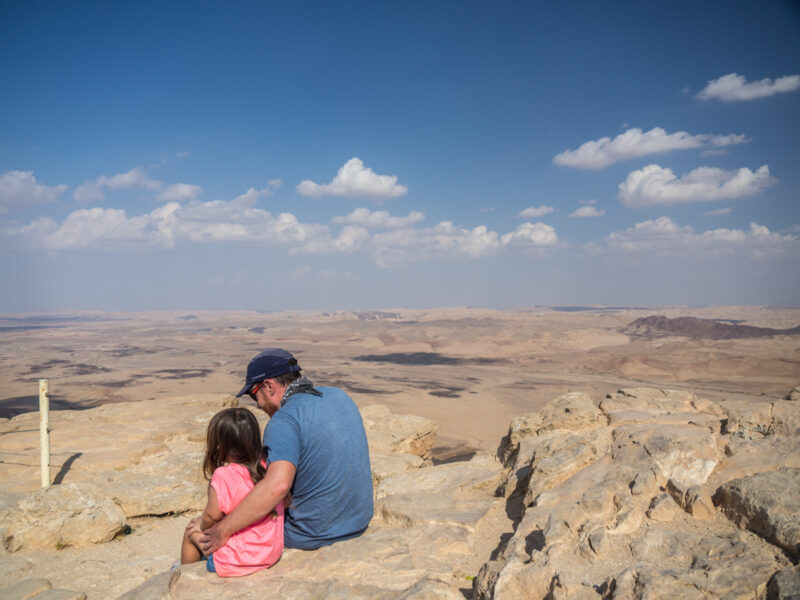
There are four distinct environments – and you should try to see them all. Throughout Israel you can experience deserts, beaches, mountains and urban environments – many of them in a single day if you’re really ambitious. Part of Israel’s appeal as a travel destination is that you have so much to explore in such a compact country.
You can float on water. Looking to relax and detox your skin? Head to the Dead Sea, straddling the Israel-Jordan border east of Jerusalem, and you’ll feel weightless as you float across the salty water. The Dead Sea mud is famous for its skin-friendly minerals and sold at a premium all over the world. Looking to indulge a little? Book a spa treatment while you’re there! Find out more about visiting the Dead Sea and other great day trips from Jerusalem .
Want to get up close with Roman ruins? Yes, the Romans did conquer the Holy Land and they left behind some incredible ruins well worth exploring. The ancient sea port of Caesarea makes a great stop along the coast and is an easy day trip from Tel Aviv. Check out these other great day trips from Tel Aviv!
Walk a street from Biblical times. Thanks to a rich tradition of archeological excavation, Israel has uncovered fascinating glimpses into ancient history. Sign up for a Kotel tunnel tour and wind down a narrow passageway into a different era.
The Holy Land is holy for Christians too. – Ever wanted to see the room where the last supper took place? The street where Jesus carried the cross? Or perhaps Jesus’ tomb? All of these locations are in Jerusalem and can be visited in one (very busy) day.
You’ll find one of the most recognizable mosques in the world. The Dome of the Rock is the most visible site across the Jerusalem skyline with its Golden Dome. Built on the grounds of where the Second Temple once stood, this site is one of the most important sites in the world for Muslims. Non-Muslims are not permitted to enter the building, though all are welcome to visit the complex at certain restricted times. Check the tourism site to see when visitors are allowed.
The kibbutz system has changed a lot but you can still get a taste of it. When Israel was emerging as a soon-to-be nation it created an economy built on socialist communities called Kibbutzim. The kibbutz movement grew over time to include everything from agriculture to industry and members’ daily life revolves around collectivism – including things as personal as raising children communally. Today, as Israel has moved towards a free market economy, kibbutzim are a shadow of their previous incarnations. You can still get a taste of kibbutz life by staying at one or even volunteering at one.
If you’re looking for a bit of a thrill, try rafting down the Jordan River. The river that separates Israel from its neighbor is a fun place to try out some rapids. Check out these great options.
Israel is part of the great bird migratory pattern. If you love seeing a diverse set of birds then you should head to northern Israel and visit the Hula Nature Reserve. Twice every year the marshes and lakes at Hula are teeming with birds of all kinds. Try to spot a water buffalo or a capybara too!
Markets are for tourists and locals alike. Jerusalem and Tel Aviv both have major open air markets called ‘the shuk ’. Here you can sample fresh produce, sweets, bargain for a shirt or backgammon board, or sip a refreshing fresh juice – shoulder-to-shoulder with locals (especially on Friday when everyone is shopping for Shabbat dinner). Visiting a shuk is a must if you are traveling to Israel. The famous shuk in Jerusalem is Mahane Yehuda, and it’s been transformed over the past years to include a vibrant night scene with pop up restaurants and pubs.
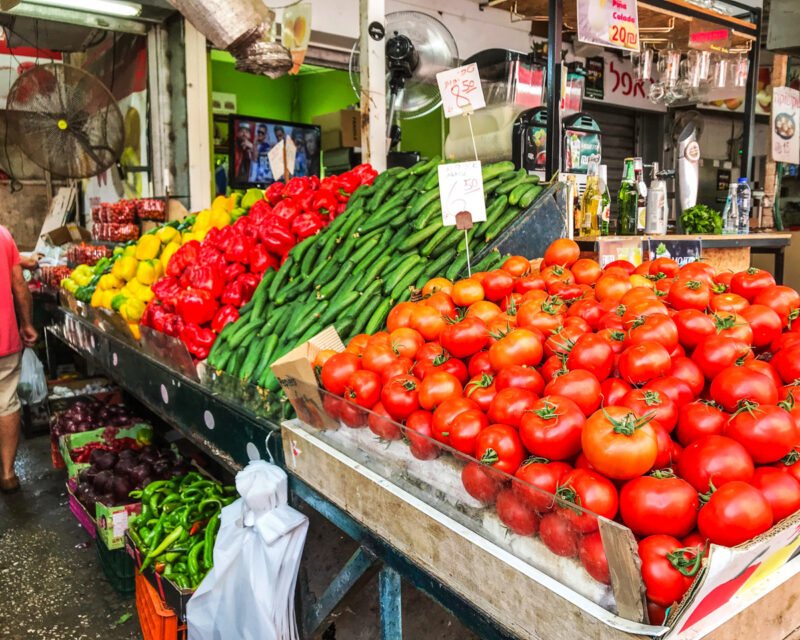
FAQs for your trip to Israel
Yes, most of Israel is safe to visit. That said, there are sometime security situations that arise so it’s always prudent to keep an eye on the news – as with anywhere you travel.
My favorite times of year to visit Israel are Spring and Fall, but here’s a detailed breakdown of the best time of year to visit Israel .
If you’ve never been to Israel before, I recommend a 10 day trip to Israel to see the country’s highlights.
Plan your travel to Israel
I hope these traveling to Israel tips have helped you feel prepared for the journey of a lifetime!
Money-saving travel resources: – Find the cheapest flights on Skyscanner – Book your discounted rental car on RentalCars.com – Compare travel insurance options – 4 simple hacks to save more money on booking.com Check out these helpful articles to plan your upcoming trip to Israel: – The perfect 10 day Israel itinerary – 3 days in Jerusalem itinerary – 2 days in Tel Aviv itinerary – Where to stay in Israel – 50 things to know before you visit Israel – What to pack for Israel in each season – When is the best time of year to go to Israel? – 10+ must-read tips for renting a car in Israel – 20 foods you have to try in Israel – 25+ best books about Israel – Where to stay in Jerusalem – What to do in Jerusalem on Shabbat – Israel with kids: the complete guide – Visiting Jerusalem with kids – Visiting Tel Aviv with kids – Best day trips from Tel Aviv – Best day trips from Jerusalem – Your Israel itinerary for (more or less) 10 days – Visiting the Bahai Gardens in Haifa, Israel
Prefer to carry a paper guide book or map? Check out these great options:
If you plan on driving, a paper map will be one of the most important things to take on vacation to Israel!
Pin this article to come back to it later!

What to read next
22 thoughts on “50 must-read tips for your trip to israel in 2023”.
These are great tips for traveling to Israel! I visited for the first time earlier this year, and I would totally go back again! I’m bummed I missed out on trying the shakshuka!
So glad you had a good time! What was your favorite experience?
I have never considered Israel as a travel destination. Interesting to read about it, thank you. Kx
I hope you have the opportunity to go one day! It’s a incredible country with so many unique aspects, and it’s easy to travel too 🙂
This was so thorough guide to Israel! I visited Israel for the first time this year, only Eilat and Jerusalem, but I definitely want to go there again and explore many other places. It is such a unique and diverse country. I also felt very safe there. Thank you for sharing this!
It’s amazing how safe it feels once you’re on the ground! I had no problem walking alone in our neighborhoods in Jerusalem and Tel Aviv, which I would never feel comfortable doing in our ritzy neighborhood in Los Angeles.
The getting around section is good. Helpful to know about GPS, Waze, electric bikes and scooters. Been concerned about renting a car in isreal. What time of year is best for the Hula Nature Preserve?
I think Israel would be a great family destination; lots of nature and culture which is what I like! I love the sound of the food too – it seems to be quite vegetarian friendly. Pinned for later! #fearlessfamtrav
I was vegetarian for 8 years and still often prefer vegetarian food to meat. Israel is HEAVEN for vegetarians! Check out all the awesome food options: https://www.thefamilyvoyage.com/traditional-food-in-israel/
Thanks so much for blowing some of the myths about travelling to Israel out of the water. /would love to visit! #fearlesstravelfam
What an awesome article Melissa. I really hadn’t thought of visiting Israel but you have convinced me! The food especially for vegetarians looks so good! #fearlessfam
Such a great article and motivation to plan a trip! Israel is on our list of countries to visit, we haven’t been yet unfortunately. Everyone we know who has visited says it is one of their favorite destinations!
It’s SUCH an awesome place to visit! I hope you have the opportunity one day 🙂
Desperate to get to Israel! If only for the food! Thanks for linking up to #fearlessfamtrav
I love shakshouka – my favourite breakfast! #fearlessfamtrav
I’m going to Israel in February with a tour group and until reading your article I really didn’t know what to expect! You helped to relieve my “fear of the unknown” and now I’m just excited to go! Now to read the packing recommendations… 😊 Thank you!
Israel is a stunning country. Glad you made it to Israel. From the Golan heights to the Dead Sea, the entire country is beautiful. Thanks for sharing this tour guide.
Limonana sounds amazing! thanks for your tips x
Love lsrael been there two times. Going in a group is good but there is other ways they have prayer houses, advent house and hostels all very cost effective go on your on or own group. There is busses that take you everywhere do your own thing.
Absolutely! There are many different options for an amazing trip 🙂
Superb article Melissa. After reading your article I was inspired to travel to Israel. The vegetarian food in particular looks delicious!
Hi Michael,
I’m so glad you enjoyed! There’s tons of amazing food in Israel, so I hope you get there soon.
Safe travels,
Leave a Comment Cancel reply
Save my name, email, and website in this browser for the next time I comment.
This site uses Akismet to reduce spam. Learn how your comment data is processed .
READY TO PLAN YOUR TRIP?

LET ME DO THE WORK FOR YOU!

Mukikapup's Travels
Solo Travel In Israel: Expert Tips, Itinerary + More (2024)

Have you been looking for how to solo travel in Israel? I’ve got you covered!
In addition to multiple visits and touring around Israel, I lived in the country for two years in both Haifa and Tel Aviv (I even got citizenship)!
Between multiple archaeological excavations, traditional tours, an internship photographing archaeological sites where I traveled mostly solo to get to them on public transit, working in a Tel Aviv hostel, renting a car and more experiences, I know how to travel solo in Israel!
Do these three things right now, then keep reading for all you need to know to explore this amazing country alone:
- Download Moovit, Waze, WhatsApp and Gett on your phone
- Decide if you’re getting an eSIM or regular SIM card when you arrive
- Learn the Hebrew alphabet song and practice (this one’s optional, as English is widely spoken, but can be helpful)
- Get travel insurance (I use Allianz )
Also get excited, because Israel is one of the best and safest countries for solo travelers, full of friendly and fun people and things to do!

Planning Your Israel Trip? Use my favorite resources:
Accommodation: Booking.com Mid-Priced Hotel: Bezalel Hotel Rent a Car: Discover Cars Travel Insurance: Allianz Flights: WayAway Tour: All Inclusive Walking Tour Old City Jerusalem Airport Transfers: KiwiTaxi
Is it Safe to Tour Israel on Your Own?

In general, Israel is very safe compared to most countries, although right now is obviously different (but still generally safe for travel in touristy areas ).
There are certain things to be aware of, like not to drive with an Israeli license plate into Gaza or the West Bank (Gaza in general isn’t safe, or certain areas of the West Bank). I also recommend staying away from more risky border areas without a tour guide.
Is it safe to travel to Israel at the moment?
You can definitely travel solo to Israel right now, but I recommend booking a tour(s) to go around the countr y. Staying in Tel Aviv solo is fine, just communicate with locals and know what to do when there are sirens, for example.
Disclaimer: There is always some risk traveling anywhere, and Israel is no exception. There are random terror attacks, even when there’s not a war. Once, when I lived in Yafo/Jaffa, I was told I had to stay away from my sublet apartment because of a threat the police were looking into, for example. Because of the police and IDF, though, Israel feels safe – don’t be alarmed by the soldiers, as they’re there to protect you!
Is Israel safe for solo female travel?
In short, yes – I traveled there solo regularly, especially while living there! Mostly, it can be easy to get lost when you’re not used to using Moovit, or if you don’t have data on your phone, and more things. And, obviously, while there’s war I don’t recommend solo travel outside of Tel Aviv without a tour group/guide.
Here are a few tips:
- Download the Moovit app and learn the Hebrew alphabet so you can be comfortable with using it before you arrive
- Download the Gett app for taxis to avoid getting overcharged
- Get a Rav Kav upon arrival
- Download the Google Maps of the areas onto your phone in advance in case you don’t have data or cell phone service
- Keep reading for packing tips to know how to dress, and always stay hydrated
- Stay away from places that flood in the Winter , like in the Negev
- If you’re going to secluded places for hiking or swimming, make sure there are people around and/or find a new friend to bring (from your hostel or a Facebook group, for example)
- Be careful with drinking . Make sure you’re with a trusted group, or stop when you know you need to
- Men in Israel are bold – they’re harmless, just be bold right back to them
- Have the Google Translate app on your phone, and a website tab open for converting prices (usd, for example, to shekel)
Is it safe to walk around Tel Aviv alone and at night?

Also, yes – I did this all the time. However, a coworker who grew up in Israel didn’t – so really, it’s up to you.
Once, I my phone died and I had to find my way home to Jaffa at night, so I found my way to the beach, took off my shoes and walked along the beach to Jaffa! There are usually people on the beach at night in Tel Aviv, as long as it’s not too late (like early morning hours – locals stay out late, especially in the warmer months).
Quick Facts for Israel Travel
To save you time – because I know from experience that solo travel takes a lot of planning:
⏰ Time Zone: Israel Standard Time (GMT+2) 💰 Currency: Shekel 🎫 Visa : Travelers from the US typically are granted a 3-month tourist visa upon arrival (which is free of charge), that can be extended. 🎫 Passport Stamp: Instead of stamping passports, Israel gives travelers an entry card (but they reserve the right to stamp your passport). Keep your entry card! If you don’t, you can get charged the VAT tax. 📱Everyone in Israel uses WhatsApp – literally no one texts on regular texting! WhatsApp is also great to have for traveling around the world anyway.
Best ways to travel Israel Solo
🌴 join a tour.
The best way to see Israel when you’re on your own, especially if it’s your first trip, is to find tours to the places you want to go.
You can find one tour that covers all the main spots and then do others on your own, or choose multiple tours for smaller groups of places for one day, two days etc.
👉 This Day trip from Tel Aviv to Jerusalem and Dead Sea is perfect if you’re short on time and want to see the Dead Sea and the Old City of Jerusalem in one day!
🌟 Check out this 5-star review from Harrison_H: “A long day that covers the essential parts of Jerusalem and the Dead Sea. A must do for anyone visiting Tel Aviv. Our guide Udi was full of knowledge and humour. Overall very enjoyable.”
🤩 Learn More About this Day trip from Tel Aviv to Jerusalem and Dead Sea Here
👉 This Underground Jerusalem Tour covers many of my favorite spots, including the Western Wall Tunnels, Hezekiah’s Tunnel/Siloam Tunnel and the City of David, and more! Then, you’re free to explore the Old City on your own.
🌟 Check out this 5-star review from Sandra_P: “Saw things I had no clue existed. I would have never found this myself. He is VERY knowledgeable, funny and friendly. Very well organized, unique and interesting experience”
🤩 Learn More About this Underground Jerusalem Tour Here
👉 I went on the D-TLV Pub Crawl Night Tour and know a lot of the people who lead these tours from when I worked at the hostel, and I highly recommend it for meeting new people and experiencing the TLV club scene in a safe group!

🤩 Go on the D-TLV Pub Crawl Night Tour
🌴 Use public transportation and/or rent a car
While I don’t recommend this as much currently outside of cities, Israel has an excellent public transportation system including buses, trains and light rail. Of course, you won’t be able to use these on Shabbat and the Sherut is not reliable (I tried to use it a time or two and it never came).
You can also take Taxis or Uber, and rent a car (I use Discover Cars ) for travel to places without public transit, like archaeological sites and National Parks.
For all over Israel, get a Rav Kav , which is the public transit card for the bus (and trains, but you have to buy the ticket at the train stations for that). You can fill it up at stations and stores around the city. If you don’t get one and fill it up outside of the bus, you’ll have to buy one for one ride on the bus, but it’s more expensive – so be sure to pick one up at the airport!
My experience:

During my internship, I wasn’t allowed to rent a car to get to archaeological sites I was photographing, so I’d get up super early and take public transit to meet the site managers, who would pick me up and drive me the rest of the way… I definitely would rather have had a rental car!
I also rented a car to participate on the Tel Azekah dig for a day before my Masters program started at TAU. I brought a friend and we also stopped at Ashkelon, then I returned the car to the airport and took the train and a bus back to my hostel, where I worked a night shift. Those were crazy times!
🌴 Volunteer and/or stay at a hostel

If you’re short on budget, hostels are a cheaper option, plus they’re a fantastic way to meet new people, find activities and find people who will travel with you!
If you’re really short on budget, most hostels in Israel take volunteers in exchange for a free place to stay , and some hostels also include some meals.
🌴 Find Facebook Groups
Everyone in Israel uses Facebook. I found my hostel job on Facebook plus apartments and sublets, and I was in groups for other job opportunities and trips/activities! Literally anything you’re interested in, you can find Facebook and WhatsApp groups for them.
I mostly recommend this only if you’re going to be in Israel for more than a week and have time to spend on this.
🌴 Participate on an archaeological excavation

One of my favorite things to do in Israel is archaeology! I knew, from my first tour, that I needed to go on a dig – and I did! If you’re anything like me, hearing about archaeological sites and digs – especially the really interesting sites – will make you wish you could experience this.
Digs mostly take place in the summer for 4 weeks per season, and you can volunteer for anywhere from a day, to a week to all four weeks usually. Just contact the people in charge of the excavation you choose and ask for details!
How to not look like a tourist in Israel

Israel is incredibly diverse, so it’s easy to fit in! There are people of every race; there are Jews, Arabs, Muslims, Christians, Druze, Bedouin and more people, from countries all over the world and people whose families have been in the land continuously since ancient times. Luckily, English is widely spoken as well.
Here are my top tips for ways to fit in even more while traveling solo in Israel:
What to Pack & Wear (or buy in Israel)
There are certain things to wear and have in Israel to fit in and just to be prepared for the climate, culture and travel activities. These include:
To know what to wear and pack for a trip to Israel, the first thing to know is what time of year you’re visiting to be ready for the weather.
👉 You’ll definitely need sunscreen, a hat and a good water bottle.
👉 Electrolyte packets like these for better hydration, because walking around in the sun will get to you.
👉 This microfiber towel for the beach is perfect to avoid having to rent one, and you can also use it for yoga:
👉 Good walking/hiking sandals like Chacos that can also get wet, so perfect for all those hikes (even in waterfalls).
- Check Price on Amazon
- Check Price on REI
👉 Blundstones (especially for Fall or Winter ), which you’ll see most Israelis wearing.
- Check price on Amazon
- Check price on REI
🔌 Electrical Converter : Israel uses plug types C, H and M, a 230V supply voltage and 50Hz.

Unidapt Universal Travel Adapter
- Intelligent charge "IC" allows it to automatically recognize devices for optimized charging time of all your devices
- Charge up to 5 devices
- Covers over 160 countries with US/UK/EU/AU plugs
- Satisfaction Guarantee or your money back & 1 Year full Warranty

Learn a bit of Hebrew (and Arabic, if you want to go the extra mile)
Hebrew is the official language in Israel, though English is spoken by most people. You’ll hear a lot of Arabic as well, plus Russian and more languages.
Getting familiar with the Hebrew alphabet can help you read signs and use Moovit (public transportation app where some places are only in Hebrew).
It’s also helpful to know commonly used words and phrases, which you can learn on an app like Duolingo !
Plan for Shabbat and Holidays
Shabbat and Holidays in Israel are unlike anywhere else, and being prepared for them will help you know what to do and not find yourself without a plan!
Shabbat is the day of rest, so a lot of places are closed and there isn’t regular or reliable public transportation. I recommend being on a tour with a guide, or planning to stay in (get food in advance), go to the beach etc!
Some holidays, including Yom Kippur, are like Shabbat – on Yom Kippur there is no traffic, even – while other holidays have festivals and celebrations that everyone gets really into, like Purim and Laila Levan (TLV White Night) .
Understand the Local Culture
Knowing what the locals do and how to act in certain situations can help make solo travel much easier and less stressful – here are my top tips for first time and solo travelers in Israel:
- Where to hang out, like beaches and clubs
If you’re looking for a break from being a tourist, going to beaches and clubs (or the pub crawl mentioned earlier) are great ways to meet people!
- Mealtimes & Restaurant etiquette
In Israel, mealtimes tend to be later, and people stay out later in the summer especially. People do tip at restaurants, around 12-15%, and you’ll need to ask for your check because they won’t bring it to you! Sometimes, if you sit at the bar the bartender might offer you a free shot of Arak for a toast (this is based on my experience, so no guarantees)!
- People are bold
People say what they mean without the fluff for the most part in Israel. This might feel like a bit of a shock, but it’s really appreciated because you know it means you won’t be wondering what people meant!
People say Israelis are like cacti – spiky on the outside, but sweet on the inside.
- Be open-minded
Obviously, I’m not saying you can’t be opinionated, but be open to learning new things, whether it’s trying new foods, learning the Israeli way of life, or learning about people’s political views.
Most Israelis protest and have strong opinions, but they also have a much better understanding of world politics in general than people from the US from education and travel, plus living in the Middle East and serving in the IDF – so, listen and learn!
Is Israel a cheap country to visit?

Short answer: No, Israel is expensive! Long answer: Definitely have some cash, but know how to make it cheaper because you definitely can.
- Hostels: There are some amazing hostels in Israel! Check out Abraham Hostel , which has locations in multiple places.
- Groceries & cooking: Eating out gets really expensive, really quickly in Israel, but getting groceries and cooking will save you a lot!
- Have cash, but use a travel credit card when you can: I use the Chase Sapphire Preferred so I don’t have foreign transaction fees, and I get points to use towards future travel!
- Walking & Public Transportation: Unless you need to get somewhere by car, walking and public transit is cheap. You can also rent bikes and scooters, which most people in the cities use anyway. There are trains connecting TLV, Jerusalem, Haifa and more places.
- Visit during shoulder season: Shoulder season is always cheaper, but be sure to miss the worst of the rainy season in the Winter if you want to avoid that (unless you want to see possible snow and ski at Mt. Hermon)!

How much does a 10 day trip to Israel cost?
An ordinary 10-day trip through Israel, excluding flights, typically falls within the range of $2,500-$3,000. For a more luxurious experience, the cost can rise to somewhere around $900 per person, per day.
The overall expense of a tour is influenced by factors such as the tour operator and the exact number of days. Most tours generally cover meals, accommodation and sightseeing.
Travelers on a budget can anticipate spending approximately $50-$70 per day in Israel, including expenses for food, transportation, accommodations, and activities. Budget-friendly options are around $10-$15 per person, while mid-range restaurants typically charge around $50 per person.
Getting Around Israel

I’ve already mentioned some about how to get around Israel, but here’s more specific information to help you plan your solo trip:
Can you get around Israel without a car?
You can somewhat, especially in and between cities. However, you’ll need a car or tour guide for many of the National Parks, archaeological and historical sites, smaller towns, wineries and more places outside of the main cities.
Renting a Car & Driving in Israel
I’ve rented a car in Israel, and I wrote a comprehensive post to help you more if you decide to rent a car.
I use and recommend Discover Cars for renting a car in Israel (just be sure to check the reviews for each location and rental company)!
If you rent a car, only drive in Israel. Do not cross into the West Bank or Gaza with and Israeli license plate, as it’s dangerous.
For parking, there are rules based on the colors on the curb for if you pay or if it’s free, and you can only pay online.
- Gray = free parking
- Blue & white = paid parking, but in the main cities in the evenings these are for residents only
- Red & white = no parking
- Red & yellow = no parking because it’s for taxis & buses

Best Places to Stay in Israel for Solo Travelers
I have recommendations for:
- Places to stay in Tel Aviv including neighborhoods, hotels, hostels etc ;
- Places to stay in Haifa including neighborhoods and accommodation for every budget in each ;
- Places to stay in Jerusalem for every budget .
If you’re looking specifically for Tel Aviv, here are my top places to stay for each budget range:
Where to stay in Tel Aviv on any Budget
✅ budget option: abraham hostel tel aviv.
Abraham Hostel is arguably the best hostel in Tel Aviv – and, it’s a chain with other locations around Israel! They also have a bar, game room, and events, plus a fantastic location around a lot of Tel Aviv hot spots.
You can book a dorm, private room, double room or apartment.
🛏️ Check Current Prices at Abraham Hostel Tel Aviv Here
✅ Mid-Tier Option: 65 Hotel Tel Aviv (an Atlas Boutique Hotel)
65 Hotel Tel Aviv is a classy boutique hotel is located on Rothschild Boulevard, which is one of the most famous and has a lot of restaurants, bars and sites to check out. The hotel’s design is part of the draw, with postcolonial and modern retro. There’s also a cafe with free breakfast, a bar where you get your first drink free, and a garden.
🛏️ Check Current Prices at 65 Hotel Tel Aviv Here
✅ Luxury Option: Royal Beach Hotel Tel Aviv (an Isrotel Hotel)
Royal Beach Hotel Tel Aviv is a luxury hotel right on the Mediterranean beachfront. There’s a bar, restaurant, pool and spa, and so much more to discover!
🛏️ Check Current Prices at the Royal Beach Tel Aviv Here
Itinerary Stops for Traveling Israel Solo
Every Israel Itinerary should have all the main parts of the country that are worth seeing – or at least the main ones you can fit into your time!
Here are my top places to see (read more details, like how much time and what to see in each place, in the links provided):
Tel Aviv is a must in Israel . It has the perfect mix of city, beach and museums, and it’s fun with amazing nightlife and food! I lived there, and I’d say I’m biased but I’m pretty sure everyone loves TLV!

Jerusalem is also a definite must when visiting Israel . It’s the intersection of the three major religions, of course, and you just can’t miss the Old City , other historical and archaeological sites and more!

Haifa, Caesarea, Akko & more
I also lived in Haifa and highly recommend it for the B’hai Gardens, the coexistence and more, plus surrounding sites and towns that are amazing to see!

👉 This Caesarea, Rosh Hanikra and Acre Day Trip from Tel Aviv includes more than just those two sites, and adds some of the other best day trip spots from Tel Aviv into one day!
You’ll visit:
- Rosh Hanikra grottos
- Caesarea Port, with amazing archaeological remains
- Haifa’s Baha’i Gardens
- Acre (Akko) Crusader Citadel, Tunnels & City Market

🌟 Check out this 5-star review from Joyce_h: “Jam packed day of touring up North!!! Bus picked us up at our hotel at the exact time given and we were taken to location to change to our respective buses for our tour. Bus was brand new, comfortable and spacious. Avi our tour guide was informative and knowledgeable. Our first stop was Caesarea’s National Park and the history was so interesting!!! Then off to the Bahai Gardens for some photo ops; only able to photograph from above or below. We did not enter gardens, but I knew that we wouldn’t. Next, Rosh Hanikra and finally the city of Akko. Here we stopped for lunch (Wish they added that to the description) which was an additional cost. Was a long day, but great to do on tour so we didnt have to drive and were able to look at the countryside. Bus driver also wonderful handling turns and traffic with a large bus with ease!!”
🚐 Learn More About this Caesarea, Rosh Hanikra and Acre Day Trip from Tel Aviv Here
Dead Sea, Masada, Ein Gedi & Qumran
These sites are all in the same area, and can be seen in one day. They’re quintessential to every Israel tour, and who doesn’t want to float in the Dead Sea?

👉 This full-day tour of Masada and the Dead Sea takes you in an air-conditioned vehicle from Tel Aviv to the foot of Masada, where you’ll take the cable car to the top and explore! You’ll also pass the Khan Al-Hatruri – The Good Samaritan Inn, explore Ein Gedi and pass by Qumran before going to float in the Dead Sea!
🌟 Check out this 5-star review from Ovidiu_C: “Definitely worth it! Great day trip from Tel Aviv. Left early in the morning and we got back around 5pm. More than enough as we did a lot. Stopped in the desert first which was an experience on it’s own. Then the Dead Sea, which is interesting to say the least. After that lunch and Masada. Very beautiful scenery everywhere we went. Our guide, Tomer, was very friendly and extremely funny. Great atmosphere the whole trip. Gave us information on everything and answered every question we had. To sum up the trip in one word, Sababa!!”
🚐 Learn More About this Masada and the Dead Sea Day Trip from Tel Aviv Here
Golan Heights

For solo travelers who want an off-the-beaten-path adventure, the Golan Heights is perfect! Located in the north, this elevated plateau has gorgeous landscapes, volcanic mountains, waterfalls and hiking, and archaeological sites.
You can explore ancient ruins, such as the Gamla Nature Reserve, with Tel Dan and more archaeological sites. The Golan Heights also has hiking, nature reserves, and the Banias Waterfall.
👉 This Timna Park Jeep Tour Adventure is a great excursion from Eilat on a day trip from Tel Aviv! You’ll get to ride in a jeep in the UNESCO World Heritage Site of Timna, with ancient rock formations, King Solomon’s mine, Solomon Pillars, ancient inscriptions and copper mines!
You’ll also stop for Bedouin tea!
🌟 Check out this 5-star review from Angela_G: “Alex was a great tour guide. He was knowledgeable in answering questions and showing us the highlights of Timna Park with a combination of riding in a jeep and light walking/climbing/small tunnel. The customer service was great and the tour is recommended.”
🚐 Learn More About this Timna Park Jeep Tour Adventure Here
The Galilee region is another amazing destination for solo travelers to visit, in the north. The Galilee has the Kinneret (Sea of Galilee), ancient sites such as the city of Tiberias, churches, wineries, hiking on the Jesus Trail and more places, and more to explore.

👉 This Private Wine Tour of Northern Israel will take you to the best of Israel’s wine country, in the Galilee and Golan Heights regions! You can choose to customize your own tour or pick a pre-arranged itinerary, and visit a handful of boutique wineries with wine tastings and education.
🌟 Check out this 5-star review from Marcel_M: “A wonderful experience. Each winery was unique and interesting. Our tour guide was delightful, providing thoughtful insight to the region and to the history of Israel. Highly recommend!”
🚐 Learn More About this Private Wine Tour of Northern Israel Here

Situated at the southernmost point of Israel, Eilat is a city that became known in history for its strategic location along the Red Sea . Today, it’s popular as a resort destination with hotels, diving and snorkeling, beaches and more.
Top Archaeological & Biblical Sites
Apart from the major cities, there are Biblical sites and archaeological sites in National Parks all throughout Israel that where solo travelers can find hidden gems (especially if you have a rental car!).
From sites in the places in this list, to other ones like the many Crusader Fortresses, Churches and ancient Synagogues, and sites like Zippori, Bet Shearim, Tel Gezer , the Elah Valley sites and more, there’s always something new to see!
Petra/Jordan
If you want to get that quintessential photo overlooking the famous Petra Treasury, you can hop on a Jordan tour, too !

👉 This Day Tour to Petra by Bus from Tel Aviv takes you to Petra by air-conditioned bus and back in the same day! You’ll get assistance with the border crossing and there’s an upgrade option to enter Petra by horseback.
🌟 Check out this 5-star review from Derek_H: “Please don’t let some of the crazy reviews put you off this tour, I think those people would prefer a helicopter to drop them directly there and fly them away when they’re finished, yes it’s a long day but it’s one of the most amazing sites in the world. It was literally jaw dropping to see Petra. On the Jordan side the tour guide Kareem was so nice and helpful, I’ll never forget the day. I’m sorry this trip has gotten any bad reviews, seeing the Treasury for the first time is a sight I’ll never forget, you won’t regret it”
🚐 Check Prices for this Day Tour to Petra by Bus from Tel Aviv Here
You can also do a trip to Cairo to get a photo with the pyramids .

You can take This Shuttle from Tel Aviv to Taba (border Egypt) , or you can do multi-day trips from Tel Aviv to Egypt, and even include Jordan, so you can check them all off your list in one trip!
This 5-Day- Israel, Jordan and Egypt From Tel Aviv is a great way to see all of these places!
🚐 Learn More About this 5-Day- Israel, Jordan and Egypt From Tel Aviv Here
When I lived in Israel, I met my cousin in Istanbul and also did some solo traveling on my own there! It’s a really short flight and an easy day (or more) trip from Israel.

More tips for Traveling Solo in Israel
✈️ Airport: Ben-Gurion For flights, WayAway is a flight aggregator that helps you find the cheapest flights. Use the code MUKI-TRAVELS for 10% off WayAway Plus. Airport Transfers: KiwiTaxi 🛌 Accommodation: Booking.com 📸 Tours: Viator.com
🇮🇱 Book a Private Arrival Transfer From Ben Gurion Airport to Tel Aviv City Center Here
FAQs About Solo Travel In Israel
👉 is israel safe for solo travelers.
Yes, Israel is generally safe for solo travelers. Take usual travel precautions and be aware of local customs, and ask people all your questions!
👉 Are there guided tours for solo travelers?
Yes, there are lots of options for tours when you’re a solo travel. I’ve listed many of them in this guide.
👉 What types of accommodation are available for solo travelers?
Hostels, guesthouses, apartments and hotels are all available through a variety of booking platforms, direct booking and even Facebook groups for solo travelers in Israel.
👉 How is the transportation system for solo travelers?
Israel has a well-connected transportation system. Buses, trains, and taxis make it easy for solo travelers to navigate the country. Just be sure to get a RavKav and download apps like Moovit for public transit (Moovit uses both Hebrew and English, so also use Google Maps), and Waze for driving. Also be sure to have a SIM or eSIM so you have data – I mostly just got lost when I didn’t have data to help guide me.
👉 Can I visit historical sites alone?
Yes, many historical sites in Israel are solo-traveler friendly. Explore ancient ruins, museums, and cultural landmarks at your own pace. I’ve been to many sites on my own, and it was great!
👉 What regions are best for solo travel in Israel?
Most places in Israel that are well known are perfect for solo travelers, like Jerusalem, Tel Aviv, the Galilee, and the Negev Desert. Read even more in this guide.
👉 Is there a language barrier for English speakers?
English is widely spoken in most of the tourist areas and major cities, like Tel Aviv and Jerusalem. In Haifa, it wasn’t quite as common so it was helpful to know a bit of Hebrew and to use the Google Translate app.
👉 How much should I budget for a solo trip to Israel?
Budgets vary, but a daily estimate for a budget traveler is around $50-$70 to cover food, transportation, and activities.
👉 Can solo travelers participate in local activities?
Yes, you can join local tours, cooking classes, or cultural events as a solo traveler.
👉 Are there any cultural customs I should be aware of?
Respect local customs, dress modestly in religious sites, and be mindful of Shabbat on Friday evening through Saturday.

All In All: Traveling Israel By Yourself
I hope this post helps you feel free to travel solo in Israel – you can easily meet people in hostels and on Facebook groups, plus join tours and bar crawls, when you want to travel or just hang out with other travelers and locals. Happy travels!
Read More About Traveling In Israel & the Middle East:
👉 Is Israel Safe For Travel In 2024? Important Advice Amidst War 👉 Israel & Palestine, and the Conflict: A Beginner’s Guide (History, Maps & Resources) 👉 8 Best Tours From Tel Aviv To Jerusalem To Check Out 👉 The 20 Best Day Trips from Tel Aviv 👉 What To Pack For Israel In Winter (Dec-Feb) 👉 What To Pack For Israel In Spring (March-May) 👉 What To Pack For Israel In Summer (June-Sept) 👉 What To Pack For Israel In Fall (Oct-Nov) 👉 Renting A Car In Tel Aviv: Everything You Need To Know 👉 Four Quarters In Jerusalem Old City: 29 Places To Visit In 2024 (With Map) 👉 Jerusalem to Galilee / Galilee to Jerusalem: All You Need To Know 👉 Tel Aviv to Jerusalem / Jerusalem to Tel Aviv: All You Need To Know 👉 Winter in Jerusalem: Weather, Things To Do + Travel Tips 👉 Is Tel Aviv Worth Visiting? 18 Ways To Make Your Trip Worthwhile 👉 The 41 Best Photography Spots In Jerusalem with Map + Ideas 👉 The 61 Best Photography Spots In Tel Aviv With Map + Tips 👉 Is Haifa Worth Visiting? 38 Ways To Make Your Trip Worthwhile (plus pros & cons) 👉 Israel Archaeology: Volunteer On An Excavation 👉 The 17 Best Israel Souvenirs 👉 All Israel Travel Guides
👉 Jordan to Jerusalem / Jerusalem to Jordan: All You Need To Know 👉 Is Jordan Safe For Travel In 2024? Important Advice Amidst War 👉 The Treasury At Petra (Al-Khazneh): All Your Questions, Answered 👉 Renting A Car In Amman: All You Need To Know
👉 Jerusalem to Egypt / Egypt to Jerusalem: All You Need To Know 👉 Is Egypt Safe For Travel In 2024? Important Advice Amidst War 👉 43 Best Places For Photography In Cairo (plus tips for how to get amazing photos) 👉 Is Cairo Worth Visiting? 23 Ways To Make Your Trip Worthwhile
👉 Travel to Turkey 👉 Travel to Greece
Hi! I'm Sarah Simon, the founder of Mukikapup's Travels! I created this blog as a place to share travel and photography tips that I've learned and additional research using my experience solo traveling and living abroad, plus getting various degrees, including a Masters in Archaeology from Tel Aviv University in Israel. Mukikapup is a character my grandfather created to tell us stories about - read more on my "about" page. I'm so glad you're here!

How to Spend 2 Weeks in Israel | Itinerary & Budget
by Bex Band | Last modified on Nov 13, 2023 | Israel , Travel
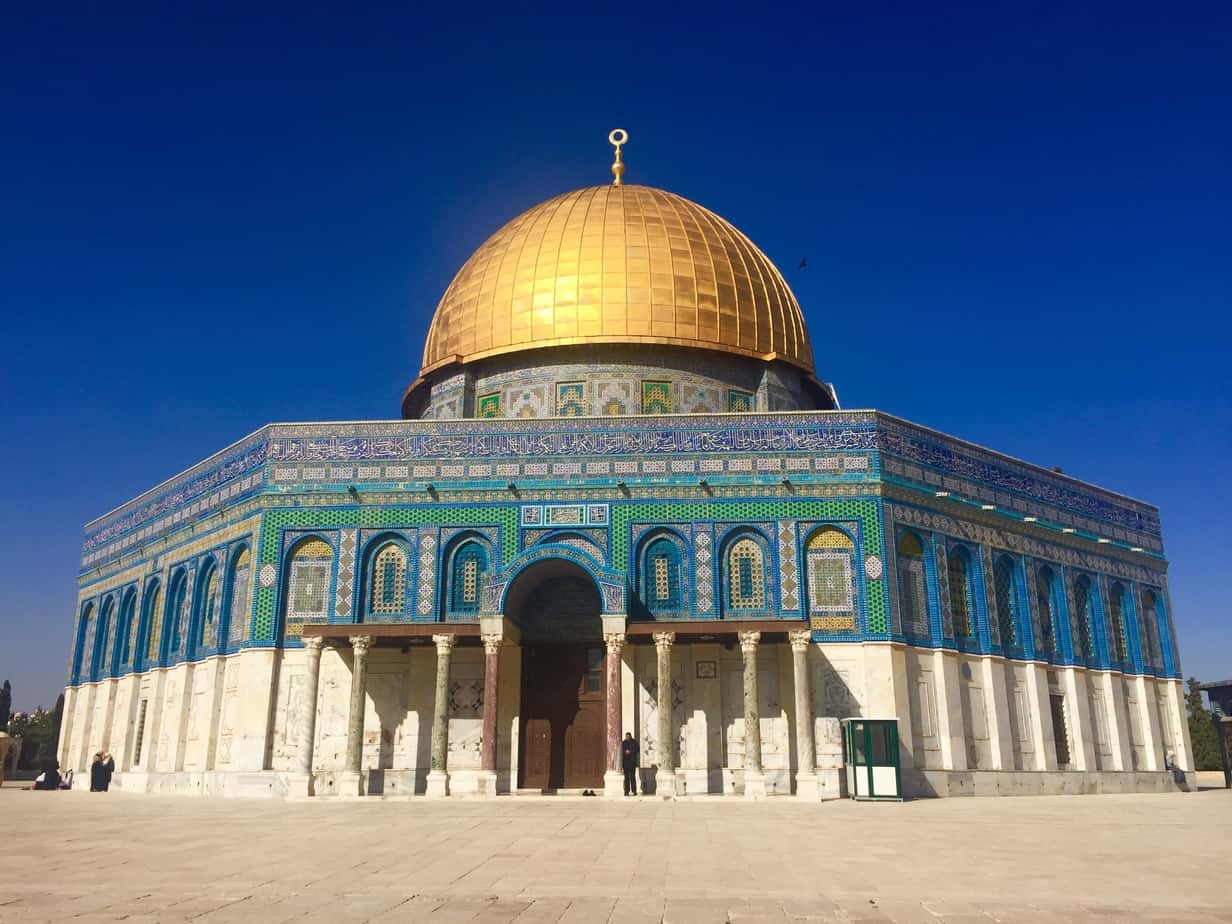
Israel is a great place to visit because of the variety it has to offer tourists – just check out this list of 53 things to do in Israel! From diverse cities and historical and religious sites to relaxing quiet beaches. As a small country, it is also easy to move around a to see a lot in a short space of time. If you have a fortnight to spare, here’s my recommended itinerary for 2 weeks in Israel.
In this guide, you’ll also find a budget breakdown and tips to make your travels in Israel go as smoothly as possible. I’ve become an expert at visiting the country….I married an Israel ( we met while travelling! ) and I’ve now visited multiple times…..I even hiked the Israel National Trail ( and had a book published about my experience ! ). It amazes me that even though the country is so small, I’m still discovering new places each time I return to visit my in-laws. I’m happy to answer questions, use the comments box below.
As part of your preparation to visit Israel, I recommend getting the Lonely Planet travel guide for Israel & the Palestinian Territories .
Only have a week to spare? Then check out my one week Israel itinerary instead.
Itinerary for 2 Weeks in Israel
The best way to get around is to hire a car. This will give you a lot more freedom to visit places along the way. It’s very easy to drive in Israel as the roads are comfortable and the signs in English. If you prefer not to drive though then you can rely on buses (which will get you to all corners of the country) and trains (which run between the major cities but not South into the desert). In the cities and big towns taxis are plentiful and can be found outside train stations or using an app. Always ask for the driver to use the meter!
Here’s what I’d recommend for 14 day Israel itinerary for a first time visitor. If it’s your second visit or you are looking for something a little different, check out my alternative suggestions further below:
3 nights: Tel Aviv
Most visitors spending 2 weeks in Israel will probably start and finish in Tel Aviv as this is where the main international airport is.
Tel Aviv is a small city so 3 nights there should be more than enough for visiting the main sights. You definitely want to make sure you see Old Jaffa, Carmel Market and also the huge stretch of beach that sits right in the city centre. Hiring bikes is a great way to explore the city and to see the park.
I’ve done a few tours in Tel Aviv but the one I would really recommend is the Vegan Tour for something a little different (and also very tasty)….did you know that Tel Aviv is often considered the vegan capital of the world?
From Tel-Aviv, you can also consider joining the Carmel market food tour or the West-Bank tour which I wrote about here: Is the West Bank worth Visiting ?
Where to stay in Tel Aviv: Abraham Hostel Tel Aviv ($120 per night for a double room for 2, including breakfast) Abraham offers both private rooms and also dormitory rooms. It’s a fantastic hostel right in the city centre with a great rooftop bar.
If you are a budget traveller than my guide to visiting Tel Aviv on the cheap will give you some good tips!
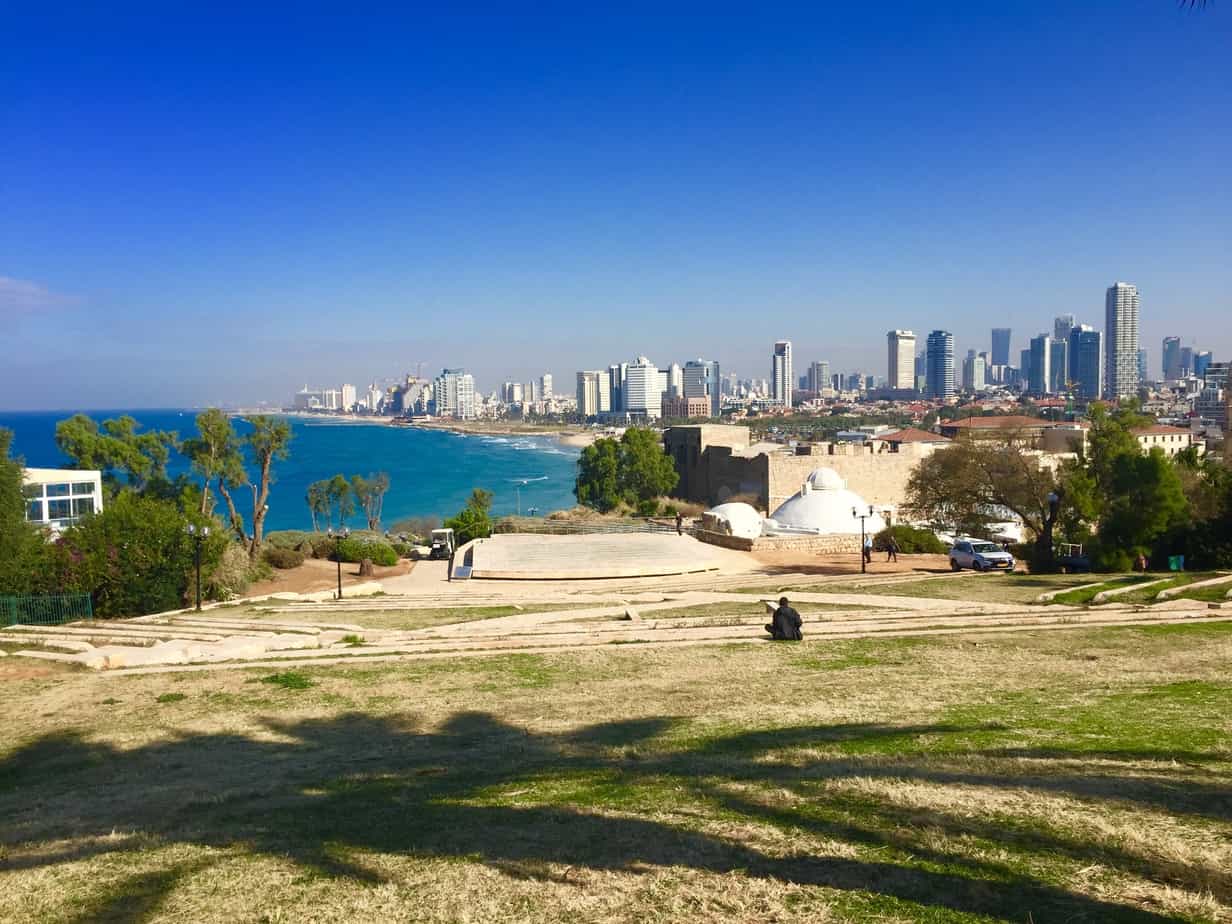
2 nights: Haifa
There isn’t a huge amount worth seeing inside Haifa apart from the Ba’hai Gardens. It is worth using Haifa as a base though to access the great bars and restaurants here.
Sederot Ben Gurion Street is my favourite place for grabbing dinner – it’s got a good atmosphere and an incredible view of the gardens all lit up at night. The best restaurant here by far is Fattoush.
On your way from Tel Aviv to Haifa, stop at Caesarea (it’ll take about an hour to get there from Tel Aviv) to visit the impressive Roman ruins. Then drive to Zichron Ya’akov to grab lunch in the old town (I can also recommend spending an hour looking around the Ramat HaNadiv gardens which are beautiful and free to enter). Then spend the afternoon exploring the unique artist village Ein Hod before driving the 40minutes to Haifa.
From Haifa do a day trip to see Akko – a port town. It’s nice to wander the town here, see the market and to do a boat tour.
Where to stay in Haifa: Bat Galim Boutique Hotel ($100 per night for a double room for 2, including breakfast) A lovely hotel with great character and a brilliant breakfast.
1 night: Sea of Galilee
The Sea of Galilee is a beautiful region but unless you are religious I found the sights here not of huge interest, although definitely worth a quick visit. I’d visit Tiberias and then spend the day doing a day hike to one of the many viewpoints that will allow you to take in the full beauty of the Sea of Galilee. I think Safed/Tzfat is a great place to base yourself as the town has a great atmosphere and some nice restaurants.
Where to stay in the Sea of Galilee: Rosenthalis Safed ($100 per night for a double room for 2, including breakfast) A nice boutique hotel in a town with really lovely character.
4 nights: Jerusalem
Jerusalem is an incredible city with lots to see. On the way to Jerusalem from the Sea of Galilee stop in Nazareth for lunch and to visit the Basilica of the Annunciation. Again, unless you are religious you probably won’t want to spend more than a couple of hours visiting the city.
Use your 3 full days in Jerusalem to explore the many sites in Old City and the surrounding area. There are also 2 great museums worth visiting: The Israel Museum and Yad Vashem.
If you have a limited time in the city you can join a Holy City of Jerusalem tour that covers a lot of my recommendations.
There are lots of restrictions and strict opening times in Jerusalem so you’ll want to use my guide for visiting Jerusalem to make the most of your time.
*IMPORTANT TIP* On Shabbat (Friday evening to Saturday evening) most of Israel closes down. While places in modern cities like Tel Aviv stay open, you’ll find in Jeruselum there will be nothing for you to do so make sure you account for this when you put your itinerary together! Why not join the Shabbat Tour in Jerusalem .
Where to stay in Jerusalem: Abraham Hostel Jerusalem ($130 per night for a double room, including breakfast) Abraham provides a great location and options for both dorm and private rooms.
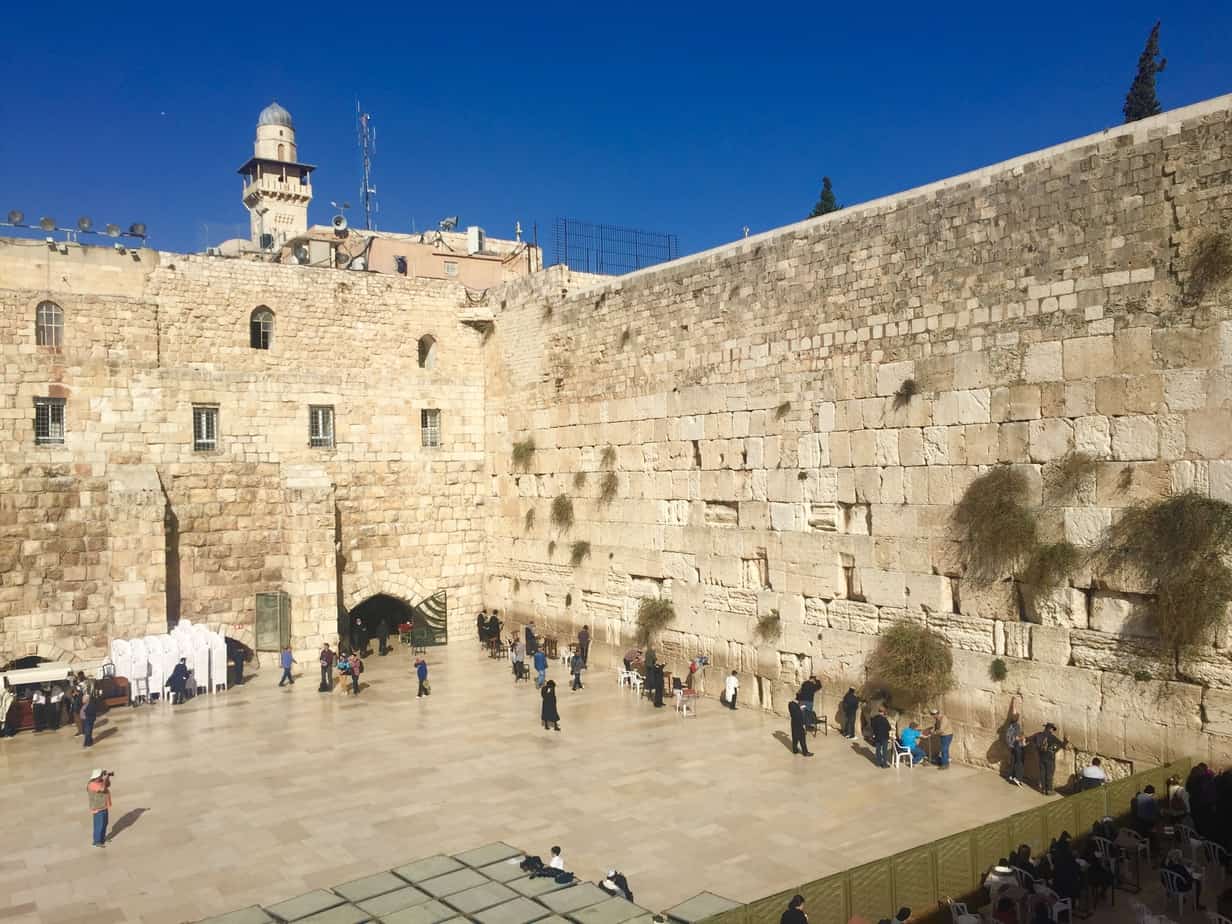
2 nights: Negev desert
Visiting the Negev offers an entirely new perspective on Israel and, really, the best way to experience this side of the country (and the stars at night!) is to stay in a Bedouin camp.
On your way to the Negev stop at Masada and also the Dead Sea for a swim (this can easily be done in half a day). If you can brave the early start, it’s amazing experiencing Masada for sunrise. Note that the Dead Sea has outdoor showers so you can rinse off after your salty float. There are also some nice springs in the area which can be found in Ein Gedi.
Relax and take in the views of the Negev desert. I would also suggest doing a day hike as long as it is not in summer when temperatures really are far too hot. The HaMakhtesh (small crater) offers the best views for a day hike.
Where to stay in the Negev: Kfar Hanokdeim ($240 per night for a double room, including breakfast) This tented Bedouin camp is comfortable and full of character! If you really don’t fancy glamping then alternatively look at staying in Yehelim Boutique Hotel , Arad.
2 weeks in Israel; Itinerary Summary
1 Day : Arrival in Tel Aviv 2 Day: Sightseeing Tel Aviv 3 Day: Sightseeing Tel Aviv 4 Day: Travel to Haifa, visiting Caesarea, Zichron Ya’akov & Ein Hod along the way 5 Day: Day trip from Haifa to Acco 6 Day: Travel to Sea of Galilee, visit the Ba’hai gardens in the morning 7 Day: Sightseeing Sea of Galilee 8 Day: Travel to Jerusalem, stop at Nazareth along the way 9 Day: Sightseeing Jerusalem (the old city) 10 Day: Sightseeing Jerusalem (Yad Vashem, Israel Museum & Mahane Yehuda Market) 11 Day: Sightseeing Jerusalem (the old city & Mount of Olives) 12 Day: Bedouin camp, visit Masada and the Dead Sea along the way 13 Day: Bedouin camp, do a desert day hike 14 Day: Departure day
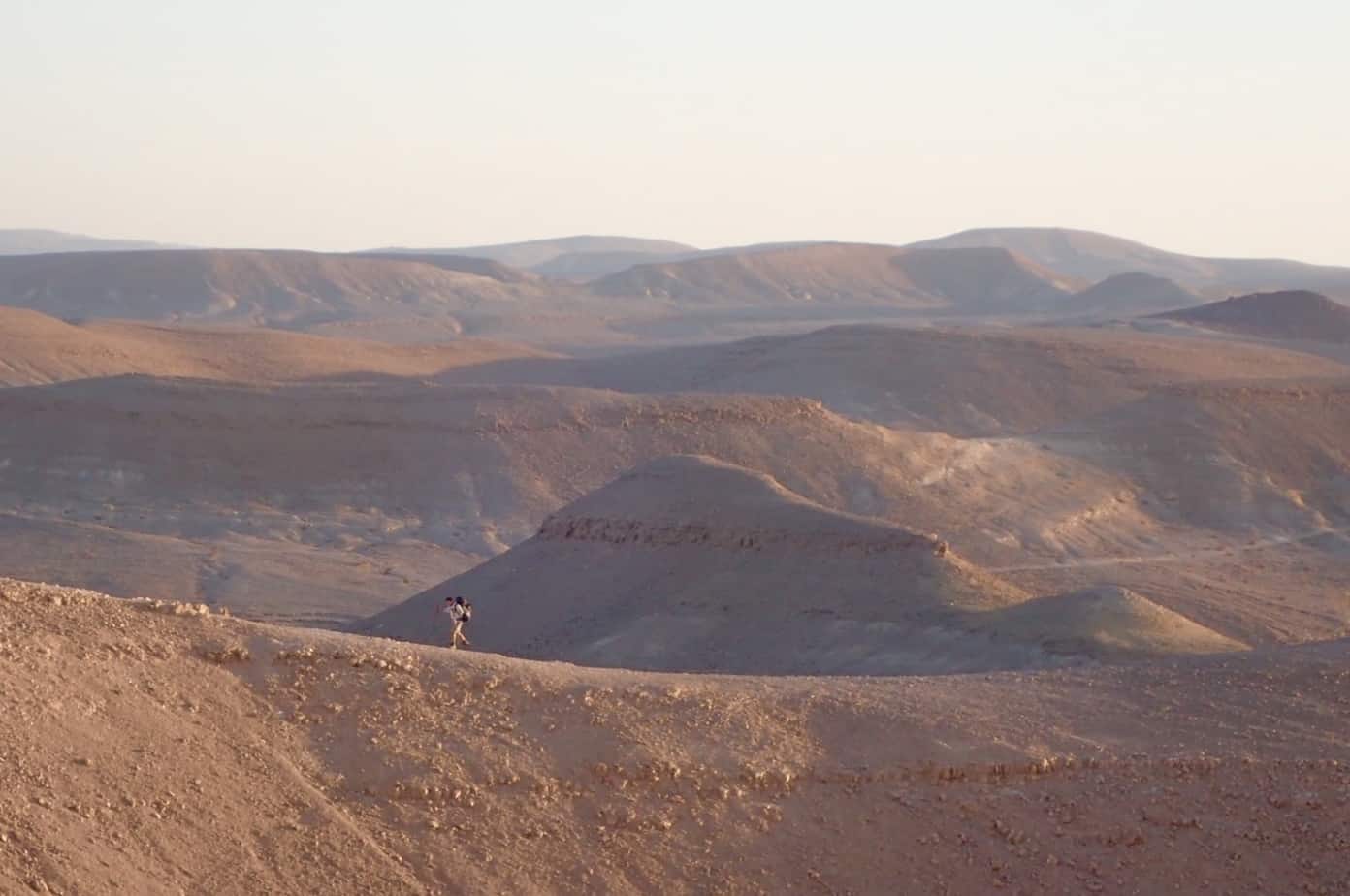
Need some inspiration?
My debut published book – Three Stripes South – shares my story of hiking the full length of the country on the Israel National Trail. Read about the highs and lows of this life-changing adventure exploring Israel and crossing the dangerous Negev desert.
Also check out this short video I made when we did a hiking adventure in the Negev desert as a family. It’ll give you a real sense of the unique nature in Isarel and why you should definitely consider having the Negev on your list if you visit the country!
Alternative ideas for your time in Israel…
This itinerary really will show you the best that Israel has to offer. It fits in a lot but you will also have pockets of time here and there for a lazy morning to catch up on sleep.
If this is your second visit to the country, or you are after something a bit different, check out these alternative ideas:
Want more nature?
If you aren’t a big city person, I would suggest doing 1 less day in Haifa and Jerusalem and staying longer in the north where you can find lots of nature and a slower pace.
There are also lots of hiking options if you enjoy walking. Israel has a National trail which runs the full length of the country !
If you are into hiking take a look at this list of the best hikes in Israel for ideas.
Want some beach time?
Eilat is a bit of a drive to get to as it is right in the South of Israel….but it’s great to visit if you want a bit of beach time or enjoy diving and snorkelling. There are a few ways you could fit in a visit to Eilat – by skipping the stay with the Bedouins or by reducing your time in the North (I’d take out the visit to Akko or the Sea of Galilee. If you don’t stop at Nazareth you could arrive earlier to Jerusalem and easily stay a day or 2 less).
Check out my suggestions for things to do in Eilat . If you are looking for something a little more unusual I can suggest checking out doing a freediving course in Eilat . I put together a short video about my experience freediving in Eilat if it’s something you are considering:
Want to visit Petra?
It is also possible to fit in a busy 2-day tour to Petra. I’d suggest using Abraham Tours (if you stay at Abraham Hostel you get 10% off their tours). It really is worth a visit if you can fit it in. Note that it means a very early start and lots of travelling so it might be too tiring to add onto an already busy schedule.
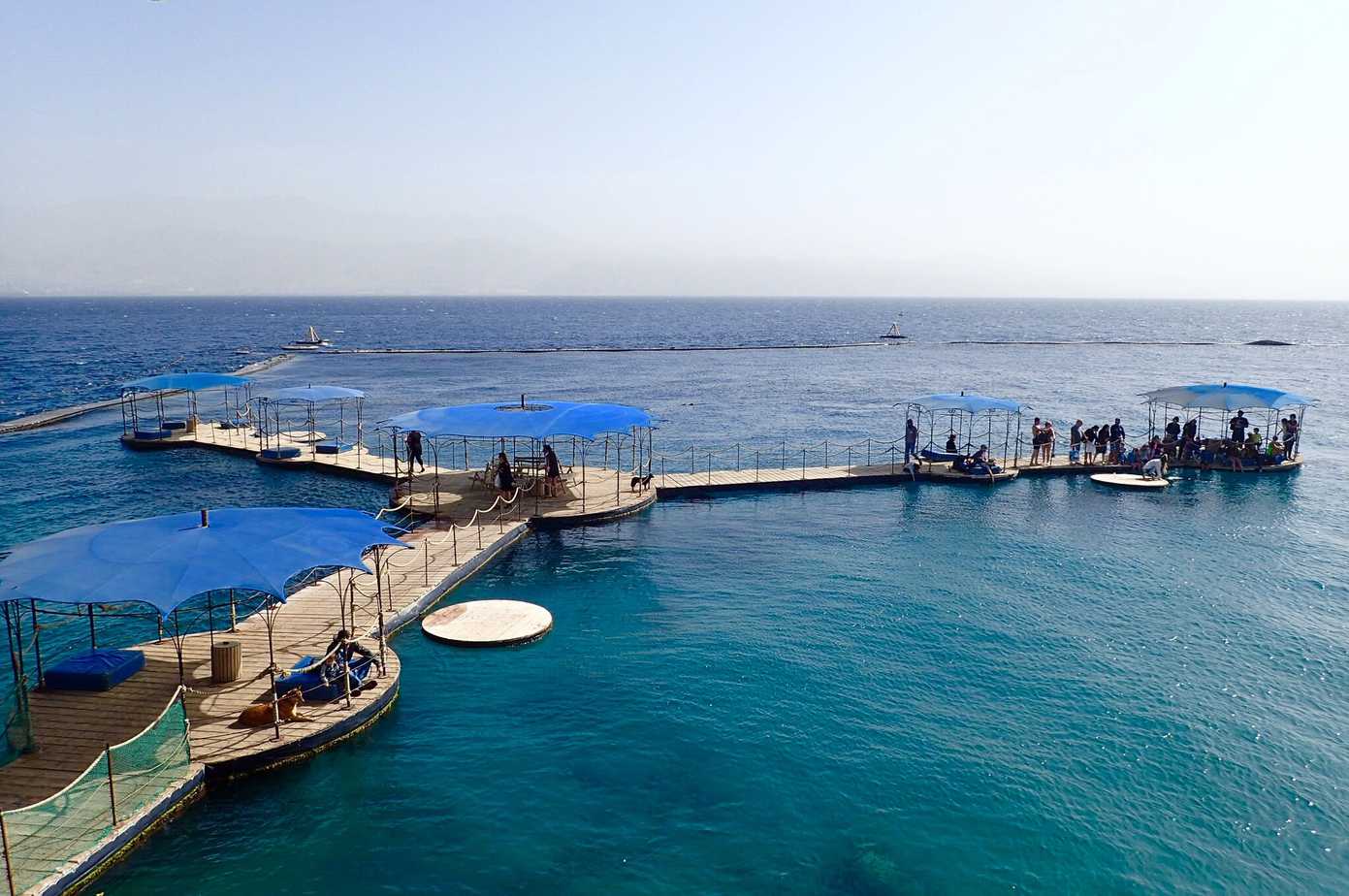
How much does it cost to visit Israel?
Israel can be quite expensive to travel in. Hotels are comparable to UK prices, as is eating out in restaurants and joining tours. The only things that are cheap in the country are street food and public transport.
What’s great though is there are so many free historical and religious sites that budget travellers can see a lot without spending a fortune.
Below is the rough cost per person (based on 2 people sharing a double room) for the 2 week itinerary above. This was based on prices in 2020.
Flights (from London to Tel Aviv return) – $200 Car hire & gas – $180 Accommodation – $900 Food & drink (A dinner meal with a drink costs around 100NIS / $25 although street food is very cheap. A filling falafel costs just 10NIS / $3) – $360 Entry fees (Masada entry, the Israeli Museum, boat tour, bike hire) – $50 Extras (the market souvenirs are hard to ignore!) – $60
TOTAL (with international flights from the UK) – $1,750 TOTAL (without international flights from the UK) – $1,550
You could definitely make this trip much cheaper by staying in more affordable hotels along the way or using Airbnb. If you’ve not used Airbnb before you can click here to get a first time £34 off voucher .
Travel Insurance for Israel
I’ve found Israel to be a very safe place, despite media perceptions and the ongoing conflict (which you almost certainly won’t be aware of while you are travelling there).
Because of the conflict though, flights can be disrupted from time to time so it really is worth making sure you have proper travel insurance.
World Nomads Travel Insurance
It’s important that you have travel insurance for your travels. World Nomads are a travel insurer that I’ve used multiple times before for my adventures. World Nomads covers more than 150 adventure sports and activities and worldwide coverage.
I’m part of World Nomads’ affiliate program (which means I get a small recommenders fee if you choose to use them, at no extra cost to you). Get a quote here .
Top Tips for Travelling in Israel
- Generally, you do not need to worry about dressing conservatively or covering your shoulders and knees (ie, you can wear a bikini on the beach). The exception is if you are visiting a religious site or if you are in Jerusalem
- English is a national language so signs are in English and it is widely spoken
- Try and enjoy as much of the street food as you can. Including Bourekas, Hummus, Falafel, Arabic tea, Baklava and Jachnnun
- If you stay in Abraham hostels in both Tel Aviv and Jerusalem you can 10% off your stay and off their tours (which are very good!). They also offer a shuttle between their hostels
- In markets, it is common to haggle on the price given
- When using taxis ask them to use the meter
- If using buses in the cities payment is often done using a machine that doesn’t give change so make sure you have change
For a bit of final inspiration, watch this short film which will give you a flavour of what to expect when you visit:
I hope this 2 weeks Isarel itinerary guide helpful. If you have any questions, please ask in the comments box below.
You can stay up to date with my adventures and advice on Facebook and Instagram . Or you can subscribe to my YouTube channel . I give all my advice for free on my website. If you want to say thanks, you can buy me a coffee !
* Any women reading this? * I founded a women’s adventure community called Love Her Wild. Check out our private Facebook page and see what adventures we have coming up .

- Follow Follow
14 Comments
I’m from Israel, and when I saw the title of your post I got curious. As a local I must say – great work! It’s comprehensive and detailed and I’m sure many future visitors will find it very useful.
Such kind words…thank you 🙂
Hi Bex. Thanks for the informative post. I’m planning to travel solo (female) in October. I notice the prices for hostel accommodation seems quite high in comparison to Europe and Asia. Are these typical prices? For trip planning, do I need to consider $130USD per night? Thanks for your insight. Safe travels.
Hi Michele…no worries 🙂 Accommodation in Israel is expensive, especially in Tel Aviv and Jerusalem. Do you mean $130 to include all activities or just accommodation? I’d really recommend checking out Airbnb options as these are usually the cheapest available!
Great overview of what to see and do in Israel. My wife and I are planning 10 days in Israel & Jordan (I know, not long enough!) so this is definitely a good guide for us to leverage off. What’s the current process with regards to crossing from Israel to Jordan and then back into Israel? Exit fees, entry visas, best place to cross the border, etc.
Thanks! Happy it is of help. For such a short amount of time I would recommend taking a tour from Jerusalem to Jordan. Check out Abraham Tours! I loved visiting Petra and Wadi Rum but would personally skip visiting anywhere else in Jordan and focus on going to places in Israel (Tel Aviv, Jerusalem, Masada and the Dead Sea) as I think they offer more for visitors. I’d suggest the 2-day tour to Petra. When you get to Petra ditch your tour guide and go exploring on your own (I’d walk straight to the Monastery and then make your way back to the entrance at your own pace….this way you’ll lose most of the crowds….don’t be tempted to take a horse as they are massively mistreated). Going on a tour means they then sort out the border crossing which makes it all a lot smoother. The best place to cross is in Eilat. Visa’s depend on your passport but I’ve heard lots of people do it without problems. Hope that helps!
wow! planning a trip and this is one of the first suggestions i’ve read and i love it! Thank you! how about with 20 days? maybe a 3 day petra tour? and more beduoin glamping?
Thanks…glad it’s of help. For 20 days I’d definitely try fit in a tour of Petra from Jerusalem! If you are looking for something more adventurous then glamping in the desert and hiking is a good option (although you can also stay with Bedouins as part of the Petra tour so you probably won’t want to do it in both Israel and Jordan). The North has lots to offer – visiting Acco, the Sea of Galilee, Haifa and Zicron Yaakov – and all fairly close together. There’s also some great hikes around the Sea of Galilee.
this is great. I will be visiting during new years. I will be there for 2 weeks. Do you think I can skip Sea of Galilee and spend one more day in Jerusalem? Also is it a good idea to stay in Bedouins and not at Eilat ?
That’ll be fun! I think skipping the Sea of Galilee and having an extra night in Jerusalem is a good idea. If you like beaches and diving then go for Eilat. If you like nature and culture then go for the bedouin camp. Personally I think staying with the Bedouins is a more unique experience as Eilat is just like any seaside resort in the world!
It is very useful for my travelling plan to Israel next month! Thank you so much for your great work! If I want to travel to Petra by myself, do you know which cities provide direct coach to?
You are welcome Lea! It’s not easy to get to Petra from Israel. You’ll need to catch a bus to Eilat (from any of the cities in Israel). Here you can cross the border into Jordan. You’ll need a taxi to take you from the bus station to the border. Once into Jordan, there are then buses that will take you to Petra. I had a friend who did it who said it was long and a bit of an adventure but not too bad. The easier option is to go with a tour company from Israel and they’ll sort the transport and make sure you cross the border without issues. Have a great time in both countries!!
This is GREAT. What would you recommend as best way to get to/from Eilat? I’ll be traveling solo w/luggage. It will be a Th-Sun and the end of my two week journey, before I return to TA to head back to states.
Glad it’s helpful! I’ve got the bus down to Eilat many times. They are regular, cheap and really easy to use. Alternatively, you could hire a car but this will be more pricey. Eilat is small so you don’t need a car to get around – I just walk and occasionally use buses or taxis if I want to explore further afield 🙂
Submit a Comment Cancel reply
Your email address will not be published. Required fields are marked *
Submit Comment
Related Posts
![fit for travel israel 11 Best Coach Trips from South Wales [2024]](https://www.theordinaryadventurer.com/wp-content/uploads/2024/04/hobi-industri-eGA5dZG4sCw-unsplash-400x250.jpg)
11 Best Coach Trips from South Wales [2024]
Embark on a journey of discovery from the scenic expanse of South Wales with our guide to the 10 Best Coach Day Trips from South Wales, UK. This...
![fit for travel israel 8 Best Dinner, Bed and Breakfast Deals Norfolk [2024]](https://www.theordinaryadventurer.com/wp-content/uploads/2024/04/view-over-church-400x250.jpg)
8 Best Dinner, Bed and Breakfast Deals Norfolk [2024]
This Best Dinner, Bed and Breakfast Deals Norfolk guide uncovers the premier selections in what is undeniably one of the UK's most picturesque and...
![fit for travel israel 8 Best Dinner, Bed and Breakfast Deals Cotswold [2024]](https://www.theordinaryadventurer.com/wp-content/uploads/2024/04/eu-assets.simpleview-europe-400x250.jpg)
8 Best Dinner, Bed and Breakfast Deals Cotswold [2024]
This Dinner, Bed, and Breakfast Deals Cotswold guide unveils the top choices in what’s one of my most beloved areas in the UK! Nestled in the heart...

Adventures, updates and tips to your inbox!
Join over 3,500+ others and subscribe to my newsletter., you have successfully subscribed.
By subscribing, you consent to the processing of your personal data in according with our privacy policy - link in the footer.

21 Top Israel Packing List Items for 2024 + What to Wear & NOT to Bring

Israel is renowned throughout the world as “The Holy Land” and is one of the planet’s foremost religious, spiritual, and cultural centers. In a westernized country with cosmopolitan Tel Aviv at its heart, trendy style is a must, though much of the country tends to dress more casually.
With this type of cultural and religious diversity, it can be hard to know what to pack for your visit. Check out my comprehensive Israel Packing List, which will also touch on what to wear in Israel, what NOT to bring, and other FAQs.
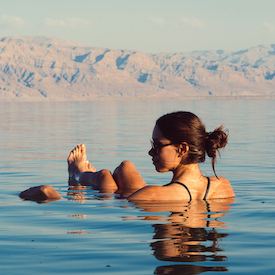
What to Pack for Israel - 21 Essentials
1. israel power adapter.
In Israel, the power outlets require 230V/50Hz, and type C and H power sockets, which is different from what we use in the U.S. Though some European plugs will fit into Israeli outlets, it’s best to use an international power adapter that works in nearly every country. With a built-in fuse protector, your devices are much less likely to fail due to a power surge or shoddy outlet. Best of all, it comes with a lifetime replacement guarantee!
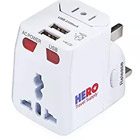
View on Amazon.com ➜
2. Pashmina Shawl/Scarf
A pashmina scarf or shawl will be endlessly useful when traveling in Israel. It can be used for layering, as a head or shoulder covering for entering holy sites, tied into a skirt to cover your knees, or as a swimsuit cover-up at the beach. Versatile, stylish, portable, and light and breezy, you won’t regret bringing one of these on your travels.

3. Virtual Private Network (VPN)
A reliable VPN is essential for keeping your sensitive data private when traveling. You won’t want to risk having information like your credit card number, passwords, or identity stolen if the WiFi network you’re using isn’t properly protected.
Connecting to the WiFi in places like cafes, airports, hotels, or Airbnbs can leave you vulnerable to hackers. Using a VPN is an easy and inexpensive way to ensure your safety. Additionally, you can use a VPN to visit popular websites from your home country if they are not accessible abroad.

View NordVPN.com Options ➜
4. Neck Wallet
Whenever you travel to a big city in Israel or a particularly crowded, touristy destination – it is imperative that you protect yourself against the risk of pickpockets. The best way to avoid being the target of petty theft is with a quality neck wallet like this one. It is large enough to hold your valuables, such as phone, ATM cards, cash, phones, and passports, and has separate organized pouches so you can easily access your belongings. This neck wallet can also be tucked under your clothing for maximum protection.
Available on HeroTravelSupply.com with an exclusive 15% discount using the coupon code “HERO” .
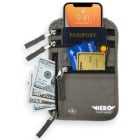
Or view on Amazon.com ➜
5. Jet Lag Relief
When traveling to a faraway destination like Israel, jet lag is almost always unavoidable. We swear by this all-natural, homeopathic remedy which helps to prevent and relieve the symptoms of jet lag and international travel, allowing you to skip a miserable first couple of hours or days in your destination. When you’re enjoying your first days abroad to the fullest, you won’t regret having packed this preventative measure.

6. Travel Insurance for Israel
Travel is rarely risk-free. As of May 2023, Israel does not require travel insurance by law, but it is still highly recommended. One of the main reasons people decide to add insurance is that they’ve already invested in their trip and don’t want to pay out-of-pocket for common emergencies like cancellations, theft, baggage loss, and medical care. One of our co-workers suffered from dehydration in the Middle East and had to go to the hospital – he paid a fortune because his domestic provider didn’t cover his international hospital bills.
We recommend Faye Travel Insurance to all our friends because they are revolutionizing the industry. Whereas most providers force you to fill out heaps of paperwork and cross your fingers hoping for a check – Faye wires you the money through their app when you need it most. I wish I would’ve had it in cases where the insurance paperwork was too daunting to tackle. It’s great peace of mind against paying off potentially six-figure bills.

Get a quote in less than 60 seconds with Faye ➜
7. Packing Cubes
If you want to become the savvy traveler you always dreamt of being, start using packing cubes! These specially-designed packing cases will help keep you organized while traveling. Color-coded and with space on the outside to label the contents of each cube (tops, bottoms, essentials, etc.) , you will never again feel overwhelmed trying to find what you packed. These cubes also come with separate cases to store your dirty laundry so as not to mix them with your clean clothing items.
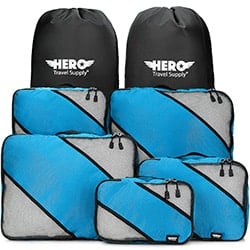
8. TSA-Approved Luggage Locks
Items are stolen from luggage daily in airports and at crowded attractions. Don’t allow your memories of Israel to be tarnished by a preventable crime like pickpocketing. Secure your valuables with these luggage locks that can be placed on suitcases, backpacks, purses, lockers, and any other creative base you can dream up. This set is our go-to because they’re TSA-approved for easy security checks and 10x harder to crack than a typical 3-digit lock.
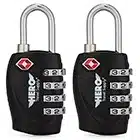
9. Filtered Water Bottle
Israel is a desert with summer temps reaching the high 90’s (32C), so you will need to stay well-hydrated. The Israeli water supply is generally clean but there is noticeable scarcity, so bottled water is overpriced since they are a precious good here. Bring your own refillable water bottle to have autonomy over your water supply and remove chlorine, microplastics, sediment, viruses, and harmful bacteria. It’s a little pricey, but you will save money and have peace of mind by having your own purification system.
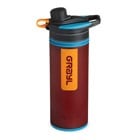
10. Discounted Tickets to Israel Attractions
Take a life-changing trip to Jerusalem and Bethlehem , soak away your troubles in the salty dead sea , and discover the best of Tel Aviv . From old city to new, Get Your Guide is our favorite resource for affordable and well-planned excursions. They also offer skip-the-line and discounted tours so you don’t have to spend all day in line waiting for overpriced tickets!
For something magical, we recommend a walking tour through the Baha’i Gardens in Haifa . And for something more low-key, a street art tour through Florentin is very memorable. There are also daytrips to one of the most famous archeological sites in the world, Petra , a city (and work of art) dating back to 300 B.C.! If you have the time, one of my husband’s favorite tours was visiting the coastal plains of Nazareth and The Sea of Galilee .

See all Israel attractions at GetYourGuide.com ➜
11. Long Skirt
As Israel is one of the world’s most significant religious centers, women should be sure to pack a long skirt or dress which will be essential when visiting holy or religious sites. In religious neighborhoods throughout the country, particularly in Jerusalem, modesty is key. As Israel can get quite hot, especially during the summer, you will want to have a breezy, lightweight skirt to keep cool and covered.
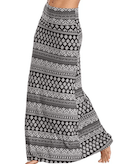
12. Quick-Dry Travel Towel
For so many reasons, one of the most useful items to have as a traveler is a quick-dry towel. These can be used if your accommodation doesn’t offer a towel, if the one you’re offered isn’t clean, or if you decide to take a spontaneous dip in the Mediterranean Sea. They dry 10x faster than cotton and are light as a feather, MUCH easier to carry around than heavy, fluffy hotel towels (and more absorbent).
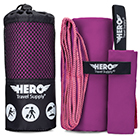
13. Activated Charcoal (Food Poisoning Quick-Fix)
Israeli cuisine is absolutely delicious and you certainly will not want to miss out. That said, as your body is unused to the foods and germs from this region, upset stomach, travelers diarrhea, or accidental food poisoning are always possibilities. Activated charcoal caps will help to quickly absorb and expel the toxins in your system and will have you back on your feet in no time. No one wants to spend days of their vacation with their head in the toilet!

14. Daypack/Backpack
Because Israel is such a compact country, you will likely spend long days exploring, filled with diverse activities that range from visiting museums and holy sites to hiking in the desert to swimming in the Dead Sea. For days like these, you will want to have a reliable daypack to carry a good supply of water as well as your outfit changes. This pack by Osprey is lightweight and comes with a free replacement or repair should it become damaged.

15. Lipstick-Sized Portable Charger
Another incomparably useful travel item is a lipstick-sized portable charger. If you’re relying on your smartphone to navigate or use as a camera and it runs out of battery in an inconvenient place, you may find yourself in a bit of a bind. A small, easy-to-carry portable charger can be a lifesaver when you really need it.

16. Comfortable Walking Flats
Anticipate a lot of walking while in Israel, especially in cities like Jerusalem and Tel Aviv. You will want stylish, comfortable shoes that look appropriate with your outfit, especially when you enter religious sites like churches or synagogues. These versatile flats can also be worn during nights out or to add a fun accent to your outfit, easily dressed up or down with many colors and patterns to choose from

17. Cooling Towels
Cooling towels are a magical little invention that has changed our lives for the better! Anytime we travel to warm destinations, we bring these along – simply add water, wring it out, and the towel will automatically become 20-30 degrees chillier than the outside air temperature (for up to an hour, then just add more water).
When I say game-changer, I mean they’ve literally altered how long we can stay outside and enjoy the excursions. I wrap these around my shoulders, neck, or put it under my hat for immediate, sweet relief.

18. Packable “Just in Case” Bag
This “just in case” bag is for those inevitable purchases you make while traveling. Save yourself carry-on fees with this compact case that can count as a personal item bag and fits neatly under the seat of a plane. When folded on the way to Israel, it’s about the size of a sandwich. On the way home, you can fill it with souvenirs to keep your memories of Israel alive; these also make fantastic gifts.
Israel’s best locally-made goods include olive oil, tahini, date honey, Armenian ceramics, skincare products made from the Dead Sea, diamonds, antiques, quilts, metal-lace, vibrant artwork, and more.
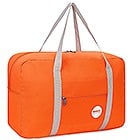
19. Electrolytes
As someone who is prone to dehydration, bringing electrolytes has saved me on numerous occasions. Israel can be hot, especially during the summer, and you will likely be spending a lot of time walking around outdoors. Be sure to remain hydrated by adding electrolytes to your water to rapidly rehydrate and give your body the extra boost it needs. This tasteless formula also offers the benefits of potassium, zinc, and magnesium.

20. Mesh No-Slip Water Shoes
Many tourists do not come properly prepared for the diverse terrains of Israel. Regular hiking shoes will get wet and become heavy and soggy, so you will absolutely need a pair of water shoes to explore. Consider that the Dead Sea’s thick crystals of salt that can be painful on the feet, and many common outdoor activities involve water (like Hezekiah’s Tunnel, The Sea of Galilee, and the oasis of Ein Gedi) . We like this pair because they’re lightweight and made of breathable mesh that dry faster, plus they have high-traction soles to tackle slippery spots.

21. Gorgeous Outfit
Israelis are notoriously trendy and in big cities like Tel Aviv or Haifa, you’ll want to fit in. For fun nights out or higher-end restaurants, be prepared with a killer, hassle-free outfit! I love this sexy jumpsuit because it looks great on a variety of different body types, doesn’t wrinkle easily, and is relatively inexpensive.

Other Israel Packing List Items Not to Forget
- Travel Insurance
- Hiking Boots Women's
- Hiking Boots Men's
- Steripod Toothbrush Cover
- Lip Balm with SPF
- Protein Bars
- Dramamine Non-Drowsy
- Leather Jacket
- Travel Hair Dryer
- Makeup Remover Cleansing Wipes
- Travel-Size Perfume
- Travel-Size Cologne
- Evening Purse
- Separate Small Change Purse
- Hanging Toiletry Case
- TSA Approved Travel-Size Bottles
- Dental Floss
- Voltage Adapter For Large Appliances
- Travel Neck Pillow
- Travel Sheet
- Compression Flight Socks
- Lightweight Pajamas Women's
- Lightweight Pajamas Men's
- Contact Solution
- Alarm Clock
- Noise Cancelling Headphones
- Deodorant Women's
- Deodorant Men's
- Swimsuit Women's
- Swimsuit Men's
- Over the Counter Medications
- Passport Photos
- Hard Copies of Vital Documents
What to Wear in Israel

Israeli women tend to be very fashionable, typically opting for chic, westernized clothing. Pack stylish outfits for evenings out in Tel Aviv and don’t forget to accessorize! You’ll want to bring swimsuits and warm-weather clothing for the beach, and bikinis, shorts, and tank tops are completely acceptable. Remember to bring plenty of lightweight, conservative options to keep your knees, shoulders, and chest covered when entering holy sites like synagogues, mosques, and churches. Long skirts, maxi dresses, and flowing harem pants are all great options to keep you cool and covered when visiting these types of sites.
Be sure to bring comfortable walking shoes, like the stylish flats we’ve listed here, that will blend in with your outfit and won’t kill your feet after a long day of exploring. You should also prepare for hiking excursions by bringing lightweight hiking boots and athletic clothing, as accessing some of the best parts of the country requires a bit of a trek! What should MEN wear in Israel? – (Click to expand) Below is a sample men’s clothing list. (All items link to Amazon.com for your convenience).

Packing for the Seasons in Israel
Though it is a small country, Israel’s weather does vary quite a bit from north to south. However, the country has a Mediterranean climate, making for an overall mild yearly weather forecast. If you plan to visit destinations in the south, such as Eilat or the Dead Sea, prepare for warm, humid weather year-round. However, the rest of the country typically enjoys hot, dry summers and mild, wet winters, with spring and autumn falling somewhere in between.
SPRING – March, April, May:
Spring temperatures range between 60 to 70°F (15 to 20°C) during the day, though evenings will dip down to the 40s-50s°F (5-10°C). Prepare for a bit of rain during the spring, but nothing too drastic, and areas around the Red and Dead Seas are warm year-round. Spring is a lovely time to visit Israel, as it isn’t too hot to spend the day sightseeing or trekking through the countryside.
For Spring in Israel, bring a good windproof umbrella and a lightweight jacket for cooler evenings. Prepare for typically sunny days with trendy sunglasses and if you plan to head south, a stylish swimsuit and cover-up to enjoy the country’s many seas.
SUMMER – June, July, August, part of September:
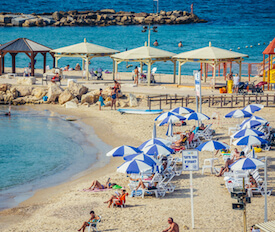
FALL – September, October, November:
Fall weather in Israel is much like that of spring, with temperatures ranging between 60 to 70°F (15 to 20°C) during the day and dropping to the 40s-50s°F (5-10°C) at night. Prepare for a bit of rain but nothing too unpleasant, and note that the southernmost parts of the country are warm year-round.
To stay comfortable when visiting Israel in the fall, be sure to bring a lightweight jacket for chilly evenings, as well as a good windproof umbrella in case of rain. Plan for typically mild weather and sunny days with a good pair of sunglasses and comfortable walking shoes to take advantage of the pleasing temperatures.
WINTER – December, January, February, part of March:

Beaches – Israel is located along the Mediterranean coast and is brimming with seas and bodies of water throughout the country. You will likely have many opportunities to swim and relax at the beach, especially if you visit during summer. Bikinis and short, European-style board shorts for men are the norm throughout the country, though you should also bring a cover-up to wear if you plan to enter restaurants or beach bars along the Tel Aviv coast.
Holy Sites – Israel isn’t referred to as “The Holy Land” for nothing! The country is filled with significant historical, religious, and cultural sites dating back to the beginning of time. You are likely to encounter the typical places of worship such as synagogues, churches, and mosques, as well as important religious sites such as the Wailing Wall in Jerusalem. Women will want to bring a long skirt or dress and men will need pants or long shorts to cover the knees, though both men and women should be sure to have their chest, knees, and shoulders covered when visiting any of these types of holy destinations.
Shabbat Meal – Israel tends to be pretty casual and laid back as far as style goes, but if you are attending a Shabbat dinner, the traditional Friday night meal, you will want to make sure you look nice but not overly fancy. Men should go with a nice collared shirt and shorts or pants, and women should bring a skirt or dress.
Nightlife – Though the culture in Israel is typically laid back and casual, in the bigger cities, particularly in Tel Aviv, nightclubs and upscale bars are incredibly popular for nights out. Even Jerusalem has its fair share of nightlife options, though you won’t need to dress up quite as much as you would in Jaffa or Tel Aviv. Women should wear a stylish outfit paired with heels or nice sandals, weather permitting, and men should have a collared shirt with acceptable footwear including nice loafers or leather shoes, but not sneakers.
Hiking – Some of the most popular pastimes in Israel are hiking and outdoor activities, so you’ll want to ensure you’re comfortable and prepared to face the elements. In the summer, when visiting destinations like Masada which can be especially hot during the day, it’s important to bring sun protection in the form of a hat, sunscreen, and covered shoulders to protect from the sun’s intense rays. The hiking dress code throughout the country is casual, with people sporting typical athletic wear such as leggings, shorts, and T-shirts. A popular outdoor activity is camping or “glamping” in the Negev Desert at night which can be cold, so prepare with a lightweight fleece jacket and long pants.
What NOT to Bring to Israel
1. don’t pack a winter coat.
Israel boasts a mild Mediterranean climate which keeps temperatures pretty moderate year-round. Even in the heart of winter, snow is rare, and you will likely be comfortable with no more than a medium-weight jacket and perhaps some gloves. In any of the other seasons, a lightweight jacket or warm sweater will do and in summer, no jacket will be necessary at all.
2. DON’T BRING flashy items or expensive jewelry
The last thing you want to do while traveling in any destination is draw unwanted attention to yourself as a tourist and end up being the target of pickpocketing or scamming. Leave flashy or expensive-looking jewelry at home and perhaps opt to purchase local, inexpensive items instead.
3. DON’T PACK too much stuff
Israel is one of those fascinating countries where you’ll likely want to do a lot of shopping at local markets and bazaars. As souvenirs are largely inexpensive (after a bit of bargaining), you will want to leave space in your suitcase to bring home your well-earned treasures! Bring fewer clothing items that have more versatile use to maximize the space in your luggage.
4. DON’T TAKE an umbrella
If you are visiting Israel in the summer, it likely won’t rain as much of the country is desert. An umbrella will only take up space in your suitcase but will likely not be used. However, if you plan to visit during the other seasons, you may want to rethink bringing one as it is more likely to rain.
5. DON’T PACK unnecessary valuables
You won’t want to risk having your valuable or sentimental items lost or stolen while in Israel. Markets and important religious sites can be very crowded so you won’t want to make yourself an easy target for pickpockets. Only bring what you truly need and be sure to lock up extra cash or credit cards in your hotel’s safe.
6. DON’T BRING heavy books
Bringing books while traveling can weigh you down and make for a bulky suitcase. Opting for a Kindle instead will help to avoid the difficulty of lugging your belongings from place to place, which you will be doing a lot of as you make your way through Israel’s many exciting destinations.
FAQs about Traveling in Israel
1. is the tap water safe to drink in israel.
Yes, tap water in Israel is safe and drinkable nearly everywhere in Israel. That said, your body may not be used to certain minerals in the water, which may upset your stomach. If you are concerned, large plastic water bottles are sold nearly everywhere throughout the country and are very inexpensive. We recommend bringing your own water bottle with a built-in filter to ensure the purest hydration.
2. What language is spoken in Israel?

Hebrew is the main language spoken in Israel, though English and Arabic are also widely spoken and understood. Israel also has a large Russian population and attracts visitors from around the world, so it is not uncommon to hear a wide variety of languages being spoken throughout the country.
3. Is it safe to visit Israel?
Yes, it is safe to visit Israel. Though situated in a precarious position amongst unfriendly countries in the Middle East, Israeli security and the military are some of the best in the world, which has developed out of necessity. Though you should feel safe in Israel, it is always important to take regular precautions as you would when traveling anywhere, which includes not walking alone at night, avoiding demonstrations and protests, and always being conscious of your surroundings.
4. What is the best time of year to visit Israel?

Though summertime in Israel attracts a large number of visitors, the best time to visit the country would be in the spring or fall months when temperatures are pleasantly mild and there are fewer tourists. Destinations like the Dead Sea and Eilat are warm year-round and the rest of the country enjoys moderate temperatures throughout the year, so you will be comfortable visiting at any time.
5. Do I need to tip in restaurants in Israel?
Tipping is expected in Israel. In restaurants, tipping 10-15% of your bill is standard based on the quality of the service you received, with 12% typically being the norm. It is not expected, however, to tip taxi drivers while in the country.
6. Is Israel safe for women and minority groups?

Israel is a safe country for women and minority groups, including the LGBTQ community. Tel Aviv boasts the largest Gay Pride Parade in the Middle East and Asia and is one of the largest Pride celebrations in the world. Israel has been ranked as one of the world’s safest countries for women and female travelers and is akin to any other Western country.
Women may still experience their share of catcalling or receive unwanted attention in that regard but overall should not feel unsafe when visiting Israel. Note, however, that women will be expected to cover up when visiting holy sites or religious neighborhoods out of respect for the culture.
7. Do I need a visa to visit Israel?
U.S. citizens do NOT need a visa when visiting Israel for 90 days or less, though your passport must be valid for up to six months from your departure date from the country. European and Australian citizens do not require a visa to enter Israel, though you should always double-check before booking your trip if you are unsure.
For more information on visa requirements and vaccine restrictions, visit USEmbassy.gov , updated by the U.S. embassy in Israel.
8. What’s the best way to get around Israel?

Israel is a small but compact country with much to experience from north to south. By car, the entire length of the country can be crossed in around nine hours, though you will likely want to stop along the way. Israel has an excellent train and bus system that will bring you quickly and easily through the majority of the country, with frequent departure times and typically inexpensive tickets. The public bus system is also a popular method of transportation in the major cities, though Jerusalem and Tel Aviv are largely walkable.
9. What are Israel’s off-the-beaten-path destinations?
If you plan to spend more time in Israel, or if you have been there before, you may be searching for off-the-beaten-path destinations to explore. Consider visiting Safed, also known as the “Blue City,” an ancient town perched high up on a mountain renowned for the mystical study of Kabbalah. In Jerusalem, take a food tour through the ultra-religious Jewish neighborhood of Mea Shearim, though make sure you’re properly covered from head to toe before entering.
Finally, if you’re feeling adventurous, plan a trip to Hebron, the fascinating yet controversial city in the West Bank. Hebron is home to the Cave of the Patriarchs which holds significant religious and cultural importance for Jews and Muslims alike. If you choose to visit Hebron, be sure to organize a tour that will get you in and out safely.
10. How can I save money while traveling in Israel?

There are several ways to conserve your money when traveling in Israel. Opt for public transit to get around rather than taking taxis, as the bus and train systems throughout the country are efficient and relatively cheap. Try street food instead of sitting down for a more expensive formal meal. Typical street food in Israel includes delicacies like falafel, hummus, shawarma, and pizza, and is delicious, inexpensive, and safe to eat.
Israel can get hot, especially in the summer, so you’ll need to drink a lot of water. The tap water in the majority of the country is safe to drink, so consider bringing a reusable water bottle and refilling it rather than buying endless single-use plastic water bottles.
11. What are the top things to do in Israel?
Though a relatively small country, Israel is incredibly eclectic and boasts a variety of religious, historical, and cultural sites as well as unique beaches, spectacular hiking, cosmopolitan cities, and world-class museums. Don’t miss visiting the popular sites, such as Jerusalem’s infamous Old City, Tel Aviv, the Dead Sea, and Masada. Be sure to make time for the fascinating Bedouin tents in the Negev Desert, the Golan Heights and the Galilee in the north, and beachy Eilat on the Red Sea at Israel’s southernmost tip.
12. What types of foods are eaten in Israel?

Israelis eat a lot of typical Mediterranean cuisine, including dishes like falafel, hummus, shakshuka, and shawarma, as well as typical Jewish cultural cuisine from around the world. You are likely to encounter traditional Jewish delicacies such as challah bread, rugelach, kugel, halva, and many fresh fruits and vegetables native to the region, namely pomegranates, figs, and dates. Also, ice cream, pizza, and french fries are unlikely but incredibly popular foods you’ll find almost everywhere in Israel.

Lyric Fergusson
This website uses cookies to ensure you get the best experience on our website. Learn more

Information on how to stay safe and healthy abroad. About us.
Travel health advice.
- Before You Travel
- Yellow Fever
Current popular advice pages:
- Staying Healthy if Travelling Abroad this Summer
- Travelling Abroad to Attend Festivals and Other Gatherings
- Mosquito Bite Avoidance
- Food and Water Precautions

What Plug Adapter Do You Need for Israel?
- By Traveling Anne
- February 29, 2020
- In Israel Travel Advice
24 Comments
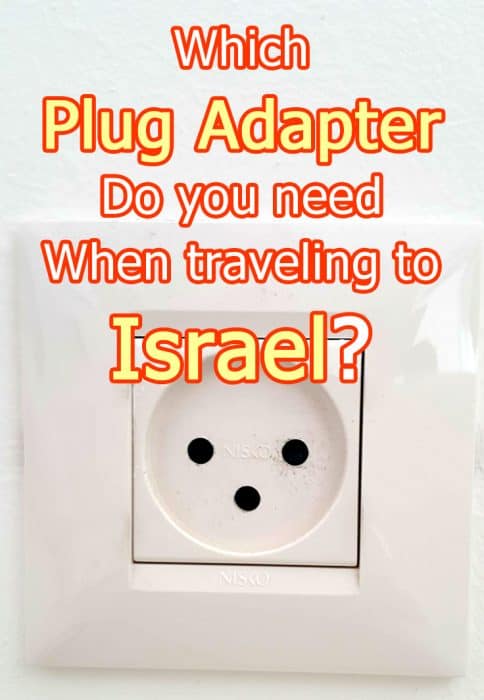
The short answer is:
Visiting from the US or Canada, you need a device that's both a plug adapter specifically made for Israel AND a voltage converter. Coming from Europe or other countries that have 220-230 voltage systems, you only need a simple plug converter.
Don't worry, it's really not that complicated and I'm going to help you out by providing links to the exact products you need to get from Amazon. In fact, in case you're in a rush, here they are.
If you come from a country with 110 voltage system (such as the USA), buy this model (Amazon link):
Voltage Converter & Adapter from 220V to 110V with 4 Smart USB Charging Ports :

It comes with several plug adapters, including one that will work in Israel.
If you come from a European country with a voltage span of 220-240, you only need a plug adapter like these (Amazon link):

If you have a few minutes and are looking to learn more, keep on reading.
Plug adapter vs. voltage converter - what are they and which do you need?
Adapters and converters are different things. You may need just the one or both - rolled into a single device.
What's a plug adapter?
The shape of electrical outlets or sockets varies across the globe. Strangely enough, in 2018, humanity still hasn't decided on a single type of socket. In fact, according to Wikipedia -
Electrical plugs and sockets differ from one another in voltage and current rating, shape, size, and connector type. Different systems of plugs and sockets have been standardized, and different standards are used in different parts of the world.
Which means travelers need to adapt to local settings. Using adapters, at the very least.
Adapters are simply a way to get electricity from an outlet with a different shape into your device. Nothing more.
If you're coming from the US, Canada, and most other countries, you would need an adapter just so that you can plug something into an Israeli outlet.
What plugs are used in Israel?
This is what outlets in Israel look like -

And these are the plugs that match them -
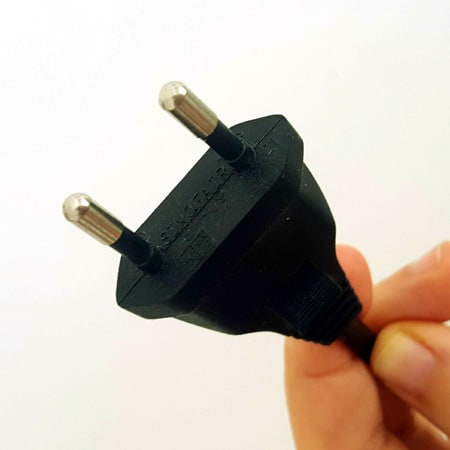
If your plugs look like this, you're set. This may be the case if you're from Italy or a few other European countries (though not most).
If your plugs look different, you need a way to make your plug fit into an Israeli socket. The adapter itself is a very simple (but don't buy it just yet if you're from Canada or the US!):
Here's a link to buy this on Amazon - if this is all you need .
But is that all you need? Hold your horses and let's talk about converters.
What's a Voltage Converter?
Voltage is generally defined as the difference in electric potential between two potential between two points. For our needs, it's essentially the tension or force of electric current coming out of the outlet.
Israel uses a 220v voltage system across the country. So do most European countries.
The US and Canada use a 110-120v system.
Some electric appliances are suited for use in both systems. Others will only work well in one in one of the systems.
If you have electric appliances that run only on 110-120 volts then a simple adapter won't be enough. An adapter only handles the shape of the plug - you need something that will convert the current as well.
And that's the voltage converter.
These are larger and heavier than simple plug adapters and they usually have several sockets, allowing you to use multiple appliances. You can find a variety of these in Amazon. Planned with travelers in mind, they offer a few plug adapters as well. The problem is finding one that's a good fit for Israel. This one is the only one I could find, offering both a converter and a plug adapter for Israel:
As you can see, it comes with five different plug adapters, so they have you covered pretty much anywhere around the globe.
What happens if you plug a 110v appliance into the Israeli 220v system without a converter?
If you plug in a US-bought appliance into an Israeli socket - using the simple adapter - you could end up damaging it.
It's worth noting that some appliances are actually already adapted for both 220v and 110v systems. Check yours to see if it is. If so, you can use a simple adapter and safely plug it into an Israeli socket.
However, if your electric thingie wasn't built to deal with 220volts - it will burn off. I don't mean literally go on fire - although that too is a real risk. Most likely, whatever engine it has will just heat up and stop working.
Tried and tested.
We bought a cat fountain on our last visit to the US. Brought it back home, filled it up and plugged it into the Israeli system. We should have known better - I blame jet lag! It seemed to be working ok but the following morning the pump was dead.
To avoid that, you simply must use a voltage converter as well as an adapter.
So, if you're asking yourself "Can I plug my iPhone into 220v and charge it in Israel?" the answer is -
Only if you use a converter.
And I'm mentioning iPhones here because people destroy their expensive Apple chargers for making the mistake of using a simple adapter without a converter. And here's another tip for you -
iPhone chargers are very expensive in Israel. Plus, the one you'll buy here won't work well with the American system once you get back home. Keep your iPhone charger safe and use a good converter when visiting Israel.
What happens if you plug a 220v appliance into the American 110v system without a converter?
Ahh, I can tell you the answer to that one from experience as well.
Whatever you're using, will work - but much less effectively. That's actually the case whether or not you use a converter. These appliances need 220v and they won't be getting them from the American system.
If you plug in an "Israeli" electric kettle into an American outlet, it's going to take ages to boil water. If you try the same with a hair dryer, you'll get a measly blow of warm air coming out. It's like an astronaut walking on the moon - everything just becomes lighter and weaker.
Only in Israel?
Here's the thing.
The plug shape is pretty much an Israeli thing. As far as I know, only Italy and Russia use a similar socket/plug shape.
As for current - most countries in the world use the 220-230v system. Canada and the US are the exceptions - using 110v.
So, when you invest in buying a quality adapter-and-converter-in-one, it will serve you during your trips across the globe. A worthwhile investment for sure!
Spain has the same plug as Israel. Iphones only need adapters in Israel.
Thanks for the additional info, Donna!
Hi Anne If I buy an electric kettle in the States What kind of adapter or convertor son need for Israel?
Hi ANNE Can you confirm that this recommendation you are making will work. You say 220 V but everything I read is telling me Israel is 230?
It’s still 220V. You can ask any Israeli and they’ll tell you it’s 220V. I found this article by the Weizmann Institute explaining electric power in Israel and they also say 220V (you’ll need ot use Google Translate to read it in English).
However, I could find a couple of references saying 230 volts which made me wonder, so I kept on digging and found this article . To save you going through Google Translate, this is what they’re saying – The European code is 230 volt and Israel has committed to switching over to that. The transition is ongoing and it’s taking longer than expected. Right now, you can find both 230V and 220V outlets in Israel. According to this article, electric appliances are flexible, and most can take a range of voltage. So, anything that works at 220V will work with 230V as well, and vice versa.
So, all in all, I’m pretty sure that the adapter mentioned in this article will work well in Israel. I hope this helps!
Italian plugs have three pins in a row, so they won’t fit in an Israeli socket. Most mobile phone chargers these days are dual voltage. You should be able to determine this from the (very) small print on the charger – it will say something like “Input 100 – 240V, 50 – 60 Hz.”
Most Israeli sockets also have room for three pins. We’ve traveled to Italy twice and had no problem using our Israeli plugins. I don’t think there should be a problem for this to work the other way around.
So just confirming: when I use USA appliances in Israel the converter I need is a Step Down one, right?
Hi Paula, Yes, that’s correct. The Step Down one will do the job. Enjoy your trip!
Will my hair straightener work in Isreal with just an adapter? 100v-240v 50/60 hrz.
Hi Joanne, It seems like it would but I’m not 100% sure. I would contact the manufacturer to ask, just to make sure.
Coming from US and will need product mostly just for cell phone, iPad, hair dryer and flat iron. What do you recommend getting? Thank you!
Hi Lyndsi, Since you’ll be bringing a hairdryer and an iron, you should get both the plug adapter and a converter, so the first product mentioned in the post is what you should be getting (or one like it). Enjoy your visit!
I have a blender and it’s 200 watts 120v do I need a specific adapter or converter because of the watt?
Hi Avichai, Different appliances have different wattage and that’s ok. The important thing is whether you’re on 120V or 110v. Your blender should do just fine in Israel.
BENY HAGERLING THANKS MIKE GREAT INFORMATION. I’LL BE LEAVING IN ACOUPLE OF DAYS NO TIME FOR GETTING ADAPTER/ CONVERTER, DO MAJOR HOTELS PROVIDE FOR THEIR GUESTS?
Hi Beny, I’m not sure hotels would have enough of them to go around but you can always ask. Worst case scenario, they’ll refer you to a nearby store where you can get an adapter. Good luck and enjoy your trip!
Thank you so very much for providing this information. So, if I understand correctly, I will plug a converter to the wall in Israel, and then plug the adapter to the converter, and then plug the appliances to the adapter? Please let me know if I understood correctly. Thank you.
Hi Miriam, yes, that could be one set up. If you buy a converter-and-adapter-in-one type of unit, you’ll just need to adjust the unit to use the correct plug (they usually come with several options).
I’m glad I found this info, very helpful!!! Can’t wait for my Israel trip soon!
What is the best converter/adapter for a hair dryer?
Hi Missy, I think what you need is this one (the same one recommended in the post).
Where is the picture of the converter and adapter ….thats a single unit and where to buy it ?
Hi Mike, It’s the last image in this post. Here’s the direct link to the produce on Amazon again .
Leave a Reply Cancel Reply
Your email address will not be published. Required fields are marked *
Name *
Email *
Add Comment *
Post Comment

IMAGES
COMMENTS
Urgent medical advice should be sought after any animal bite, scratch or lick to broken skin, or bat bite, even after receiving pre-travel rabies vaccine. Tetanus : spread through contamination of cuts, burns and wounds with tetanus spores. Spores are found in soil worldwide. A total of 5 doses of tetanus vaccine are recommended for life in the UK.
The short answer to this question is yes. While many governments worldwide have recommended only essential travel to Israel, it is possible and feasible to fly to Israel. In fact, tourists continue traveling to Israel every day. There are a range of airlines operating flights in and out of the country, and hotels are available for your stay.
Guyana. Paraguay. Peru. Suriname. Uruguay. Venezuela Margarita Island. back to top. List of country information found in fitfortravel, information is split by continent and there is a text search to help you locate the country information.
During these challenging times, we in Israel stand together with you, the American people, offering our prayers and support, united in the hope for a brighter, better tomorrow. ISRAEL TRAVEL ALERTS & SAFETY INFORMATION In order to remain fully informed, below is the updated information about the ongoing situation in Israel with regard to the […]
fitfortravel is a public access website provided by the NHS (Scotland). It gives travel health information for people travelling abroad from the UK. Remember that you should always discuss your particular needs with your own GP or Practice Nurse. The website is compiled by the Travel and International Health Team at Health Protection Scotland (HPS).
Type C Plugs in Israel. The Type C plug (also called the Europlug) has two round pins. The pins are 4 to 4.8 mm wide with centers that are spaced 19 mm apart; the plug fits any socket that conforms to these dimensions. Type C is the most widely used plug internationally. commonly used in Europe, South America & Asia.
Finally, if you don't meet the above criteria, you can submit a petition to the Exceptions Committee with the details of your reason for travel. Step 1. Pre-departure PCR test. In addition to being either fully vaccinated or recovered from COVID-19, there are some additional requirements before entering Israel.
Copies of important documents: Both digital and physical for safety. Data Plan: A travel eSIM card for your smartphone to stay connected.; Lightweight Tops and T-Shirts: Pack a variety of lightweight, breathable tops and t-shirts in cotton or linen fabrics to stay cool and comfortable. Shorts and Skirts: Include a few pairs of shorts and skirts that are comfortable and appropriate for the warm ...
Planning a trip to Israel is just the start of an unforgettable visit to the Holy Land. This tiny country is one of the world's most exciting and diverse destinations. Before you go, you'll want to take a run-through of some useful resources and reminders, especially if you are a first-time traveler to Israel and the Middle East.
Israel Travel Guide & Packing Tips . The Best Time to Visit Israel. Very specifically, the best time to visit Israel is during the month of May — after religious pilgrimages in April, and before summer tourists arrive. May in Israel offers near perfect weather and scenery, minimal tourists swarming popular attractions, and low prices for ...
Entry requirements. This travel advice covers Israel and the Occupied Palestinian Territories (OPTs). This information is for people travelling on a full 'British citizen' passport from the UK ...
Out of an abundance of caution over the new Omicron variant of the COVID-19 virus, as of November 28th, 2021, Israel has closed its borders to all tourists until December 13th, 2021. Only citizens of Israel and specific visa holders are allowed entry to Israel. If you had a trip scheduled during that time, even if you or your group had been ...
Israel Revealed Customized travel. Authentic experiences. Inspiring discoveries. Connect to the land, people and culture of Israel. TRAVEX creates exciting tailored journeys that capture the energy and spirit of Israel. Using our diverse expertise, we craft bespoke experiences that engage and inspire, exceeding all expectations. Exploring Israel is the trip of a lifetime. A fascinating […]
Penalties are severe. You must always carry originals or copies of your passport, visa or entry permit in the Occupied Palestinian Territories. Palestinian law has the death penalty for some crimes including treason, helping an enemy and murder. Gaza has Islamic law. Drinking alcohol and homosexual acts are illegal.
Rapid Antigen Covid Tests: Also known as lateral flow tests, this test provides results within 15 minutes. Rapid Antigen Test in Tel Aviv - The rapid test is available in our central test center in Tel Aviv from Sunday to Thursday. Results will be ready within 15 minutes and will be sent in English by email. The cost starts from $39 per person.
6. Toiletry basics. It's always good to stay clean during travel. Make sure to pack a toiletry bag with a toothbrush, toothpaste, floss, your favorite shampoo, conditioner and body soap, and a hairbrush. I always like using a head case for my toothbrush because it's much easier to clean after my trip.
Halva - a sesame-based Arab dessert made with tahini paste, you can find it at any major outdoor market. You should tip in restaurants. Tipping isn't as generous as in the US, but 10-15% is a typical amount to tip in restaurants in Israel. Cash tips are preferred when you visit Israel.
An ordinary 10-day trip through Israel, excluding flights, typically falls within the range of $2,500-$3,000. For a more luxurious experience, the cost can rise to somewhere around $900 per person, per day. The overall expense of a tour is influenced by factors such as the tour operator and the exact number of days.
2 weeks in Israel; Itinerary Summary. 1 Day: Arrival in Tel Aviv. 2 Day: Sightseeing Tel Aviv. 3 Day: Sightseeing Tel Aviv. 4 Day: Travel to Haifa, visiting Caesarea, Zichron Ya'akov & Ein Hod along the way. 5 Day: Day trip from Haifa to Acco. 6 Day: Travel to Sea of Galilee, visit the Ba'hai gardens in the morning.
Avanti Destinations announced it has started offering custom FIT travel to Israel with six new itineraries, 20 hotels, and more than 30 private and shared experiences and sightseeing tours. ... For additional information on booking unique experiences and custom-built, multi-destination FIT travel 365 days a year to the Middle East, North Africa ...
Avanti Destinations has started offering custom FIT travel to Israel with six new itineraries, 20 hotels and more than 30 private and shared experiences and sightseeing tours.The company has also ...
11. Long Skirt. As Israel is one of the world's most significant religious centers, women should be sure to pack a long skirt or dress which will be essential when visiting holy or religious sites. In religious neighborhoods throughout the country, particularly in Jerusalem, modesty is key.
fitfortravel is a public access website provided by the NHS (Scotland). It gives travel health information for people travelling abroad from the UK. Remember that you should always discuss your particular needs with your own GP or Practice Nurse. The website is compiled by the Travel and International Health Team at Health Protection Scotland (HPS).
You can find a variety of these in Amazon. Planned with travelers in mind, they offer a few plug adapters as well. The problem is finding one that's a good fit for Israel. This one is the only one I could find, offering both a converter and a plug adapter for Israel: Voltage Converter & Adapter from 220V to 110V with 4 Smart USB Charging Ports :